
Best Tips on How to Title an Essay

How to Make a Good Title for an Essay
The success of an essay heavily depends on its title. This may not come as a surprise given that the essay title is the first aspect to provide the reader with a sneak peek into the text. It piques our interest to read the paper in the first place and gives us a preview of what to expect from the author.
Our research paper writing help prepared a thorough guide on how to title an essay. Here you may find tips and tricks for developing an effective APA or MLA essay title. So, let's dive straight into the article for more exciting details!
Essay Title Format
During your essay writing process, ensure you know the stylistic requirements before beginning an essay. Knowing the format you need to employ is crucial because different style manuals may have varying requirements. Mostly, you could have used an APA or MLA essay title format. Our service, where you can buy essay online , explains these two in more detail below.
Essay Title MLA
If you're required to create an essay title MLA format, check whether your instructor wants you to make a separate cover page. If not, put a heading at the beginning of your work that includes your name, the name of your professor, the course ID, and, lastly, the date.
On the other hand, if you must present a cover page for your essay title MLA, then you need to include the following:
- The name of the college
- The title of your paper
- The subtitle of your paper, if applicable
- Your first and last name
- Your teacher or professor's name
- The class name or course number
- The date the paper is due
The formatting instructions are as follows:
- Double-spaced
- Times New Roman font
- Size 12 font
- Apart from very short terms, each word's initial letter should be capitalized. The initial word, however, must always be uppercase.
- The title page shouldn't include a header with the page numbers.
Essay Title APA
Having discussed the MLA format essay title, let's explore what the APA student title page includes:
- The paper title
- Author names
- Institutional affiliation where the author carried out the study
- Name and number of the course
- Professor name
- Page number
The title of an essay format instructions:
- double-spaced
- 1" margins
- 12-point Times New Roman
- According to APA, your title should be targeted and brief, without unnecessary words or abbreviations
How to Choose a Good Title for an Essay: Important Qualities
Nobody will read a dull headline. Your title should grab your audience's attention and encourage them to read the rest of the work. As it is one of the initial things readers see, having a strong attention grabber is essential when writing an essay from scratch. To fully understand how to come up with a title for essay that is strong and exciting, let's consider a few following factors:
Employ a Catchy Hook - Usually, the title of essay format follows a similar basic structure, especially if they are used for an academic article. The hook serves as a unique component that attracts the reader. It's a captivating statement informing others about the topic of the essay. You can also explore several types of sentences with examples that can help you develop the ideal hook structure.
Consider Topic Keywords - These are essential terms or expressions pertinent to your subject and help your reader understand the focus and body of your article. These focus keywords should serve as a brief, one- to two-word article summary. You can choose some terms from the research topic your instructor gave you, but after your thesis statement is formed, this is where you should hunt for ideas.
Use a Colon - A colon is frequently used in academic titles to separate concepts and sentences. The standard procedure is to place a clever remark or brief quotation before the colon. Although these beginning words offer flavor, they can be overdone. Because of this, some individuals find using the colon to be repugnant. Therefore be careful not to misuse this method.
Ask a Question - To write essay title that is strong, consider asking a question. But, use it with caution because posing a question will make your tone less formal. As long as the question is suitably phrased to meet the subject of your essay, feel free to employ it. Always check to see if the title question still applies to your points in the essay's body. The thesis statement should be appropriately reflected as well.
Find Inspirational Quotes - There is no formula for selecting essay titles from the textual content. You may get playful and choose any quotation, proverb, or catchphrase that applies to your particular publication and works as a title. You may also create a great essay title using well-known expressions or idioms. Doing so will help your readers relate to and feel more comfortable discussing your subject.

Here are other rules for how to create a good title:
- Title every section of writing: In the process of writing, create interesting subheadings to give your paragraphs an identity. Also, they make your text look ordered and clear.
- The title must bear the theme of the text: choose a title that summarizes the essay.
- Capitalize all words with certain exceptions: Capitalize the first letter of every word in the title, but do not capitalize pronouns, articles, prepositions, and conjunctions.
- Avoid underlining the title: Since topics come in boldface, underlining it will amount to overemphasis. Some authorities say that if you must underline it, do not bolden it.
- Review the final version of the title: Do not forget to do a quick review of the final version of the title—check for grammar, structure, spelling and so on. Re-read it to determine if the title has given justice to the essay. Confirm if the topic is catchy enough to attract your reader’s attention.
- When using a colon in your title, follow the rules: Since we are dealing with punctuation rules here, let us talk about the colon – when you have two eye-catching topics, separate them with a colon.
Student’s Guide on How to Come Up with a Title for an Essay
Titling an essay can be easy, but there are a few core principles to be taken into account. The following tips will help you stay on track and avoid any common pitfalls.
Essay Goes First
Never start with a title! If you write it before the rest of the text, it will be based on it, and it should be vice versa. Writing an essay before choosing a heading will give you a clear understanding of what should make sense to the reader. Re-read the finished paper several times to decide on the title. The last thing to create is a title - such strategy will give more time to spend on crafting an essay outline, conducting research, or writing the paper itself.

What are you writing about? What is the style of your paper, and is it an academic essay or a free-form essay like a narrative essay? If the topic of your essay is “Do people who commit heinous crimes deserve the death penalty?” your title should not be humorous; it should be strict and to the point.
If your topic is “Why do people like watching funny cat videos?”, feel free to craft a funny title. Determine the tone of your essay and base your title on it—in consideration with the essay’s topic.
The tone can be:
- Serious - “The implications of global warming”
- Funny - “How cats and dogs love their masters”
- Amiable - “Ways to fight depression”
- Persuasive - “Why positive thinking is a must have skill for every person”
- Informative - “Ten rules for creating a chemical at home”
The main goal of a title is to name its paper. There is no need to tell an entire story in the title, or provide any useless details. Sum up your paper in a few words! Another way to do this is to sum up your thesis statement, as it represents the main idea of your essay. Take your thesis and squeeze it into 3-4 words. Imagine that you are creating a title for your favourite newspaper or a slogan for Coca-Cola.
Don’t use fancy words! Take 2-3 main words (keywords), put them together, and stop wasting your time. Avoid jargon and abbreviations.
Search engine optimization (SEO) is something that can help any student and young writer reap benefits. While working on a title, detect the words related to the central idea of the paper. Type the words into the search field of Google and add the word “quote.” A search engine will show numerous web pages with in-text quotations that could be useful. Select the fragment you like. It is possible to learn how to make a creative title for an essay in this way.
Discover several more tips from experts:
- Never forget the “What,” “Who,” “When,” “How,” “Why,” and “Where” questions (if you start with one of these questions, your title has a chance of getting noticed);
- Come up with an unexpected image not related to the selected topic;
- Sometimes, starting with a lie increases the chances of a title being able to catch an eye;
- Review our catchy essay title examples.
Need Some Help With Your Essay's Title?
Feel free to contact EssayPro and we will provide you with a writing help at a moment’s notice. With the years of essay writing experience, titling becomes second nature, so you no longer need to worry about having a catchy headline on your paper.
Essay Title Examples: Bad vs Good
The strongest essay titles condense lengthy essays into concise statements. When wondering how to make an essay title, think carefully about your stylistic choices and essay format to produce an excellent one. Our dissertation help has provided essay title examples to let you understand the difference between good and bad ones more vividly.

Bad Essay Title Examples
As we discussed how to create an essay title and the specific elements that go into it, you should have a clear idea of how important it is to craft a strong title. In contrast, first, look at weak essay title ideas that can break your paper. This should serve as an example of why your heading should not be like this:
Ex 1: ' How Television Has Changed Our World ' - too vast and not informative
Ex 2: 'The Ara Pacis Augustae' - unclear for those who don't know Latin
Ex 3: 'The Most Poisonous Frog' - does not provide any insight
Ex 4: 'A Brief History of Subcultures and How They Manifest Themselves in a Constantly Changing Socio-Economic Environment' - too long and complicated
Ex 5: 'The Little Mermaid 29 Years Later: Selling a Harmful Sexist Message Through a Naughty Image' - inappropriate language
Good Essay Title Examples
Now that you know what a bad essay title looks like, let's explore good essay title examples as their substitutes. Examine the following essay title format styles that will give you a clear understanding.
Ex 1: ' The Electronic Babysitter: A Social History of Uses of the Television' - gives an exact description of what the essay will be about
Ex 2: ' The Modern Historical Significance of the Ara Pacis Augustae to the City of Rome' - here, the reader can understand what they will be reading about
Ex 3: ' A Deadly Beauty: The Evolution of Skin Coloration and Toxicity of the Poisonous Dart Frog' - clear, informative, and on-point.
Ex 4: 'Reconsidering Counterculture in Contemporary Society' - informative enough and brief
Ex 5: 'The Projection of Gender Stereotypes in The Little Mermaid' - employs appropriate language
Catchy Essay Title Ideas
You now understand that long, complicated headlines do not accurately convey the paper's main idea. Take ample time to consider the word choice before tilting your work. How do you create good essay titles? Think creatively and with common sense. But meanwhile, for your convenience, we compiled title ideas for essays you may use as inspiration.
Persuasive Essay Titles
- Why Receiving College Education is Important: Examining Long-term Benefits
- Face-to-Face Courses Cannot Be Replaced by Online Learning
- An MBA Does Not Ensure Corporate Success.
- Every Company Should Adopt a Green Strategy.
- Energy Drinks Represent a Lucrative Market Segment.
- Aircraft, Excess Weight Charges, Need to be Prohibited.
- Patients' Life Shouldn't be Put to Death by Nurses.
- Google Glasses May Increase the Number of Auto Accidents.
- All of the Conventional Malls Will Soon be Replaced By Online Shopping
- How Do Team-building Exercises Contribute to the Development of Inventions?
- Illegal immigrants are entitled to remain in the US.
Academic Essay Titles
- Several English Dialects: The Link Between Various Cultures
- Instagram: A social media innovation
- Is it possible to reverse drug-induced brain damage, and if so, how?
- What the Future Holds for Humans in the Light of Artificial Intelligence
- The Story of Two Nations after Decades of Conflict: North and South Korea
- Video Games and Their Learning Context in Schools
- Free Wi-Fi: Strategies for Enhancing the City's Economy
Strong Research Paper Titles
- Digital World Cybersecurity
- E-business to Provide New Paths for Booksellers
- Outsourcing for Large Businesses
- Preparing for College Costs for High School Students
- What News Reporters Should Do in the Digital Age and How to Do It: Examples
- The Transformative Power of Music: How Heavy Metal Impacted My Life
Best Essay Titles for College Students
- The Possible Benefits and Risks of Artificial Intelligence for Humans
- The Potential for Time Travel in Virtual Reality
- What Role Has Mathematics Played in Human History?
- How to Succeed in the Real Estate Industry
- E-Commerce: An Empire of Virtual Businesses Worth Millions of Dollars
- How to Achieve Financial Independence in the Digital Age Without Opening a Real Business
More Creative Titles for Essays
- When getting rewarded for their grades, would kids do better left alone?
- How Does Fake News Impact the Mainstream press?
- Homelessness in Contemporary Society: A Dilemma
- What News Reporters' Best Job Is in the Digital Age and How to Uphold It
- Elon Musk: Brilliant Mind or Insane Person?
- Positives and Negatives of Employing a Smoker
- Do We Employ the Appropriate Student Success Metrics?
Professional Academic Help
Now that you know how to make a good title for an essay, you should also understand that you should approach the task as a process. While composing your essay title, you must condense your whole thesis and point of discussion into a single, concise, yet powerful sentence. If you have time before your deadline, give it some thought and don't hurry.
Don't forget that you can always rely on our professional academic assistance, whether you need a reflection paper , ideas for a strong essay title, or any other academic papers. Consider the following words - write my essay for me - magic keywords for delegating your most complex tasks to our skilled writers!
Is the Volume of Schoolwork Getting Out of Hand?
Find an essay for sale online and handle your tasks without stress. You may always count on our experienced writers for help with any endeavor!
How To Title An Essay?
How to title an essay in mla format, what are some good titles for an essay.

Daniel Parker
is a seasoned educational writer focusing on scholarship guidance, research papers, and various forms of academic essays including reflective and narrative essays. His expertise also extends to detailed case studies. A scholar with a background in English Literature and Education, Daniel’s work on EssayPro blog aims to support students in achieving academic excellence and securing scholarships. His hobbies include reading classic literature and participating in academic forums.

is an expert in nursing and healthcare, with a strong background in history, law, and literature. Holding advanced degrees in nursing and public health, his analytical approach and comprehensive knowledge help students navigate complex topics. On EssayPro blog, Adam provides insightful articles on everything from historical analysis to the intricacies of healthcare policies. In his downtime, he enjoys historical documentaries and volunteering at local clinics.
Related Articles
%20(3).webp)
- Twin Cities
- Other Locations

- Hours & locations
- by appointment in Nicholson
- Zoom appointments
- How does it work?
- Frequently asked questions
- Tech troubleshooting
- Important policies
- Especially for multilingual writers
- Especially for graduate writers
- Writing process
- Common writing projects
- Punctuation
- Documenting sources
- Consultant bios
- Resources for instructors
- Why participate?
- How to apply
- Participant history
- E-12 Writing Centers Collective
- Job opportunities
schedule, manage, and access your SWS visits
Email [email protected] for questions about Student Writing Support
Phone 612-625-1893
center for writing | student writing support | writing process | writing an effective title
Writing an effective title
Writers often omit or underuse the helpful tool that is an essay title. Feeling stuck, writers may give up on generating a title, or merely label their essays by assignment sequence (“Paper #2”) or task (“Rogerian Argument”). An absent or non-specific title is a missed opportunity: titles help writers prepare readers to understand and believe the paper that is to follow.
Remember the functions of a title.
As composition and rhetoric scholars Maxine Hairston and Michael Keene explain,
a good title does several things: First, it predicts content. Second, it catches the reader’s interest. Third, it reflects the tone or slant of the piece of writing. Fourth, it contains keywords that will make it easy to access by a computer search. (73)
Keeping these functions in mind will help a writer choose a specific and meaningful title, not a mere label.
Think of title-writing as a process, and allow yourself to stretch your thinking during that process.
Like any piece of writing, an effective title does not appear in one magic moment; it takes brainstorming and revising. Richard Leahy's “Twenty Titles for the Writer” exercise helps writers slow down and engage in the process of title-writing.
Although it can feel painstaking and a little silly, actually doing all the steps of Leahy’s exercise takes your thinking in new directions, and almost always guarantees an interesting and effective title. (Of course, how you use the exercise is up to you.) “Twenty Titles for the Writer” is below.
Twenty Titles for the Writer
1. Copy out of your draft a sentence that could serve as a title.
2. Write a sentence that's not in the draft to use as a title.
3. Write a title that is a question beginning with What, Who, When, or Where.
4. Write a title that is a question beginning with How or Why.
5. Write a title that is a question beginning with Is/Are, Do/Does, or Will.
6. Pick out of the essay some concrete image—something the reader can hear, see, taste, smell, or feel—to use as a title.
7. Pick another concrete image out of the essay. Look for an image that is a bit unusual or surprising.
8. Write a title beginning with an -ing verb (like “Creating a Good Title”).
9. Write a title beginning with On (like “On the Titles of Essays”).
10. Write a title that is a lie about the essay. (You probably won't use this one, but it might stimulate your thinking.)
11. Write a one-word title—the most obvious one possible.
12. Write a less obvious one-word title.
13. Write a two-word title.
14. Write a three-word title.
15. Write a four-word title.
16. Write a five-word title.
17. Think of a familiar saying, or the title of a book, song, or movie, that might fit your essay.
18. Take the title you just wrote and twist it by changing a word or creating a pun on it.
19. Do the same with another saying or title of a book, song, or movie.
20. Find two titles you've written so far that you might use together in a double title. Join them together with a colon [ : ].
Hairston, Maxine, and Michael Keene. Successful Writing . 5th ed. New York: Norton, 2003.
Title exercise adapted from Richard Leahy's “ Twenty Titles for the Writer .” College Composition and Communication 43.4 (1992): 516–519. JSTOR. University Libraries, U of Minnesota. 19 July 2007 <http://www.jstor.org>.
- Address: 15 Nicholson Hall , 216 Pillsbury Dr SE , Minneapolis, MN 55455 | Phone: 612.625.1893
- Address: 9 Appleby Hall , 128 Pleasant St SE , Minneapolis, MN 55455
- © 2011 Regents of the University of Minnesota. All rights reserved.
- The University of Minnesota is an equal opportunity educator and employer
- Last modified on October 25, 2023
- Twin Cities Campus:
- Parking & Transportation
- Maps & Directions
- Directories
- Contact U of M
Essay Title: Rules, Tips, Mistakes to Avoid
Table of contents
- 1 What Makes a Good Title?
- 2.1 Use your essay to develop your topic
- 2.2 Identify keywords and take advantage of them
- 2.3 Use Multiple Titles
- 3.1 MLA Format
- 3.2 APA Format
- 3.3 Chicago Format
- 4 What to Avoid When Writing a Title for an Essay?
- 5 Take into account Your Paper Style
- 6 Types Of Papers and the Best Titles For Them
- 7.1 Questions make Catchy
- 7.2 Describe the Paper in 5 Words
- 7.3 Use One Direct Word
- 7.4 Extract a Sentence from the Paper
- 7.5 Take advantage of Pop-Culture
- 7.6 Put “On” at the beginning
- 7.7 Start with a Verb in “-ing”
- 7.8 Give a Mental Visualization of Your Topic
- 7.9 Modify a Title that was Rejected
- 7.10 Choose 2 Variants That Were Considered and Declined; Then Join Them Together
- 8.1 Why is an essay title important?
- 8.2 Can a title be a question?
- 8.3 How long should the title be?
Good paper titles could be the difference between the audience viewing or ignoring your essays. When chosen carefully, essay titles could well capture the attention of someone who would not typically read the topic. Learning the proper method for titling an article can work wonders in creating an attention-grabbing heading. A well-titled article will also tell readers what to expect. Knowing how to create a topic for an essay that commands the reader’s attention is important. That is why this piece is designed to help you write just that.
What Makes a Good Title?
The importance of a great title cannot be overemphasized in the essay-writing process . And that is where you question yourself – what makes good essay headlines?
- A good title for an essay must be memorable. You want to think up something that stands out as much as possible to capture the audience’s eyes and minds. Remember – your title is the first thing your reader sees.
- Your essay name must possess a near-perfect degree of accuracy. Titling an essay like a clickbait heading could have the viewer on strings at the beginning, but they may not be disposed towards reading it to the end. Even so, it might not leave them with the desired impression.
- A good essay title has to be written in a language the target audience would understand easily. You might want to keep the language of your essay headline simple, but it should reflect as much expertise as the target audience would reasonably expect.
- A proper heading for an essay must be easy to read. The main idea is that your title gives a brief insight into what the audience should expect. Keep it concise and eye-catching, and ensure it is in active voice.
How to Title an Essay?
Having understood the importance of creative essay titles, you also know what features they are supposed to contain. The next item on the agenda is for you to know how to make a title for a write-up. This is not an arbitrary undertaking. It is a multi-step ritual that helps you ensure you are on the right track to connect with your audience using a catchy essay title.
Use your essay to develop your topic
This may seem rather confusing, but it is a very efficient step to follow while coming up with great naming ideas. You should start writing your essay once you have a subject matter identified. By the time you finish writing your essay, you can use the write-up details to construct the most suitable title. It would also give you much more clarity on the subject matter and what the audience wants from it since you would have conducted more research on the issue. As such, your title can be more precise and connected to the paper.
Identify keywords and take advantage of them
Your essay’s title must scream “This is what you want” to the reader. And no matter how fun and memorable it may be, it might not be as successful if it does not capture what the audience is exactly looking for. This is where keywords will work for you. They are terms that would let readers know that your essay is relevant to what is in question.
For instance, imagine trying to research articles on symptoms of pregnancy – but the name you see has nothing like “symptoms” or “pregnancy” in them. They might be catchy essay headers and even end up being related to the search, but they don’t exactly strike you like that is what you seek. You don’t need to stuff your title with key phrases. Just two or three core ones will do the trick.
Use Multiple Titles
Nobody said you have to use just one main topic. Segmenting your paper and sub-titling each makes your essay much more readable.

Essay Title Formats and Punctuations
It is perfectly fine if you would rather freestyle your essay heading. After all, a little creative license never hurts as long as you craft a good essay title. Though, you might want to play it safer by defining parameters, especially if your essay is formal. In that case, you should opt for an essay title format. These are internationally recognized sets of prescribed guidelines for titling your papers. There are three main essay title styles – the MLA, the APA, and the Chicago.
The rules of MLA style emphasize that your essay topics should be centralized on the page. Perhaps the most important rule of this style is that the title must be written in “title case”. This means every word should begin using capital letters except prepositions, coordinating conjunctions, “to” when it is alongside a verb in its infinitive form, and articles. However, the first and last words must have capital letters, no matter what they are. This style also discourages italicizing, underlining, or placing the topics in quotation marks.
This formatting APA style is particular about the brevity of the title, stipulating a maximum of 12 words. It emphasizes a short and straight-to-the-point without abbreviations or redundancies. A title in this style aims to share as much information with the audience in as few words as possible. It does not encourage the use of figurative words because it is used in technical and professional writing. Thus, expect to see it deployed toward a research paper title and formal articles. It also supports centralizing the title toward the top of the page.
Chicago Format
Like the other two formats, this style is particular about having the title in the title case. However, it gives more leeway and license to the writer than the others. In fact, the Chicago style prescribes no further guidelines beyond title casing.

What to Avoid When Writing a Title for an Essay?
Developing interesting titles for essays can be a challenge for some. Tips include avoiding negativity and offensive or controversial terms and keeping it professional. Even the cover page could be done properly thanks to a writing service like the APA title page generator, which can also help you write a good title for an essay.
Making a good start means staying positive. Even when the essay topics are dreary, attempt to write less negatively. Good headlines for essays also use appropriate language to attract more possible readers to the paper. Lastly, its image should remain neutral – don’t overshare.
Take into account Your Paper Style
The style of your essay is essential to your topic. Identify and study what kind of essay it is, e.g., an argumentative essay or narrative essay, and ensure that the essay topic reflects it. Essays have tones depending on their kind, the audience, and the subject matter. For instance, academic writing would likely assume a formal tone. Having identified the tone of your essays, you should ensure your essay topics don’t go off-key. It should complement the tone of the essay itself in order to have the desired effect on the readers.
- Free unlimited checks
- All common file formats
- Accurate results
- Intuitive interface
Types Of Papers and the Best Titles For Them
There are several situations that could involve you writing an essay paper. And depending on the situation or the target of the piece, several kinds of papers exist as well. These may include a narrative paper, expository essay, business paper, and thesis statement in academic writing, among others. Some of the most creative examples of titles include:
Research Paper
The Role of COVID-19 in the Growth of Digital Services
Impacts of Climate Change on Developed Countries
Business Paper
Why Franchising Is the Way for New Small Business Owners
How Digital Services Can Influence the Global Supply Chain
College Essay
The Golden Rule of Wholesome Studentship
Finding Success in My Failures
Reflective Essay
The Time I Met My Mentor
My First Surgery
Personal Statement
My Nine Lives as an Immigrant Student
The Three Horsemen of Ambition
Literary Analysis
The Use of Symbolism in The Pulley
Thematic Preoccupations of Shakespeare’s Othello
Report Titles
Earlier Vaccinations Would Not Have Subsided the Coronavirus Pandemic
Students Want Mixed Dormitories in American Universities
Good Titles for Essays about Yourself
Why I Am the Way I Am
A Letter To the 7-Year-Old Me
Good Titles for Narrative Writing
The Day the World Stood Still
My Perfect Birthday Party
MLA Essay Title Format
The Old Man and the Sea: A Critical Analysis of Ernest Hemingway
Why You Can Do What You Do Without Knowing Who You Are
Argumentative Essay
Are Electric Cars the Solution To Carbon Emissions?
Should Reparations Be Paid To Marginalized Groups?
Compare and Contrast Essay
Left Wing Versus Right Wing: What Ideologies Do We Need?
Good Versus Bad: The Constant Clashes of Morality
Persuasive Essay
Why Dogs Make Better Pets Compared to Cats
Digital Banking: The Peak of Fintech
Scholarship Essay Titles Examples
What Can You Contribute to the Student Community?
Narrate a Defining Experience in Your Life
Nursing Essay
COVID-19 and the Growing Demand for Nursing Staff
Prioritizing Ethical Education in the Nursing Profession
Title The Government’s Role in Poverty Alleviation
Myths and Facts about Tuberculosis
10 Tips to Create an Exceptional Title
There are numerous ways in which a writer can craft a quality naming experience. Unless you use a title generator for an essay , titling an essay is as simple or as hard as the writer makes it. It is often necessary to edit the essay online multiple times. Finding their own style is dependent on the type of essay and the purpose of the writing. In the quest to title an essay, here are some tips for arriving at a really creative title.
Questions make Catchy
Titles Interesting headings for essays can be created by using a cause-and-effect approach. Start considering a common problem and think about what question does that paper answers. You can compose a title out of it.
Describe the Paper in 5 Words
If you were, to sum up the entire paper in 5 words, what words would be chosen? Not only does this unique creation bring some fun to the process, but it can also birth a catchy phrase – which translates to a highly effective title.
Use One Direct Word
Sometimes the best essay title ideas are simpler than we think. For some essay topics, one idiom could be all you need. Though it might not be easy how to come up with one, it may give your research paper an edge over others.
Extract a Sentence from the Paper
It’s usually a good solution to pick the heading after the text is drafted. At this point, there are many title options. Just pick one that sums up your concepts better than the others.
Take advantage of Pop-Culture
Don’t be shy to use something related to pop culture. Titles for papers may definitely contain references to songs, books, or movies as long as they fit the paper topic. This could be especially powerful for college essay titles and other essays for younger readers. You just need to ensure that the audience can recognize it easily.
Put “On” at the beginning
Depending on what you’re writing, this option might be a bit tricky. It works very well for books, songs, or movie reviews. Just name the object of your research paper or article. For example, “On The Importance of Being Earnest.”
Start with a Verb in “-ing”
Especially persuasive essay types can greatly benefit from titles for papers starting like this. Be sure to find a verb straightforward enough to grab the attention.
Give a Mental Visualization of Your Topic
This works wonders when the topic you write about is art-oriented. Even if the mental image brings something that is not seen by most people, it could go far for those that grab it.
Modify a Title that was Rejected
Using old, rejected essay topics to design new ones is usually possible. All it takes is a bit of creativity and a decent name.
Choose 2 Variants That Were Considered and Declined; Then Join Them Together
Although 2 separate entities did not work out, it does not mean that those phrases can’t work together for your new paper. So keep that list of paper titles!
Why is an essay title important?
Can a title be a question, how long should the title be, readers also enjoyed.

WHY WAIT? PLACE AN ORDER RIGHT NOW!
Just fill out the form, press the button, and have no worries!
We use cookies to give you the best experience possible. By continuing we’ll assume you board with our cookie policy.
Essay Writing Guide
How To Title An Essay
How to Title an Essay - A Detailed Guide
10 min read
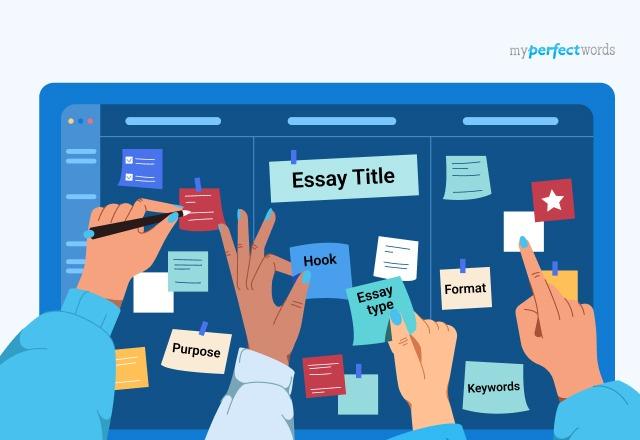
People also read
An Easy Guide to Writing an Essay
Learn How to Write An Essay in Simple Steps
A Complete 500 Word Essay Writing Guide
A Catalog of 500+ Essay Topics for Students
Explore Different Types of Essays, their Purpose, and Sub-types
Essay Format: A Basic Guide With Examples
Learn How to Create a Perfect Essay Outline
How to Start an Essay- A Step-by-Step Guide
A Complete Essay Introduction Writing Guide With Examples
Learn How to Write an Essay Hook, With Examples
The Ultimate Guide to Writing Powerful Thesis Statement
20+ Thesis Statement Examples for Different Types of Essays?
How to Write a Topic Sentence: Purpose, Tips & Examples
Learn How to Write a Conclusion in Simple Steps
Transition Words For Essays - The Ultimate List
4 Types of Sentences - Definition & Examples
Writing Conventions - Definition, Tips & Examples
Essay Writing Problems - 5 Most Paralyzing Problems
How to Make an Essay Longer: 14 Easy Ways
1000 Word Essay - A Simple Guide With Examples
A title is the first thing that your readers will interact with. So, it should be something interesting and worth paying attention to.
Coming up with an interesting title while writing an essay can be the most difficult and sometimes frustrating task. The best essay titles are those that are both creative and informative.
If you have no idea what are the most eye-catching ideas for an essay, this article will help you. Here, we will discuss the key elements for titling your essay and some example essay titles for your help.
So, let’s start with the blog!
- 1. Why is it Important to Have a Good Essay Title?
- 2. What are the Basic Components of an Essay Title?
- 3. How To Make A Good Title For An Essay?
- 4. Essay Titles in Different Formats
- 5. What are the Characteristics of a Good Essay Title?
- 6. Additional Rules To Create a Good Essay Title
- 7. Some Interesting Example Essay Titles
Why is it Important to Have a Good Essay Title?
A great essay title is very important, and it can make or break the overall quality of your essay.
The reason is pretty simple: the title you choose for your essay is the first thing that will decide if your readers will continue reading your paper or not.
That’s why the choice of words and how you create a title is very important. If you are thinking the content of your essay is what matters, then you are wrong. To get a good grade and impress your teacher, every part of the paper plays an important role.
Creating a title that convinces people to read your essay also allows you to showcase your knowledge and writing skills.

Paper Due? Why Suffer? That's our Job!
What are the Basic Components of an Essay Title?
There are different types of essays , and each essay has a specific structure that can be followed for writing a well-written paper. Creating an essay title has it is own method, too.
Below, you can find the main components of an essay title.
- The Catchy Hook: It introduces the topic in the most interesting and creative way.
- Topic Keywords: It is the ‘what’ question of your essay. This component of an essay title identifies the concept that you will discuss in your essay.
- Focus Keywords: It is the ‘when’ and ‘where’ question of your essay. It provides more information about the headline and makes it more professional.
How To Make A Good Title For An Essay?
There are a few principles that you should keep in mind when titling an essay.
Write Essay First, Title in the Last
One effective approach is to complete your entire essay first and then tackle the title last. This method allows you to gain a comprehensive understanding of what would resonate with your readers.
Utilize Your Thesis
Your thesis statement , typically found in your essay's introductory paragraph, can be a goldmine for title inspiration. Reworking it can lead to a compelling and relevant essay title.
Take into Account the Tone of Your Paper
Consider the tone of your essay, as it significantly influences the title's choice. For serious topics, maintain a serious and appropriate tone in your title.
Use Relevant Keywords
Incorporate two to three relevant keywords within your title. These keywords should reflect the core themes of your essay and help potential readers find your work.
Get Help from Online Tools
Exploring online title generator tools can provide valuable insights into crafting an effective essay title. These tools can spark creativity and suggest suitable phrases that resonate with your essay's content.
Essay Titles in Different Formats
When titling an essay in different formats, it's important to follow the specific guidelines and formatting requirements of the style guide you are using. Below, you can find the basic guidelines for titling an essay for different formats:
Essay Title APA Format
Let's see what an APA title should include:
- The title should be centered but not in bold or italics.
- Use title case for the title.
- Capitalize the first word of the title and any subtitles, as well as any major words within the title (e.g., The Psychology of Motivation: Understanding Human Behavior).
- Use a 12-point Times New Roman or Arial font.
The Impact of Climate Change on Global Biodiversity
Essay Title MLA Format
Here is what an MLA paper title should include:
- Title should be centered.
- Use title case, which means capitalizing the first and last words of the title and all major words in between (e.g., The Art of Writing: Crafting Engaging Essays).
- Do not underline, italicize, or use quotation marks for the title.
- It's common to use a 12-point Times New Roman font.
Exploring the Themes in Shakespeare's Sonnets: Love, Time, and Beauty
Essay Title Chicago Format
Chicago style offers two options for formatting titles: headline-style and sentence-style.
- Headline style: The title is in the title case and is centered. Major words are capitalized.
Example: The Decline of the Roman Empire: A Historical Analysis
- Sentence style: The title is in sentence case (only the first word and proper nouns are capitalized). It is also centered. Use a 12-point Times New Roman or similar font.
Example: The decline of the Roman Empire: a historical analysis
MLA Format for a Book or Film Title Within the Essay
So, how to write a book title in an essay? If your essay discusses a book or film title, you would follow MLA formatting for titles within the essay. Enclose the title in double quotation marks.
Example: "The Catcher in the Rye": A Study of Adolescent Alienation
AMA Format (American Medical Association)
- The title should be centered.
- Use title case, with the first letter of major words capitalized (e.g., The Role of Genetics in Disease Prevention).
- Do not use bold, italics, or quotation marks.
- Use a 12-point Times New Roman font.
Example: The Impact of Nutrition on Cardiovascular Health
What are the Characteristics of a Good Essay Title?
A good essay title serves as a preview of the essay's content and should be engaging and informative. Here are the characteristics of a good essay title:
- Clarity: The title should clearly convey the topic or subject matter of the essay. It should give the reader a sense of what to expect when they read the essay.
- Relevance: The title should be directly relevant to the content of the essay. It should not mislead the reader by promising something that the essay does not deliver.
- Conciseness: A good title is concise and to the point. It should be relatively short and avoid unnecessary words or phrases. Brevity is key.
- Engagement: An effective title should be attention-grabbing and stimulate readers' interest. It should make them want to read the essay. This can be achieved through the use of intriguing language, a question, or a thought-provoking statement.
- Originality: Aim for a title that is unique and original. Avoid clichés or overly generic titles that don't distinguish your essay from others on the same topic.
- Balance: A good title strikes a balance between being descriptive and not giving away the entire essay. It should provide a sense of the topic without revealing all the details.
- Appropriateness: Consider the context in which the essay will be read. The title should be appropriate for the intended audience and purpose of the essay.
- Grammar and Style: The title should adhere to the rules of grammar and style for the chosen writing format (e.g., title case, sentence case) and should not contain errors.
- Keywords: If relevant, include keywords or terms that are important to the subject matter. This can help with searchability and SEO if the essay is published online.
- Readability: Ensure that the title is easy to read and understand. Avoid overly complex or jargon-filled titles unless the audience is well-versed in the subject matter.
- Tone: The tone of the title should match the tone of the essay. For example, if the essay is serious and academic, the title should reflect that tone.
- Memorability: A memorable title is more likely to stick in the reader's mind. If it's clever, thought-provoking, or evocative, it can make a lasting impression.
Additional Rules To Create a Good Essay Title
Here are additional rules and tips for creating a good title, summarized and rewritten in simpler language:
- Title Each Section: Give every part of your writing a clear title. This helps organize your text and make it more understandable.
- Reflect the Theme: Make sure your title reflects the main idea of your essay. It should give readers a good idea of what your essay is about.
- Use Title Case: Capitalize the first letter of every word in your title, except for small words like pronouns (e.g., "it," "they"), articles (e.g., "a," "an," "the"), prepositions (e.g., "in," "on," "at"), and conjunctions (e.g., "and," "but"). These small words are not capitalized unless they are the first word in the title.
- Avoid Underlining: Don't underline your title. Bold text is usually sufficient to emphasize the title. Some experts suggest that if you really want to underline it, don't bold it at the same time to avoid overemphasis.
- Review and Edit: Always review the final version of your title. Check for grammar, structure, spelling, and overall quality. Re-read it to make sure it effectively represents your essay's topic and captures your reader's attention.
- Using a Colon: If you decide to use a colon in your title, remember to follow the rules. A colon is used to separate two interesting parts of the title.
- Simplify and Keep It Short: Rewrite your title in simple words and try to keep it short. Concise titles are often more effective.
Tough Essay Due? Hire Tough Writers!
Some Interesting Example Essay Titles
If you are struggling to come up with a good essay title, refer to the following section. Here, you will find some interesting title examples for different kinds of essays.
How to Title an Essay About Yourself - Examples
- Things that make you happy
- The significance of personal growth
- Your definition of feminism
- Why is volunteering important?
- The importance of a healthy lifestyle
- Your favorite memory
- Your proudest moment
- Your secret talent
- A place you’d want to go
- Your most unfortunate day
How to Title an Essay for College - Examples
- Poop, animals, and the environment
- From homeschooling to the football field
- The civil rights movement and its effects
- Internet Influence on Kids
- The popularity of Sports in the United States
- A book that sparks your love for literature
- The steps you took to fix an error in coding a program
- A serious illness you battled
- A talent you have had since you were young
- A documentary that made you aware of a particular issue
Example Argumentative Essay Titles
- Should animal testing be banned?
- Is healthcare a basic human right?
- Why does homework not improve learning?
- Should video games be considered a sport?
- Should teachers be paid more?
- Is standardized testing effective?
- Is space travel a waste of money?
- Effects of video games on children
- Is cloning ethical?
- Is globalization good or bad?

Example Research Paper Titles
- How does a search engine work?
- Attention deficit disorder
- Limitations of the media
- What are the gender issues in education?
- What are the pros and cons of school uniforms?
- Discrimination in education
- Education and funding
- Disadvantages of homeschooling
- How can eating disorders be treated?
- Interracial marriage
Example Descriptive Essay Titles
- The most beautiful place on earth
- The beauty of the starry sky
- A perfect companion for me
- The best concert I attended Why I like my smartphone
- An unusual room
- Your favorite food
- A favorite photograph
- An accident scene
- Your favorite car
Hopefully, now you understand how to title an essay in the best way possible. Refer to the above guidelines before you begin the writing process.
However, you can also get help from our essay writing company if you don’t know how to title an essay. Professional essay writers at MyPerfectWords.com can help you write a creative title or even the whole essay from scratch for you.
Feel free to contact our paper writer online anytime and get the best essay writing help.

Write Essay Within 60 Seconds!

Nova Allison is a Digital Content Strategist with over eight years of experience. Nova has also worked as a technical and scientific writer. She is majorly involved in developing and reviewing online content plans that engage and resonate with audiences. Nova has a passion for writing that engages and informs her readers.

Paper Due? Why Suffer? That’s our Job!
Keep reading

How to Title an Essay: Guide with Creative Examples [2024]
It’s not a secret that the reader notices an essay title first. No catchy hook or colorful examples attract more attention from a quick glance. Composing a creative title for your essay is essential if you strive to succeed, as it:
- causes the first impression;
- reflects the tone, topic, and the purpose of the writing;
- indicates the author’s credibility.
Thus, how you name your paper is of the same importance as the paper itself.
Good titles for essays should be concise and eye-catching. Nobody likes long and cumbersome headings that do not reflect the point of the paper. While tilting your work, pay enough attention to the word choice. How do you come up with a good title? Use your common sense and imagination. For more details, our experts prepared the sections below.
- 💭 What Are Good Titles?

✔️ Finish Your Essay
🤲 sum it up, 🏷️ define the keywords, 🖊️ follow the format, ⚖️ change words, ✨ 23 creative title examples, 💭 what are good titles for essays.
A title is a critical part of any academic paper, so you must understand what to include and how to choose it. Here are some features that your heading has to show.
👩🏫 How to Title an Essay?
Are you struggling with formulating a heading? Yes, this task is quite challenging. But let’s figure out the basic rules.
The title of any paper should reveal:
- What the paper is about. Cover the general idea of your work in the title.
- Why the reader might be interested in it. Prove the relevance of your paper to the audience.
- The context of the issue. A good title previews the full picture of the topic regarding its “when” and “where.”
To nail your essay heading, follow the guide below. Check our title examples if you are not sure about your abilities. You can also try and use a creative title page generator for a faster result.
Before writing a title to your essay, you should finish your paper. This way, you’ll be able to reread and get the whole idea to incorporate it into your title.
Moreover, you’ll see how long a title should be for an essay after finishing the entire piece. But remember: not too lengthy and not too wordy.
The essay title depends on the type of essay:
- Narrative essay . For this kind of essay, the title should not provide any detailed info or reflect your position. It should only present the general idea of your piece of writing. For example, the narrative essay topic may look like this: My Thorny Pass to Success.
- Argumentative essay . The title for an argumentative essay should clearly state the point you are going to support. For instance, you can choose the following heading: Social Media Has a Negative Effect on Teenagers.
- Cause and effect essay . For this kind of essay writing, the title should be clear and provide a background of the issue. The reader should immediately understand what the problem is, what its cause is, what an effect is. Usually, writers use the words “due to” or “because” to highlight the cause-effect correlation. Look at the example: Because Coronavirus Attacks, People Start to Explore New Ways of Remote Working.
- Persuasive essay . A persuasive essay should have a dynamic title that immediately calls to action. Moreover, the topic has to be relevant to the audience. For example, for students, the following title would be compelling: Sleep 7-8 Hours a Day: the Lack of Sleep Affects Academic Performance.
The most straightforward way of creating an essay title is summarizing. Sum up the whole paper in one sentence, focus on the central idea, cut the details, and use it as the title.
For this purpose, you can take your thesis statement and restate it, adding creativity. Or use the best summary generator you can find to simplify the task. But don’t forget to make sure that it sounds catchy and explains why the potential reader should check your essay.
For example:
Let’s imagine, you are writing about Artificial Intelligence, and your thesis statement sounds like this:
The purpose of this paper is to explore the advantages of Artificial intelligence’s influence on society and to discover possible outcomes.
Then, the title may be the following:
Artificial Intelligence – the Next Step into the Bright Future.
Every essay includes the key concepts that you explored and the terms that you used for this. You should find essential words and phrases and incorporate them into the essay titles. The keywords will focus the reader’s attention on the central topic of your paper.
You are writing about the negative impact of deforestation on the environment. These are your keywords, as they are the most vital ones. Thus, the title would sound like this:
Protecting the Environment: Deforestation Should be Stopped.
Every educational institution requires to format the academic papers for a particular writing style. Among a wide diversity of citation styles , the most popular ones are APA and MLA formats.
There are a lot of specific requirements regarding the essay title formats. So, let’s investigate these styles.
The APA style requires a title page at the beginning of your research paper. Here, where the readers first meet the heading. The title page should include the following:
- The paper’s title. Centered, bold, capitalized, 3-4 lines below the top margin.
- The author’s name (first name, middle initial, last name). Centered, not bold, two lines below the title.
- The author’s affiliations. Centered, not bold, immediately after the name.
- Number and name of the course.
- The instructor’s name and title.
- Page number in the top right corner.
See the example of an APA title page below:
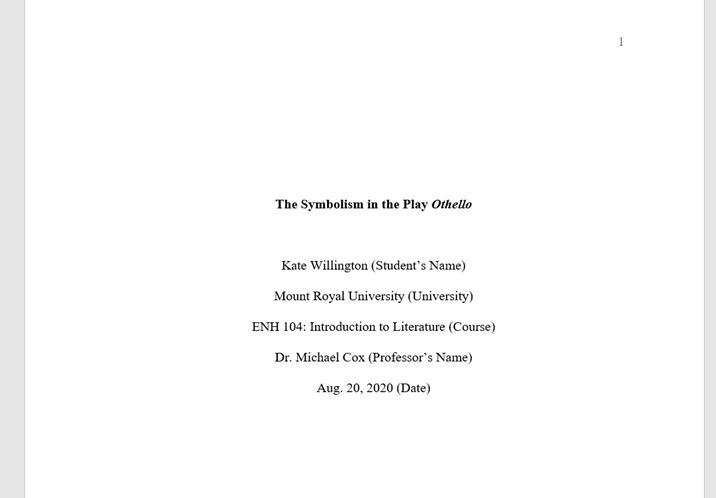
The MLA style does not require a separate title page. Still, some formatting rules are to be strictly followed.
- The MLA paper should start one inch from the top of the document, flush left.
- Write the author’s name, then the instructor’s name, the course number, and the date. Each item should be on a separate double-spaced line.
- Add the title of your paper. It should be centered and capitalized.
- Do not put quotation marks, underline, italicize, or boldface your MLA title. Just make it centered and capitalized.
Here is an example of an MLA title formatting.
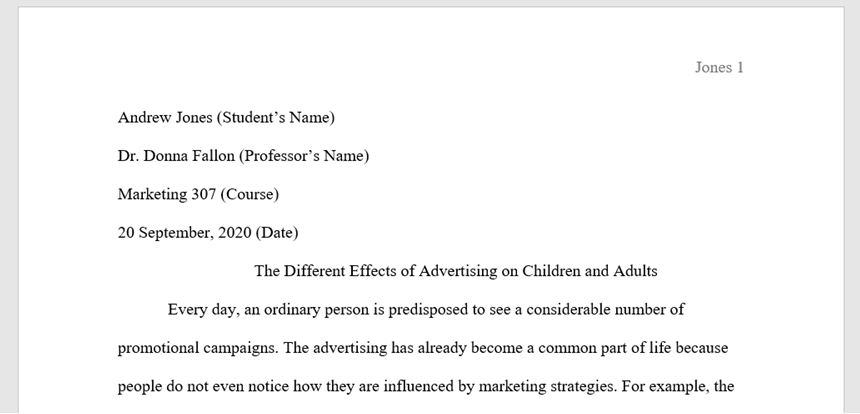
Before choosing a title, figure out is the tone of your essay. Is it more formal or friendly? Do you write it for a college or a personal blog?
Change the wording to make your title sound more catchy and positive. Or serious and official. You can try something new and come up with a creative title for your essay.
You need to write an article about the benefits of healthy eating for university and your online blog. For an academic essay, your title would probably look like this:
A Well-Balanced Diet Is a Key to a Healthy Organism.
In contrast, for a blog article, it would be better to write something like this:
An Apple a Day Keeps a Doctor Away: How Healthy Eating Helps us Be Fit.
Do you see the magic? One topic, different wording, and completely diverse tones as a result. So, try until you reach the most appropriate version of the title for your piece of writing.
Are you still struggling with the selection of a heading for your paper? Take a look at our creative essay title examples! Inspire, then turn on your imagination, and create a personal title.
Argumentative Essay Titles.
- Intercultural Community at University: Prosperity or Constant Encounters.
- Leadership Nature: a Congenital or an Acquired Feature?
- Do Energetic Drinks Help or Harm the Organisms?
- Why Should Sex Education Be Taught at Schools?
- Should the Law Punish Bullying?
- Guns Legalization is an Unsafe Way of Self-Protection.
Narrative Essay Titles.
- Lady Macbeth – One of the Most Frightening Female Characters of Shakespeare.
- The Art of Overcoming Failures: How to Deal with the Downfalls Easily.
- Steve Jobs: from a Poor Student to a Multi-billionaire.
- The Most Influential Person in my Life.
- Three Biggest Events of my Life that Shaped me as a Person.
- What Does it Mean to be a Loving Kid for your Parents?
- What Does “Family” Mean to You?
Persuasive Essay Titles.
- Never Judge the Person by their Appearance.
- Music Should be Implemented as a Medical Treatment.
- In the Battle Between E-Books and Paper Books, the Last Ones Should Win.
- Remote Learning Cannot Replace Face-to-Face Classes.
- Technology Addiction is a Threat to the Future Generation.
- Murderers Should be Sentenced to Death Penalty.
Cause and Effect Essay Titles.
- Because of Traveling Around the World, People Expand their Horizons.
- Due to Massive Immigration, Countries Lose their Cultural Identity.
- Home Abuse as a Cause of Depression and Suicide as its Effect.
- Drug Addiction: a Cause for Psychological Disorder or an Effect?
Thank you for reading our article. Now you get how to come up with a good title for an essay. Don’t forget to share our page with your friends.
- Writing an Effective Title: Quick Tips, Student Support Writing Center, University of Minnesota
- Choosing a Title, Organizing Your Social Sciences Research Paper: Research Guides at University of Southern California
- How Do I Write a Great Title: U-M LSA Sweetland Center for Writing, College of Literature, Science, and Arts, University of Michigan
- General Format: Purdue Online Writing Lab, College of Liberal Arts, Purdue University
- Formatting a Research Paper, Heading and Title: The MLA Style Center
- Title Page Setup: APA Style, American Psychological Association
- APA Title Page (Cover Page) Format, Example, Template: Saul McLeod, Simply Psychology
- Share to Facebook
- Share to Twitter
- Share to LinkedIn
- Share to email

The conclusion is the last paragraph in your paper that draws the ideas and reasoning together. However, its purpose does not end there. A definite essay conclusion accomplishes several goals: Therefore, a conclusion usually consists of: Our experts prepared this guide, where you will find great tips on how to...
![the essay title How to Write a Good Introduction: Examples & Tips [2024 Upd.]](https://custom-writing.org/blog/wp-content/uploads/2021/01/closeup-shot-woman-working-studying-from-home-with-red-coffee-cup-nearby-284x153.jpg)
A five-paragraph essay is one of the most common academic assignments a student may face. It has a well-defined structure: an introduction, three body paragraphs, and a conclusion. Writing an introduction can be the most challenging part of the entire piece. It aims to introduce the main ideas and present...

Exemplification essays, also called illustration essays, are one of the easiest papers to write. However, even the simplest tasks require experience and practice. It is a good idea to find and analyze free exemplification essay examples. You can also ask your teacher to give you some sample exemplification essays from...
![the essay title How to Write about a Topic You Lack Interest in [2024]](https://custom-writing.org/blog/wp-content/uploads/2021/01/Frustrated-exhausted-young-woman-blogger-284x153.jpg)
During their school years, students may not always have the opportunity to select a topic for their essay or research paper. Instructors tend to assign one or offer a list of ideas that might not seem engaging. Moreover, even the topic that you choose yourself can sometimes end up being...

Sorry to disappoint you, but if you think that your high scores and grades would be enough to get accepted into the university of your dreams, you’re wrong… The best colleges worldwide, such as the Ivy League schools receive applications from thousands and thousands of talented students. You gotta stand...

Writing an essay is a task that everyone has to deal with. The first encounter most likely happens at primary school. Compositions in primary school are quite basic and only require a good imagination and somewhat decent writing skills. But… As time passes, essay writing becomes more and more complicated....

Often when you’re completing academic writing, especially essays, you need to use pronouns. In academic writing, the use of the word you is unacceptable. You can find yourself in a sticky situation, deciding upon gender-neutral pronouns in your academic writing. How can students deal with it? In most situations today,...

A divorce is a life-changing experience that affects spouses and their children (if there are any). Since divorce rates are relatively high in modern society, more and more people face this problem nowadays. When you are assigned to compose an argumentative essay about divorce, you should be as careful as...
![the essay title How to Stop Corruption Essay: Guide & Topics [+4 Samples]](https://custom-writing.org/blog/wp-content/uploads/2020/12/close-up-two-hands-while-paying-money-284x153.jpeg)
Corruption is an abuse of power that was entrusted to a person or group of people for personal gain. It can appear in various settings and affect different social classes, leading to unemployment and other economic issues. This is why writing an essay on corruption can become a challenge. One...

Do you have to write an essay for the first time? Or maybe you’ve only written essays with less than 1000 words? Someone might think that writing a 1000-word essay is a rather complicated and time-consuming assignment. Others have no idea how difficult thousand-word essays can be. Well, we have...

To write an engaging “If I Could Change the World” essay, you have to get a few crucial elements: The questions that define this paper type: What? How? Whom? When? Where? The essay structure that determines where each answer should be; Some tips that can make your writing unique and original. Let us...
![the essay title Why I Want to be a Pharmacist Essay: How to Write [2024]](https://custom-writing.org/blog/wp-content/uploads/2020/12/cut-out-medicament-drug-doctor-medical-1-284x153.jpg)
Why do you want to be a pharmacist? An essay on this topic can be challenging, even when you know the answer. The most popular reasons to pursue this profession are the following:
How To Write An Essay
How To Title An Essay

Learn How to Title an Essay Like a Professional Writer
15 min read
Published on: Mar 1, 2023
Last updated on: Jan 29, 2024

People also read
How To Write An Essay - "The Secret To Craft an A+ Essay"
How to Write an Essay Outline Like a Pro
Essay Format - An Easy Guide & Examples
What is a Thesis Statement, and How is it Written? - Know Here
Arguable and Strong Thesis Statement Examples for Your Essay
200+ Creative Hook Examples: Ready, Set, Hook
A Guide to Writing a 1000 Word Essay for School or College
All You Need to Know About a 500-word Essay
Different Types of Essay: Definition With Best Examples
Writing an Essay Introduction - Step by Step Guide
Transition Words for Essays - An Ultimate List
Jumpstart Your Writing with These Proven Strategies on How to Start an Essay
Learn How to Write a Topic Sentence that Stands Out
A Guide to Crafting an Impactful Conclusion for Your Essay
Amazing Essay Topics & Ideas for Your Next Project (2024)
Explore the Different Types of Sentences with Examples
Share this article
A title is the one thing that makes your essay and all academic papers impressive. This is because it is the first thing that a reader looks at and decides whether to give your essay a shot or not.
Naturally, things with amusing and interesting titles tend to be more read-worthy. A right and accurate title can either make your essay a success or a complete disaster.
It might sound easy to give a title to your essay, but it can be daunting in reality. Creating a title is an art, and not everybody knows how to do it.
This writing guide is provided to know how important it is to give a correct title to your writing and polish your writing skills.

Paper Due? Why Suffer? That's our Job!
On This Page On This Page -->
What is an Essay Title
An essay title is the name or label given to an essay, which provides a brief summary of the main topic or theme of the essay.
It should be catchy, informative, and relevant to the content of the essay, while also giving readers an idea of what to expect from the writing.
A good essay title should capture the reader's attention and make them interested in reading the essay.
Purpose and Importance of Essay Title
A title holds great importance in essay writing. It can easily make or break the quality of your work.
Choosing a title that interests the audience and motivates them to read your essay. This is because they are intrigued, it serves as fertile land to present your knowledge, ideas, writing skills, and critical thinking.
Qualities of an Essay Title
When coming up with the topic or title for your essays, keep in mind that it should contain the following qualities:
- Eye-catching and unique: The title should be eye-catching and unique to grab the readerâs attention.
- Based on facts: A good title is always believable and based on facts. Especially for writing essay types and papers that stand on facts and logic should have believable titles.
- Audience-appropriate: Readability is key. Using fancy and bombastic vocabulary that is not common for the audience will affect the readership.
- Tone: A great essay title is always written in an active voice.
- Brief and Short: The title should be brief and to the point. Avoid dragging titles into long sentences.
- To-the-Point: An essay title should be accurate and clearly present the main theme of the essay. This will allow the reader to know what to expect from the document.
Components of an Essay Title
Just as all formal writings have an outline to follow, a good essay title is constructed using a formula as well. Keep in mind that the shorter, the better. A title must not exceed 10 to 12 words.
The components of an essay title include
- An attention-grabbing and catchy hook
- Tone sets the overall mood or attitude conveyed by the title.
- The focus keyword - the âwhereâ and âwhenâ in your essay.
Once you know the importance and elements of an essay title, you are more likely to create a better title.
How to Title an Essay?
Almost all essay writers find it tricky to make an appropriate title for their essays. However, writing a title is not only based on good writing skills. You need to know the basics of creating it.
A good and effective essay title can be created by taking the following steps:
1. First Write an Essay
It will be extremely beneficial and easy to create a title once you have written an entire essay.
After writing your essay, you will be clear about what title suits your content the most. Complete your essay and then start reading it.
This will give you a clearer picture of how to address the essay properly.
Deciding on a topic or a title can be time taking. Another advantage of writing a title at the end is that it saves a lot of your time.
Also, the wrong topic makes it difficult for you to choose the best essay title.
Struggling with getting started with your essay? Check out this helpful guide on how to write an essay !
2. Use your Thesis Statement
There is another reason you should leave your title for an end. An effective title provides a reason for the readers to read your essay. The best part to find a reason is in the thesis statement in the introduction of your essay.
You can always get a title from a thesis statement or by using a part of that argument in the title.
3. Popular Phrases
Catchphrases and cliches that go with the theme of your essay can be used as the titles as well. When popular phrases are appropriate and interesting, they make effective puns.
Play with the cliches and twist them to create something of your own. Be creative and innovative for your titles as much as you can.
4. Consider the Tone
Another trick to creating an effective title for your essay is to consider the essayâs tone and come up with something related to it.
If the tone and subject of your essay are serious and sad, never make the mistake of addressing your title in an informal and fun way.
Do not try to go off the wall in such cases. The tone of your essay and the title have a strong connection to a good essay.
5. Use a Central Idea or a Quote
It is not mandatory but an easy way to create a title that uses a central idea. You can use a quote as the title of your essay topic.
If the purpose is served correctly, even song lyrics work the best sometimes.
6. Summary in Three Words
The most common and basic technique is to get a title from the summary of your essay.
A writer can summarize the entire essay or the central idea and thesis statement in three words and write a title.
This can be a title by putting it in a headline, inserting a colon, and stating the purpose of your essay.
7. Movie Titles in an Essay
A movie title can also be used as a title in an essay.
There are some basic ways to do that. A writer can highlight the title, use a capital letter for the first letter of the movie title, and italicize its font.
Another technique is by creating a sentence structure and using a movie title in it. You can use quotation marks as well as the underlining tool. However, title the essay according to the field of study and donât make it irrelevant.
Mistakes to Avoid While Giving a Title to Your Essay
Here are some tips to keep in mind when crafting effective essay titles to avoid common mistakes:
- Positive themes
Avoid writing about sensitive, unethical, or immoral topics, such as drugs, prostitution, or murder.
- Personal information
Your personal negative experiences should not be included in your essay. However, you can still include lessons learned from those experiences in a professional manner.
- Relevant Questions
Make sure to ask questions that are relevant to your field of study to ensure you choose an appropriate topic.
- Professional tone
Keep your essay professional and avoid including personal information or experiences that are not relevant. Your readers are not interested in your personal life.
- Understanding requirements
It's important to understand your professor's requirements to avoid choosing the wrong topic and wasting time and effort.
- Neutral perspective
Avoid taking an offensive approach in your essay and steer clear of controversial topics such as religion, abortion, and politics.
How to Title an Essay in Different Formats?
All academic essays require a format through which the writer shapes his document. This format varies from academic level to level and institution as well. The format styles include MLA, APA, Chicago, and Harvard.
MLA, APA, and Chicago are the most common formats that are usually used. If you are writing an essay choosing a specific format, all of the parts should be drafted accordingly.
From titling an essay to drawing a conclusion, the writer must follow the format properly to create a strong essay.
How to Title an Essay in MLA Format?
No matter which essay format you are using to shape your argumentative essay, descriptive essay, etc. The qualities of the title and components remain the same.
Although the formatting of the title may differ. For an MLA style , format your essay title in the following pattern:
- On the cover page of your essay, using double spacing, write your name in the upper left corner
- Along with your name, present your instructorâs name, the course title, and the date.
- Double-space a line and using centered alignment, provide the essay title in font size 12 pt.
- Do not bold or italicize the title.
- Capitalize important words only and not the articles in the title.
How to Format an Essay in APA Format?
If you are writing an essay in APA style, you might be wondering how to title an essay in apa format.
Simply use the following guidelines to format your title and make your writing process easy:
- Type the title in upper and lowercase letters
- Use centered alignment on the upper half of the page and write the title
- The title in APA style should not exceed more than 12 words
- Avoid using abbreviations and irrelevant words
- The title should be presented in a line or two and not more than that
- Use double spacing between the lines
- Beneath the title, write your name and the institutional affiliation.
How to Title an Essay Chicago Style
To create an appropriate final version of the title for your essay in Chicago style, you should follow certain guidelines.
- Use a heading level 2 (H2) for your title
- Center the title on the page and use title case capitalization
- Keep the title informative and concise, aiming for no more than 12-15 words
- Consider including relevant keywords to make your essay easier to find
- Avoid using slang or informal language in your title
- Use proper grammar and punctuation
How to Choose a Good Title for an Essay
Choosing a good title for an essay is crucial as it sets the tone and theme for the reader.
Here are some important qualities to consider when selecting a title:
- Informative: A good title should give the reader an idea of what the essay is about. It should be concise and clearly convey the main topic or argument of the essay.
- Catchy and Memorable: A title that is catchy and memorable can grab the reader's attention and make them more likely to read the essay. Consider using wordplay, puns, or alliteration to make your title stand out.
- Unique: A title that is unique and original can make your essay stand out from others. Avoid using generic or cliché titles that have been overused.
- Accurate: A title should accurately reflect the content of the essay. Avoid using sensational or misleading titles that do not accurately convey the main point or argument of the essay.
- Relevant: A title should be relevant to the current times or issues. Especially in subjects like current events, social or political issues, and scientific research.
- Reflective of Tone: The title should also reflect the tone of the essay. If the essay is humorous, the title should be as well. If the essay is serious or academic, the title should reflect that.
Essay Title Examples
Just like the tone of every essay differs, the title also differs from each type of essay. For example, movie titles can only be used for informal writing and narrative essays.
Some examples of essay titles are provided below.
Here are some more examples of essay titles.
Tips to Draft an Essay Title
Titles for Different Types of Essay
How To Title An Essay About A Book
Bad vs Good Essay Title Examples - H3
Tips for Crafting an Outstanding Title
Here are some tips for crafting an outstanding title:
- Brainstorm: Begin by brainstorming a list of potential titles for your essay or paper. Write down as many ideas as you can think of, even if they seem silly or irrelevant at first.
- Be Specific: A good title should be specific and accurate. It should give the reader an idea of what the essay is about. Avoid vague or general titles that don't provide any useful information.
- Use Keywords: Including keywords in your title can make it easier for readers to find your work in searches. Consider what words or phrases a person might use to search for your topic and incorporate them into your title.
- Be Creative: A creative and unique title can make your work stand out from others. Consider using wordplay, puns, alliteration, or metaphors to create a memorable and attention-grabbing title.
- Keep It Short and Sweet: While a title should be specific and informative, it should also be concise. Try to keep your title under 10-12 words, as longer titles can be difficult to read and remember.
For more tips, you can check out this video:
The success of your overall essay is not just based on how well you presented the argument and conducted research to gather the information. A title plays a vital role as well.
Creative titles are like the icing on the cake. Nobody will want to read it when it will not appeal to them.
Make your college essay and paper flawless, as they are the only thing that will get you scores in academics. So, you have to know what mistakes to avoid and what to do when title the essay.
However, you can ask professionals at our best essay service to write your essays perfectly and with the best quality.
Place your " write my college essay for me " request today to get your essays and research papers written by professionals and get writing services at exciting prices.
Also, try our AI writing tool to make your academic journey easier!
Frequently Asked Questions
Is it better to use a question or a statement as my essay title.
Whether to use a question or a statement as your essay title depends on the content and purpose of your essay.
Using a question can be effective if your essay is exploratory and seeks to answer a specific question. On the other hand, using a statement can be more appropriate if your essay has a clear argument or thesis statement.
Barbara P (Literature, Marketing)
Barbara is a highly educated and qualified author with a Ph.D. in public health from an Ivy League university. She has spent a significant amount of time working in the medical field, conducting a thorough study on a variety of health issues. Her work has been published in several major publications.
Paper Due? Why Suffer? That’s our Job!

Keep reading

Legal & Policies
- Privacy Policy
- Cookies Policy
- Terms of Use
- Refunds & Cancellations
- Our Writers
- Success Stories
- Our Guarantees
- Affiliate Program
- Referral Program
- AI Essay Writer
Disclaimer: All client orders are completed by our team of highly qualified human writers. The essays and papers provided by us are not to be used for submission but rather as learning models only.
- PRO Courses Guides New Tech Help Pro Expert Videos About wikiHow Pro Upgrade Sign In
- EDIT Edit this Article
- EXPLORE Tech Help Pro About Us Random Article Quizzes Request a New Article Community Dashboard This Or That Game Popular Categories Arts and Entertainment Artwork Books Movies Computers and Electronics Computers Phone Skills Technology Hacks Health Men's Health Mental Health Women's Health Relationships Dating Love Relationship Issues Hobbies and Crafts Crafts Drawing Games Education & Communication Communication Skills Personal Development Studying Personal Care and Style Fashion Hair Care Personal Hygiene Youth Personal Care School Stuff Dating All Categories Arts and Entertainment Finance and Business Home and Garden Relationship Quizzes Cars & Other Vehicles Food and Entertaining Personal Care and Style Sports and Fitness Computers and Electronics Health Pets and Animals Travel Education & Communication Hobbies and Crafts Philosophy and Religion Work World Family Life Holidays and Traditions Relationships Youth
- Browse Articles
- Learn Something New
- Quizzes Hot
- This Or That Game
- Train Your Brain
- Explore More
- Support wikiHow
- About wikiHow
- Log in / Sign up
- Education and Communications
- College University and Postgraduate
- Academic Writing
How to Write a Strong Title for an Argumentative Essay
Last Updated: June 4, 2023 Fact Checked
This article was co-authored by Diane Stubbs . Diane Stubbs is a Secondary English Teacher with over 22 years of experience teaching all high school grade levels and AP courses. She specializes in secondary education, classroom management, and educational technology. Diane earned a Bachelor of Arts in English from the University of Delaware and a Master of Education from Wesley College. This article has been fact-checked, ensuring the accuracy of any cited facts and confirming the authority of its sources. This article has been viewed 167,251 times.
In most cases, a title for an essay is only required for college papers. A title for an argumentative essay isn't much different than a title for any other essay. You need to present what your essay is about in phrase form, as well as provide a hook to encourage the reader to read your essay. One main difference is you also need to make sure you establish your stance on the subject, so the reader knows where your argument is headed from the beginning. In order to create a strong title, you should write your essay before coming up with a title for it.
Summarizing Your Ideas

- Also, read through your paper. Start making notes on the main ideas. If you organized your paper well, you should have the paper divided into several main ideas.
- Write down any ideas you have about what you think should go in your title.

- In most cases, your thesis, or a version of it, is the best summary for the essay. The thesis should be stated at the end of your introduction, and perhaps restated at the beginning of your conclusion as well.
- Try to get it down to one sentence if possible, such as, "Soup is significantly more flavorful when made with stock than when made with water."

- For instance, if you wrote a paper on why soup is better when made with stock than water, think about what words are essential to that paper.
- Your list of keywords might include "soup," "stock," and "flavor," as an example.
Creating a Title

- Also, think about the tone of your essay. If it's lighthearted, a lighthearted title will fit. For instance, an essay on stock and chicken soup lends itself to lightheartedness.
- However, if your essay is very serious, stick to a serious title. For instance, if you're trying to convince people that poverty needs to end, that's a pretty serious topic and needs a serious title.

- Read over your paper. You can use this opportunity to proofread while you look for a good sentence.
- Write out any sentence that may work. For instance, one sentence that might work is "Soup is delicious, but it is even more delicious when made with stock."
- Shorten it up to work as a title: "Soup Is More Flavorful With Stock."

- For instance, you could write, "Why Does Stock Make Soup So Flavorful?" That establishes your topic, as well as invites your reader into your paper.
- Just be sure you are answering the question you propose.
- Choose a different question than the one you used for your hook, if applicable.

- Come up with something that is contrasting or surprising. A concrete image works well, meaning something that invokes the senses. For instance, you could write something like "The Flavor of Boiled Chicken Bones Is the Best for Soup."
- People don't necessarily think bones are tasty, but they are used to create your flavorful broth. Therefore, it's a bit surprising, but it plays into your essay.
- Try to create a title that is both short and sweet.

- As an example, a pun you could use would be "Use Your Backbone to Make Soup." "Backbone" is a play both on the fact that you're using stock (made from bones) and that you need to use your backbone to stand up for stock.
- As for a saying, you could use something like "Chicken Soup: Only the Opiate of the Masses If Made With Stock." "Opiate of the masses" is a reference to Karl Marx and will attract attention.
Finessing Your Title

- That is, move words around to see if you can make a better statement.
- Try mixing and matching among titles that you like. Pick the parts you like best.

- For instance, if you are discussing a specific type of soup, add that in: "Chicken Stock Makes the Best Chicken Soup."
- If you are specifically talking about homemade stock, add that in "Homemade Chicken Stock Makes the Best Chicken Soup."
- If possible, try to give the reader just an idea of which side you plan to argue in favor of in the essay.

- The most common method is putting the creative part first as the main title, followed by the informative part in the subtitle. However, you can do it either way.
- For example, you could write: "Use Your Backbone: Why You Should Advocate for Stock in Soup."
- If the titles are on the same line, separate them by a colon. If not, you don't need the colon.

- Compare your title to the list you made earlier.

- In the case of an argumentative essay, that not only means that you've presented what your topic is but also what your stance on that topic is.
- Try it out on a parent. Ask her what she thinks the paper is about from your title.

- The exception to this rule is very common abbreviations or abbreviations that are appropriate for your audience.
- For instance, using "HIV" probably wouldn't confuse your readers.
Community Q&A
- It can be helpful to look up titles of articles and essays for reference. Check major websites or networks for examples of effective titles. Remember to avoid “clickbait,” though! Thanks Helpful 0 Not Helpful 0

You Might Also Like

- ↑ http://writing.umn.edu/sws/assets/pdf/quicktips/titles.pdf
- ↑ https://umanitoba.ca/student/academiclearning/media/Writing_a_Great_Title_NEW.pdf
- ↑ https://www.esu.edu/writing-studio/guides/hook.cfm
- ↑ https://lsa.umich.edu/sweetland/undergraduates/writing-guides/how-do-i-write-a-great-title-.html
- ↑ http://www.editage.com/insights/3-basic-tips-on-writing-a-good-research-paper-title
About This Article

- Send fan mail to authors
Reader Success Stories
Leo Willson
Feb 13, 2017
Did this article help you?
Masunga Edward
May 16, 2019

Featured Articles

Trending Articles

Watch Articles

- Terms of Use
- Privacy Policy
- Do Not Sell or Share My Info
- Not Selling Info
Don’t miss out! Sign up for
wikiHow’s newsletter
- How It Works
- Prices & Discounts
How to Create an Essay Title: 7 Best Practices
Table of contents
The title of your essay is probably the first thing that your readers or professors will read, so it has to be perfect. If the title is appealing, you can consider half the battle won.
Your title is like a window to your mind and your power of expression. Through your title, your readers will determine if they are interested in reading your essay or not.
Choosing the right essay title gives a good impression, sets the tone of the paper, and augments the argument that is later discussed in the main body of the essay.
In this article, you will learn how to create an essay title that attracts attention and generates interest in your professor.
What are the Components of a Good Essay Title
A title can make or break the eagerness of wanting to read the entire essay. If you have an uninspiring title for an interesting, well-researched paper, your professor will most likely be put-off, making your entire effort go waste.
On the other hand, a clear and concise title helps to evoke inquisitiveness in your readers, making them open to what you have to say and the arguments you’ve addressed.
A good and clear title also emits the fact that you have researched and understood the prompt, you know what you want to write about, and you know how to frame it. This is a tremendous plus point as it's very important to bring your audience to attention so that you can get them to engage with and relate to your writing.
Before we talk about how to create an essay title, let’s take a look at the three components of a strong essay title:
- A catchy hook - A creative way to introduce your subject argument to your readers. This is what draws your readers in.
- Topic keywords - These keywords are related to the important topics that you will be exploring further and detailing in your essay. This is majorly relying on the “what” part of your paper.
- Focus keywords or source - These stand firm on the “where/when” aspect of your essay. These keywords will help your readers understand a little more about the source of the argument and where the concepts that are to be discussed have originated from.
Example of an essay title for better understanding
“ What is the truth: Is Veganism a privilege for the 21st Century? ”
Hook : What is the truth?
Topic Keywords : Veganism; privilege
Source : 21st Century
7 Best Practices to Create an Essay Title and Captivate Readers
We know that the naming of the essay is just the first step, but it is one of the most important aspects of essay writing.
Here are seven practices to keep in mind while framing an essay title.
1. Craft the title at the end
People often waste too much time thinking about coming up with a good essay title first and then begin writing their essays.
It may seem like a logical thing to do, but it is not the most practical idea. If you still have a working headline in your mind, write it in the top corner of your essay for backup.
But as you write your essay, you will immediately come up with a variety of perfect essay titles that are brief and summarize the gist of the essay in a few words. This is because as you read and re-read your essay, you will have a clear idea as to what you are really saying in your draft and your title should represent the focus of your writing.
The time that you’ll spend thinking about your title could well be used to do research or creating an outline .
2. Use your thesis statement
A good title will influence your readers to be interested in your essay and explore it further. It will make them eager to know more about what you are writing. This is where your thesis statement plays an important role and provides a clear understanding of your title.
Your thesis statement and your title should be interdependent and since this statement is the focal argument of your paper, it should be incorporated at least as a part of your headline.
3. Consider the tone and audience of the essay
The title should grasp the reader's attention, and this can only be accomplished when you know who your target audience readers are going to be.
When you are submitting an essay as part of your college curriculum, you are reaching out to a learned faculty. It is important to keep your tone grave and your argument seriously. Avoid the usage of flippant language or slang because you are not talking to 16-year-olds. The audience is rooted in the transfer of knowledge, and your address to them should be likewise.
Similarly, in the case of the tone of the essay, a descriptive essay will have a fairly different tone from an argumentative essay. Since you are writing an academic essay, use a formal setting for writing your essay.
The subject of the essay also determines the tone. For instance, the way you title a fashion innovation essay would be quite different from the way you do a write-up about an archeological excavation.
The theme and audience of your essay should determine the method of crafting your essay title as well as give you a head start in framing your content.
Always make sure that the tone of your essay and your title match and have a similar theme, and don’t mislead the readers.
This video by Language Centre University of Groningen will help you determine the purpose, audience, and tone of your essay
4. Sum up your title in 5 words
Your essay title should be brief but should give your readers an idea regarding the main argument of your essay.
Think about it: if you had to summarize the focus of your essay in 5 words, what would it be? Long and detailed titles look cumbersome while making it tedious for readers to read or understand the context of your essay. The key is to get straight to the point.
5. Keep it simple
Don't use fancy or complicated words that might confuse your readers, instead go for straight-to-the-point words and avoid adding any unnecessary details in the title of your essay. Pick out important and useful keywords from your essay to frame a great title.
6. Look for creative quotes
There is no hard and fast rule for choosing essay titles from the content written. You can get creative and pick any quote, phrase or slogan that is relevant or appropriate to your specific paper and that suits as a headline.
You can also use popular phrases or idioms to generate that perfect title. This will make your topic look more approachable and relatable to your readers.
7. Avoid abbreviations
Why should you opt for using abbreviations, jargon, or slang in your essay title when you can write full, proper words?
You doesn't want all that hard work and commitment in crafting a great essay to go down the drain only because you used a “misc.” instead of writing ‘miscellaneous’ or a ‘vs.’ instead of ‘versus’.
Your readers will see an abbreviation on your essay title and think of your topic as too casual and not worth spending time on. Thus, they would move on to other topics and that will result in your essay being sidelined.
Conclusion: create a strong essay title
Generating a great essay title takes diligence, commitment, and proper time. The structure, each component, the appropriate words, and the clear but specific meaning and argument of your essay should be showcased in the title.
This ability, if cultivated well, will surely go a long way in earning you good grades and impressing your professors with your writing skills, your research competence, and your strengths in thinking through a topic.
When you need help in grabbing the reader's attention right from the outset, implementing these seven best practices will help you craft a strong essay title. If you’re not happy with your essay title or need help brainstorming, you can reach out to our experts at Writers Per Hour.
From researching topic ideas and framing essay titles to delivering an original, well-written fast essay - our professional essay writers are here to support you with all your essay writing needs!
Share this article
Achieve Academic Success with Expert Assistance!
Crafted from Scratch for You.
Ensuring Your Work’s Originality.
Transform Your Draft into Excellence.
Perfecting Your Paper’s Grammar, Style, and Format (APA, MLA, etc.).
Calculate the cost of your paper
Get ideas for your essay

Formatting Titles
by Purdue Global Academic Success Center and Writing Center · Published October 2, 2020 · Updated November 5, 2020

Let’s face it: For whatever reason, formatting titles can be confusing, especially if you think about all the titles that need proper formatting–the title placed on the title page of a paper, the title of a journal article mentioned in the body of a paper, the title of a newspaper or a website on the list of references. There are titles of books and titles of chapters in those books; titles of blogs and titles of blog entries. Some titles are italicized and some are put in quotation marks. Titles on the list of references require formatting–some titles use title case, some sentence case; some titles are italicized and some are not. And then there are those situations where titles are used in in-text citations–some titles are truncated and italicized; some are put in quotation marks–you get the idea.
First off, I am not going to address how to format titles when citing in the paper or listing on the list of references—those are formatting guidelines for another time. I am going to focus on titles on the title page, the first page of the paper, and within a paper. Here is what you need to keep straight:
Titles require special capitalization called title case. Title case requires one to
- capitalize the first letter of the first and last words of a title;
- capitalize the first letter of all verbs;
- capitalize all words of four or more letters;
- capitalize the first letter of all other words except a, an, the, short conjunctions such as “for, and, but,” and prepositions of fewer than four letters (words like “up, in, off”);
- capitalize the first letter of a word following a colon or dash;
- capitalize the first letter of a subtitle.
When a title appears on the title page of an APA Style 7th edition student paper, that title should be centered, bolded, and in title case—no need to use all caps, no need to italicize or underline, and no need to use quotation marks or place a period at the end.
Simply type out the title using title case and bold it–that’s it.
On the first page of the essay, center and repeat the title, bold it, and use title case. Again, do not use any special formatting. Do not use a bigger font size or style. Do not underline or italicize and so forth. Just use title case, bold, and center the title on the first page of the essay.
Easy enough, right?
Titles that appear within an essay require special formatting in addition to title case. If the title is for an article—content that is part of a greater whole—then the title should have quotation marks around it. If the title is for a book, journal, newspaper, or some other whole work, then the title is italicized.
Let’s say you have an article titled “The New Coffee Culture” that appears in the journal Studies in Popular Culture . Let’s also say that for whatever reason, you name both titles in the body of your paper. The article “The New Coffee Culture” appears in the journal Studies in Popular Culture , so the article is content that appears in a greater whole, right?
Both titles would be in title case. The article “The New Coffee Culture” would have quotation marks around it, and the title of the journal, Studies in Popular Culture , would be italicized.
I hope this blogcast clarifies exactly what you need to do when formatting titles in typical usage situations in APA style.
Until next week–
Kurtis Clements

Share this:
- Click to email a link to a friend (Opens in new window)
- Click to share on Facebook (Opens in new window)
- Click to share on Reddit (Opens in new window)
- Click to share on Twitter (Opens in new window)
- Click to share on LinkedIn (Opens in new window)
- Click to share on Pinterest (Opens in new window)
- Click to print (Opens in new window)
- Next story APA Style Formatting in PowerPoint
- Previous story Bias-Free Language
Leave a Reply Cancel reply
Your email address will not be published. Required fields are marked *
Notify me of follow-up comments by email.
Notify me of new posts by email.
The Andromeda Galaxy, also known as Messier 31 (M31) or NGC 224, is a spiral galaxy located approximately 2.5 million light-years away in the constellation Andromeda.
- Podcast Episode
Add a plot in your language
User reviews
- May 12, 2024 (United Kingdom)
- See more company credits at IMDbPro
Related news
Contribute to this page.
- IMDb Answers: Help fill gaps in our data
- Learn more about contributing
More to explore

Recently viewed
- Collections
- Support PDR
Search The Public Domain Review

Same as It Ever Was? Eternal Recurrence in Ancient Greek and Roman Philosophy
By Claire Hall
While Friedrich Nietzsche popularised the notion of an “eternal return” — in which one’s life would occur again, forever, exactly as it did before — the concept was itself a repetition. Claire Hall explores various shades of this idea in ancient philosophy, from Pythagorean metempsychosis to Stoic predictions about a cosmological reset.
May 15, 2024
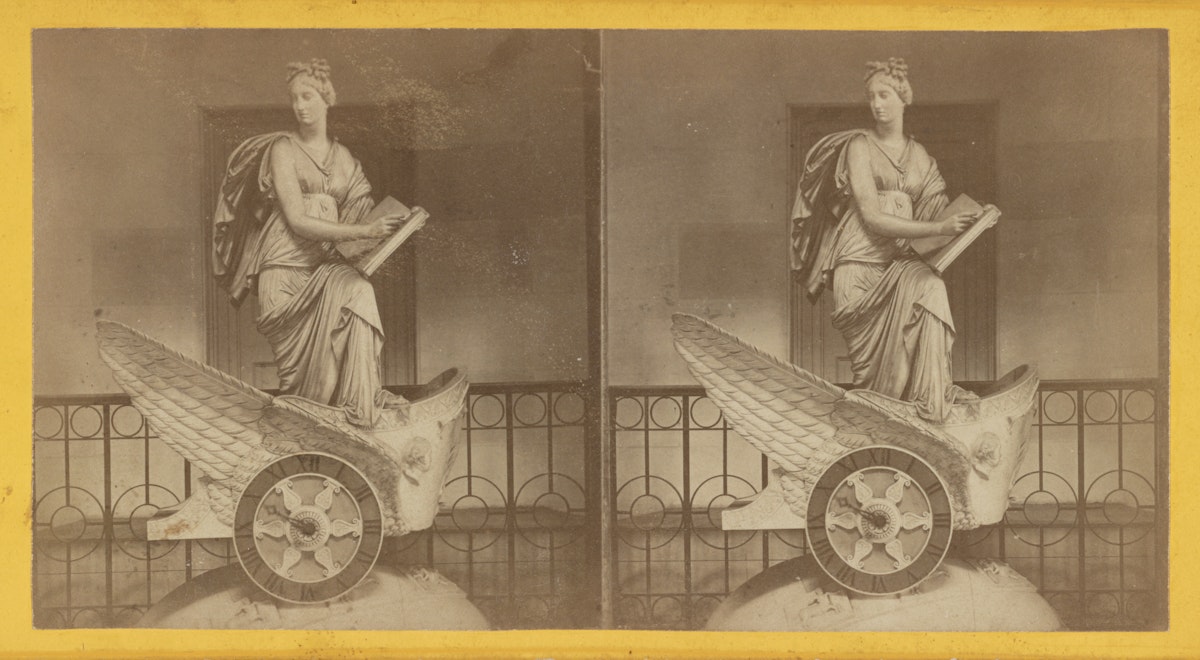
Stereograph of Carlo Franzoni's 1819 marble sculpture of Clio, the Muse of History, standing in a winged chariot atop a clock, at the United States Capitol in Washington, D.C., ca. 1860–90 — Source .
Albert Einstein kept changing his mind about the fate of the universe. As a young man, he had — like most other people at the time — believed the universe was static, a fixed size. By the end of his life, Einstein accepted the Big Bang, and had adopted the (now standard) view that the universe will keep growing outward, continuing to expand forever, its lights growing fainter until, eventually, they all fade to an endless inky black. But in between, in the early 1930s, he endorsed a rather different idea: that the universe goes through cosmic cycles.
In a cyclical model, our universe began with a Big Bang and continues to expand — but at some point it will stop. It will then contract, reversing its direction of travel, until eventually all matter collapses into a single point: a Big Crunch. But that is not simply the end of the universe: it is also a new starting point— it triggers another Big Bang, and another universe blooms. This pattern repeats, and repeats. Einstein wasn’t the first to suggest this idea using modern physics. It had been proposed by Alexander Friedmann, a Russian cosmologist whose work was fundamental for establishing the idea of the Big Bang. Friedmann had already been contemplating the physics of cosmic cycles when he died from an unlucky accident: some years earlier on his honeymoon, he had caught typhoid fever from an infected pear bought at a railway station — and in 1925 the infection took over his body.
Recurrence — the idea that the universe will die and be reborn, time and time again — might have been new to physics, but it is not a new idea. Globally, it is found in a number of religions, including Hinduism and Buddhism. It was also the subject of philosophical speculation in the premodern world. In particular, in the works of Greek and Roman philosophers, attempts were made to distinguish between different kinds of recurrence. There is the first kind we have already met through modern physics: the idea that the universe as a whole will die and be reborn. But this idea as it appears in Einstein and Friedmann does not make any claim that particular events, objects, or people will recur. What the physicists were interested in was a reshuffling of the cosmos.

Plate from Robert Fludd, Utriusque Cosmi (1617) — Source .
A second type of recurrence is reincarnation, a concept common to many religions. Here the focus is not the world as a whole, but the human or animal soul: each soul is reincarnated, living varying lives in sequences that are determined or governed by some cosmic balance. This can be found alongside an idea of cosmic recurrence, as in Hinduism and Buddhism, but is also consistent with a belief in an eternal world (such as in Jainism or some indigenous Aboriginal religions) or with a stable created world (such as in Sikhism, certain branches of Judaism, and in some of the traditional religions indigenous to the Americas, including that of the Inupiaq people of Alaska). But a third, more extreme idea, is that of exact recurrence — the whole world dies and begins again, and with it every event happens again the same way, in the exact same sequence, forever. Unlike the abstract cosmic rebirth of the physicists, both reincarnation and strict recurrence offer us a reason for the randomness of life’s fortunes, a way to believe that things happen not out of pure chance, but because something from a previous cycle provides a template for the present. Recurrence offers us a bigger picture, a greater web in which to link the vastness of Friedmann’s astrophysical research with the feather-lightness of the chance that killed him.
Greco-Roman writers treated the idea of eternal recurrence in a variety of ways. In a loose sense, many ancient writers observed that there are elements of circularity built into any idea of time measurement. Eudemus, a pupil of Aristotle, recognised this wider context, and put it clearly: “sameness is spoken of in different ways, and it does seem that a time [period] the same in kind recurs, e.g. summer, winter, and the other seasons.” 1 Aristotle himself said that time was “a sort of circle”. 2 Plato had called it “the moving image of eternity”, clearly linking time to the circular movements of the heavens. 3 Early Greek texts on the weather and seasons elaborate this idea of a cycle of time. Hesiod’s Works and Days , for example, presents an almanac of recurring signs for the farmer, while the long-established festival calendars of the Greek city states were often inscribed and displayed, providing a visual clue to the sameness of each changing year.
Greek thinkers also theorised recurrence in the sense of reincarnation. One of the important features of Pythagorean thought is the idea of metempsychosis, or the transmigration of souls. Unfortunately, Pythagoreanism is particularly difficult to reconstruct: much was unwritten, and what was written has in large part been lost. After its first flush of popularity in the pre-Classical Greek world, centuries of often contradictory stories accreted around the cult figure of Pythagoras, silting up the historical record. (Later interpretations of Pythagoreanism are, of course, interesting in their own right as entryways into the teeming philosophical world of Late Antiquity, but they tell us very little about what Greeks of the sixth century BCE really thought). Pythagoreanism’s doctrines shaped a number of the genuinely secretive mystery cults of the Greek world, including Orphism and the Eleusinian mysteries, whose ideas about reincarnation are mostly lost to time. Reincarnation is, therefore, one of those topics on which the Greek texts whisper rather than shout.
_-_Foto_G._Dall_Orto-edit-2.jpg?fit=max&w=1200&h=850)
Roman mosaic of Orpheus surrounded by animals, from the Piazza della Vittoria in Palermo, ca. 200–250 — Source .
But the philosophical schools that developed after Plato’s time took a more precise and pedantic approach. “I will talk, staff in hand, to you sitting like this, and everything else will be alike.” With these words, Eudemus summarised the view of a group of Stoic philosophers that all the events in the world would exactly recur, again and again. As he details, some Pythagoreans seem to have believed not only in reincarnation, but in exact recurrence: that things would be numerically the same, with the relative order of events exactly mapped between one iteration of the universe and the next. It was an idea reportedly taken up by Chrysippus (ca. 279–206 BCE), the most renowned of all the Stoic philosophers, although other Stoics disagreed. The Stoic version of recurrence had a terrifying additional element to it: the ekpyrosis or great conflagration. Stoics argued that ekpyrosis was a process in which the entire universe periodically goes up in flames and a new world emerges from its ashes like a phoenix — in fact, a lot like the Big Crunch. Many Stoic views are available to us only in later summaries. Hippolytus, a Christian writer of the second century CE, describes the Stoic doctrine, capturing the way in which the passing away of the old and the birth of the new are intertwined:
[The Stoics] expect that there will be a conflagration and a purification of this world, some say entirely, others say in part, and they . . . call the destruction and the subsequent generation of another [world] from it a purification. 4
Writing around the same time as Hippolytus, Alexander of Aphrodisias, a pagan commentator on Aristotle, elaborates on the Chrysippean view:
[Some Stoics] held that after the conflagration all the same things come to be again in the world numerically, so that even the same peculiarly qualified individual as before exists and comes to be again in that world. 5
Some Stoic philosophers explain the theory behind this periodic conflagration with a mysterious astronomical concept: the Great Year. The Great Year appears as a framing device in The Cradle of Life , the 2003 Tomb Raider sequel film starring Angelina Jolie: in a hidden ice cavern, a giant model of the solar system ticks down to the time when the orbits of all nine planets will align. In the ancient world, there were only five known planets (Saturn, Jupiter, Venus, Mars, Mercury) plus the two luminaries (the Sun and the Moon). If you started a timer at the moment that they were all lined up, their extremely different orbits mean that it would then take approximately 36,000 years before they returned to the same perfect line. The term “Great Year” was used to describe this particular alignment, but it was also used to refer to the time interval that it would take for any particular arrangement of the planets in the sky to occur again. Plato describes it as the “perfect number of time” in the Timaeus , a work which revolves around demonstrating the perfect harmony of the cosmos. 6 Cicero, more practically-minded, says the following:
On the diverse motions of the planets the mathematicians have based what they call the Great Year, which is completed when the sun, moon and five planets having all finished their courses have returned to the same positions relative to one another. The length of this period is hotly debated, but it must necessarily be a fixed and definite time. 7
The Great Year carries in it some idea of a celestial reset, hence its association with ekpyrosis . Although it’s tempting to picture the Stoic ekpyrosis like the death of the dinosaurs in Disney’s Fantasia , with streams drying up and creatures’ scorched flesh falling from their bones, most Stoics were actually rather sober about the whole thing. While the ever-dramatic Seneca luridly imagines cities “swallowed up in yawning chasms” and the inhabited world “cover[ered] with floods”, Marcus Aurelius is more representative of the tradition as a whole: he calmly suggests that everything “will evaporate . . . or it will be scattered”. 8 The time period involved, 36,000 years, is large enough to be basically non-threatening: just as we are able to dismiss without too much fear the idea of the universe eventually collapsing in a heat death in billions of years’ time, the ancients were also reassured by the enormity of the Great Year.

Illustration by Fred T. Jane for George Griffith’s Olga Romanoff (1897) — Source .
This Stoic idea of cosmic cycles — of something like a general refreshing of the universe — became part of the common currency of ancient thought. But for those who wanted to get into detail, recurrence had its conceptual problems. Particularly tricky was the strict form: the exact recurrence that some of the Stoics and Pythagoreans seem to have endorsed. Various philosophers weighed in on these difficulties: first and most fundamentally, if everything recurs exactly, does that not also mean time itself recurs? In that case, does everything actually happen more than once in any meaningful way? If we can only distinguish two otherwise identical events by saying that one happens before the other, that suggests we need an outside observer or a continuous measure of time in order to distinguish sameness and difference. These are exactly grounds on which Eudemus objects to the idea of strict recurrence:
For when the motion is one and the same, and similarly there are many things which are the same, their before and after is one and the same, and hence so is their number. So everything is the same, which means that the time is as well.
Some of this difficulty, as the philosophers realised, is to do with language: what does it mean to claim something happens again or earlier or later in a series of cyclical sequences that occur outside time? Aristotle used this linguistic problem as a way of demarcating between two different types of time. Sometimes we use the term “time” ( chronos ), he argued, when really we mean the scale we’re using to measure change — this is the sense of time we are employing when we say that it took Zeno four minutes to run the race, or that Seneca was in the bath for an hour. But the other type of time is the abstract concept, the thing that he sees as being outside of us, which marches ever onward. As he says:
Time is the measurement of circular motion [of the heavens], and is itself measured by a circular motion [of the heavens] . . . there is nothing else to be seen in what is measured except for the measure. 9
One response to the conceptual problem Aristotle raises was to deny that everything would be exactly the same in a recurring universe — to avoid the question of whether time starts again by positing that there are minutely different universes potentially (even if not practically) distinguishable against a continuous backdrop of ongoing time. This cop-out route seems to have been taken by some of the Stoics. The Christian philosopher Origen of Alexandria (180–250 CE) reports that: “to avoid supposing that Socrates will live again, [some Stoics] say that it will be someone indistinguishable from Socrates, who will marry someone indistinguishable from Xanthippe, and will be accused by men indistinguishable from Anytus and Meletus.” 10
But Origen explained this idea in order to reject it: for him, any kind of recurrence was incompatible with Christian doctrine, in which time had a distinct sense of direction. Most early Christians felt the same. Primarily, they were deeply uncomfortable with any idea of recurrence that included reincarnation: Christians instead believed that a person’s soul would go to heaven (or to hell, which became increasingly dominant in Christian thought as the Middle Ages wore on). The millenarian movement that was so popular in the early Church also supported the idea of the bodily resurrection of all Christians at the time of Jesus’ Second Coming. Reincarnation — where the soul travels through many bodies — was fundamentally incompatible with the idea of resurrection, which kept body and soul connected, even after death. Christian literature of the first few centuries abounds in half-comic, half-ghastly thought experiments about the mechanics of this final universal sorting and reckoning, including a fascination with how the bodies of cannibals and their victims are arranged in heaven.
-edit.jpeg?fit=max&w=1200&h=850)
Michelangelo, The Last Judgement (detail), ca. 1536–41 — Source .
But more strict ideas of recurrence were also unacceptable to Christians: it was totally incompatible with Christian doctrine to suggest that the Creation could be repeated, or that the Second Coming would in truth be one of infinitely many appearances of Christ. In fact, this strong Christian commitment toward the fixed linear structure of time represents an enormous shift in Western thought. Pre-Christian pagans and Jews had articulated a mix of ideas about cyclical and linear time, but in general nearly all ancient Mediterranean cultures had a profound orientation toward the past. Christianity changed that: it was now important to understand our lives on earth in the context of the afterlife, and, beyond it all, structuring it all, God’s final judgement. Time was linear, but chance was also never random — the world ran under the watchful eye of an omniscient God. Ideas about recurrence and reincarnation would fall out of favour in the West for over 1500 years.
Fifty years before Einstein embraced the idea of cosmic cycles, Nietzsche argued for a return to ideas of recurrence. God was dead and with him went the afterlife and its promised judgement of a lifetime of Christian morality. Nietzsche was worried that with this loss, solipsism could sneak in: for him, it was intolerable to think of life as arbitrary or ephemeral. Returning to recurrence was a way to put his own spin on the pre-Christian search for the meaning of life. Nietzsche used Thus Spake Zarathustra (1883–85) to argue that instead of making us feel depressed and trapped, eternal recurrence should be seen as a call to action. He uses recurrence in the strict sense: the exact repetition of the same sequence of events forever. When he first raises the idea in The Gay Science (1882), he imagines a demon explaining this fatalistic doctrine:
You will have to live once more and innumerable times more; and there will be nothing new in [your life], but every pain and every joy and every thought and sigh and everything unutterably small or great in your life will have to return to you, all in the same succession and sequence. 11
Our first reaction to this disclosure, suggests Nietzsche, would be a kind of debilitating horror. But it might then present us with an opportunity for transformation, a challenge to live in such a way as to make time’s recurrence a gift. It is not the ephemerality of life that forces us to live wisely, argues Nietzsche, but the idea of it repeating forever. If you know that you must re-live again and again, your every choice becomes loaded with meaning: you are called on to live totally — fully, joyously, and virtuously. For those who are not crushed by the proposition, recurrence is not a curse but an endless blessing.
Notes Show Notes
- Eudemus as preserved in Simplicius, On Physics 732.26-733.1.
- Aristotle, Physics 4.14.
- Plato, Timaeus 37d.
- Hippolytus, Refutation of all Heresies 1.21.3-5.
- Alexander of Aphrodisias, Commentary on Aristotle’s Prior Analytics 180.33-6.
- Plato, Timaeus 39d.
- Cicero, On the Nature of the Gods 2.51.
- Seneca, Marcia 21.6. Marcus Aurelius, Meditations 6.4.
- Aristotle, Physics 4.12.
- Contra Celsum IV.68.
- Friedrich Nietzsche, Die fröliche Wissenschaft § 341.
Public Domain Works
- The Internet Classics Archive
- Internet Archive
Further Reading
This collection of articles is an important milestone in the history of the study of time conceptions in Greek and Roman Antiquity. It spans from Homer to Neoplatonism. Conceptions of time are considered from different points of view and sources. Reflections on time were both central and various throughout the history of ancient philosophy. Time was a topic, but also material for poets, historians and doctors. Importantly, the contributions also explore implicit conceptions and how language influences our thought categories.
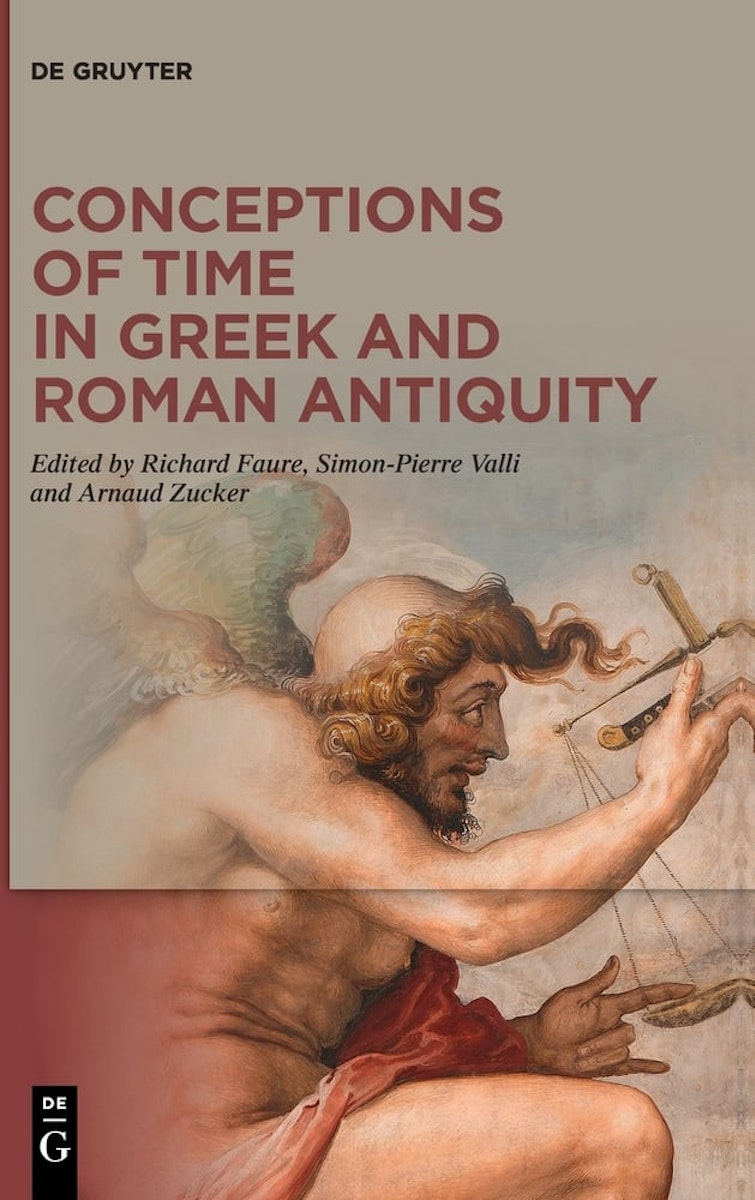
For over two and a half millennia human beings have attempted to invent strategies to "discover" the truth of time, to determine whether time is infinite, whether eternity is the infinite duration of a continuous present, or whether it too rises and falls with the cycles of universal creation and destruction. Time-Fetishes recounts the history of a tradition that runs counter to the dominant tradition in Western metaphysics, which has sought to purify eternity of its temporal character. From the pre-Socratics to Ovid and Plotinus, and from Shakespeare to Hegel, Schelling, Nietzsche, Heidegger, and Derrida, Time-Fetishes traces the secret tradition of the idea of eternal recurrence and situates it as the grounding thought of Western philosophy and literature.
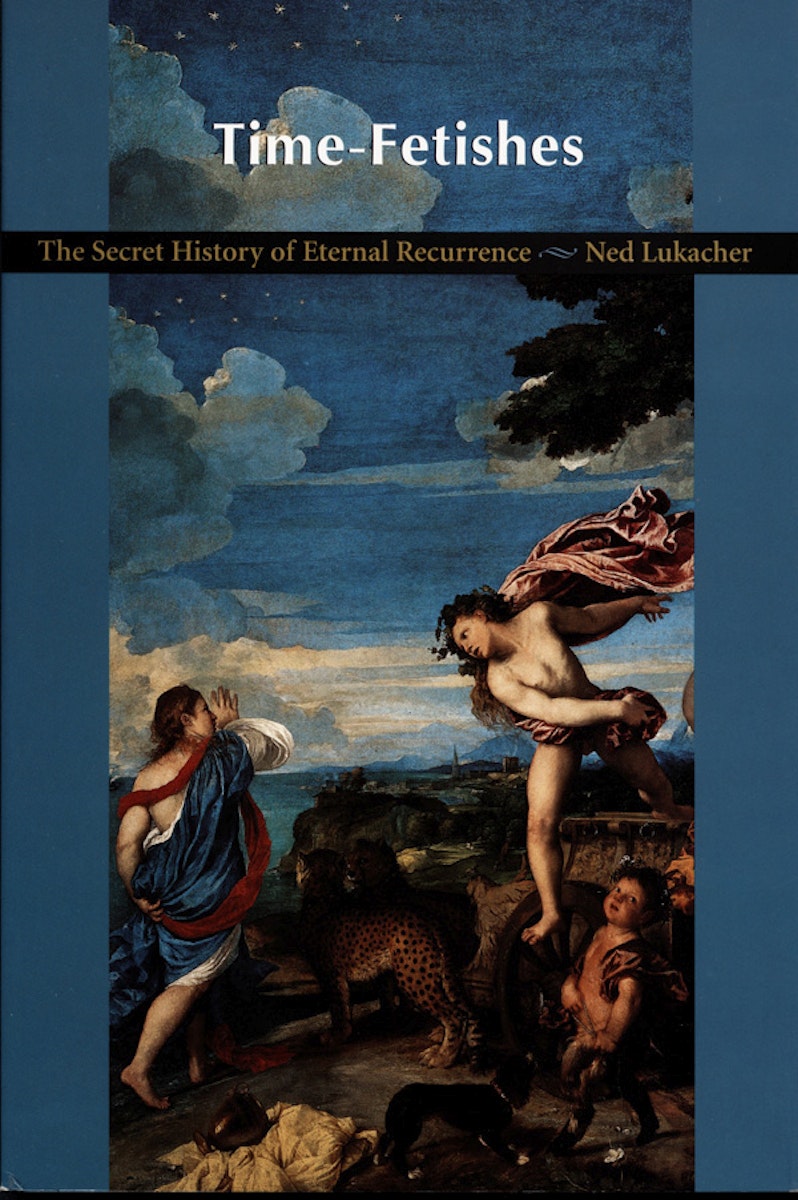
The Public Domain Review receives a small percentage commission from sales made via the links to Bookshop.org (10%) and Amazon (4.5%). Thanks for supporting the project! For more recommended books, see all our “ Further Reading ” books, and browse our dedicated Bookshop.org stores for US and UK readers.
Claire Hall is a research fellow at Durham and a fellow of All Souls College, Oxford. She is working on a book on ancient ideas about the future and future prediction, and has published on the history of prophecy, astrology, and dream interpretation.
The text of this essay is published under a CC BY-SA license, see here for details.
- Religion, Myth & Legend
If You Liked This…

Get Our Newsletter
Our latest content, your inbox, every fortnight

Prints for Your Walls
Explore our selection of fine art prints, all custom made to the highest standards, framed or unframed, and shipped to your door.
Start Exploring

{{ $localize("payment.title") }}
{{ $localize('payment.no_payment') }}
Pay by Credit Card
Pay with PayPal
{{ $localize('cart.summary') }}
Click for Delivery Estimates
Sorry, we cannot ship to P.O. Boxes.
- Do Not Sell My Personal Info

- ⋅
16 Free Title Generator Tools For Writing Better Headlines
Discover the power of engaging headlines with free title generator tools. Write catchy, concise, and SEO-friendly headlines to capture attention and increase clicks.

With audiences scrolling through content so quickly (on both search engines and social), an engaging headline is the first – and sometimes only – chance you have to capture their attention and get them to your webpage.
I’ll admit it: When it comes to consuming online content, I’m typically just scrolling and skimming rather than reading everything I see – and chances are that you are, too .
This habit has become commonplace, given the vast amount of information and content we encounter daily.
A strong headline can make the difference between a scroll-past and a click.
Luckily, there are an array of free tools designed to craft headlines that are not only succinct and engaging but also optimized for clicks and SEO .
In this guide, we’ll highlight the top free tools for generating effective titles and headlines, ensuring your content stands out and gets the attention it deserves.
Why Should You Use Free Headline Generator Tools?
You should never underestimate the power of a compelling headline.
The headlines you use for your blog posts and webpages are crucial in attracting clicks from search engine results pages (SERPs) and even social media platforms.
If your content marketing efforts are underperforming, weak headlines could be to blame.
Thankfully, title generator tools exist to help you craft engaging headlines – and many of them are free (like those listed in this article). These tools leverage algorithms to construct headlines that align with time-tested copywriting techniques and proven performance trends across various marketing channels.
While they’re not perfect, leveraging these tools to help you create stronger headlines can ensure your content stands out and drive more traffic to your owned properties.
But Are They Effective?
Absolutely, with some important caveats.
Generally, tools like these are great at generating compelling headlines, but they all have their constraints – some more than others.
Given that they’re free tools, they’re working with very limited information, and it’s worth keeping that in mind. You shouldn’t expect them to come up with headlines that satisfy the latest SEO trends, nor will they always nail your brand’s tone of voice and unique perspective.
Instead, you should use them as a jumping-off point while also maintaining a focus on your audience’s preferences and needs. Integrating your unique insights, along with your own keyword research and SEO findings, will help you get the most out of these tools.
16 Free Title Generator Tools To Help You Write Better Headlines
Without further ado, let’s explore the top free title generators for writing better headlines.
For consistency, I’ll be using the topics of “budget travel” and “budget travel tips and tricks” as my topic to generate examples across all of these tools.
Let’s dive in!
1. HubSpot: Blog Ideas Generator
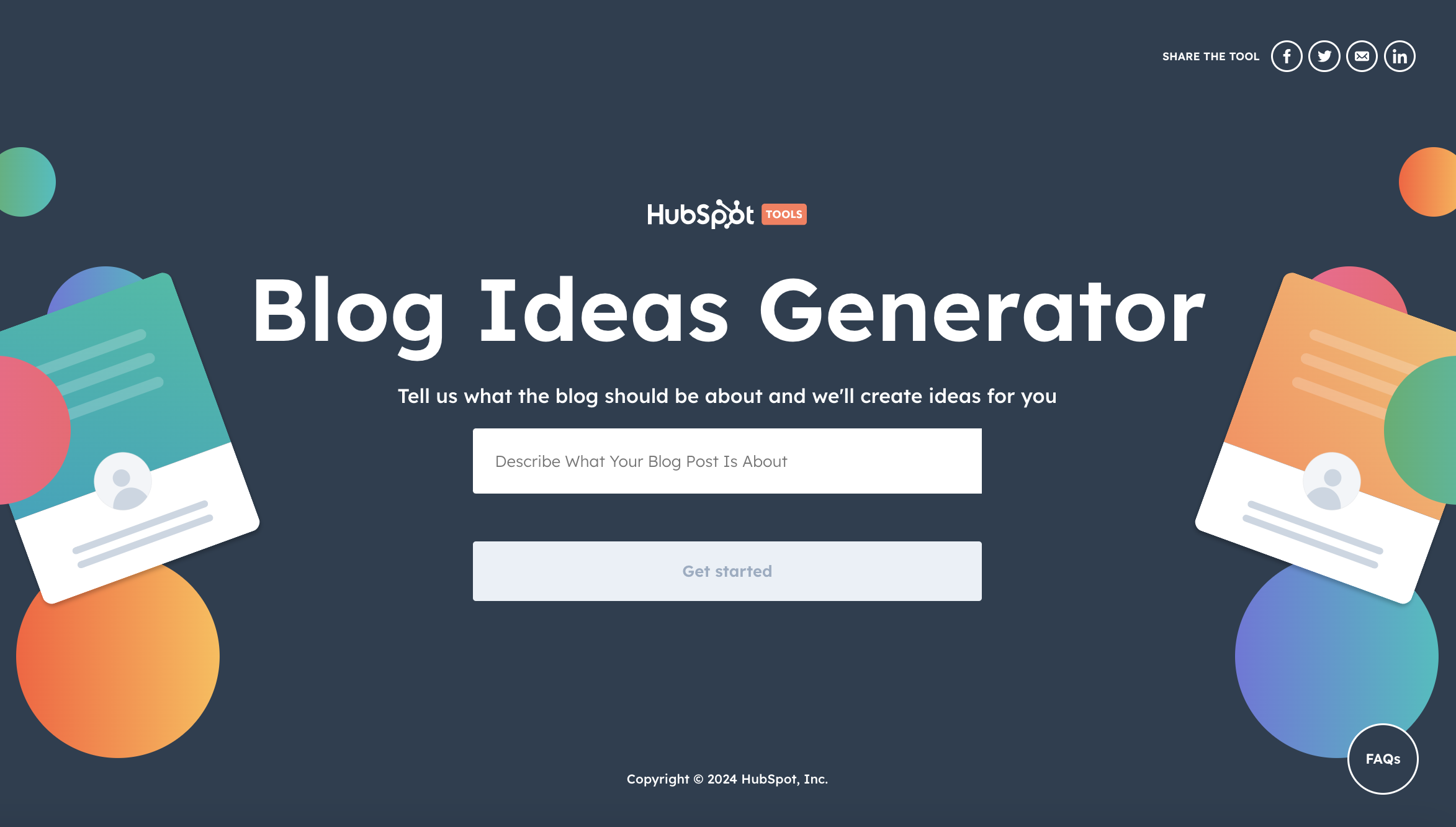
The Blog Ideas Generator from HubSpot stands out as a top-tier resource for coming up with powerful blog post concepts and titles.
It can even generate a sample article based on your selected headline if you’re in the market for that – but for our purposes, we’ll focus on the title generation aspect.
All you need to do is tell the tool what your blog post is about, and it provides you with a list of five headline ideas to choose from.
HubSpot’s tool leverages Semrush search volume insights and the power of AI to create headlines that are attention-grabbing, strategic, and designed to garner traffic and engagement.
Under each headline, the tool will display the keywords it used to generate the title.
If you gravitate towards one specific keyword set, you can prompt the tool to generate an additional headline based on those keywords – up to 10 headlines with a free account.
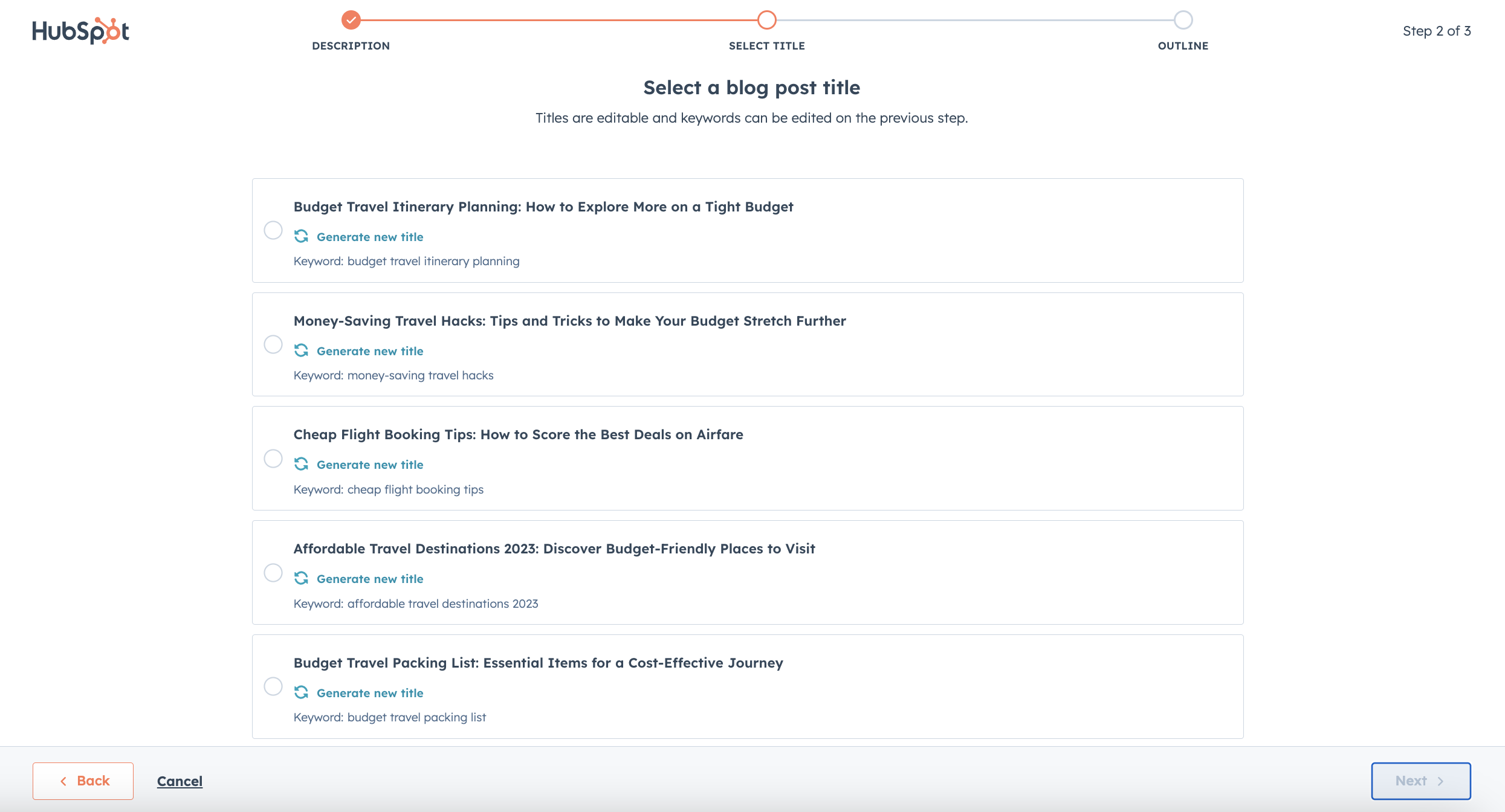
Based on the prompt “budget travel tips and tricks,” this tool came up with the following headlines, showing that it’s capable of exploring different facets of a topic and associated keywords to come up with catchy headlines:
- Budget Travel Itinerary Planning: How To Explore More On A Tight Budget.
- Money-Saving Travel Hacks: Tips And Tricks To Make Your Budget Stretch Further.
- Cheap Flight Booking Tips: How To Score The Best Deals On Airfare.
- Affordable Travel Destinations 2023: Discover Budget-Friendly Places To Visit.
- Budget Travel Packing List: Essential Items For A Cost-Effective Journey.
As we touched on above, you can even select a headline you like and have the tool generate a sample blog post within the HubSpot CMS.
A notable con of HubSpot’s Blog Ideas Generator is that you must sign up for a HubSpot account to access it. However, the tool is 100% free and incredibly easy to use.
2. The HOTH: Title Generator
The HOTH’s free Title Generator is a great tool for crafting SEO-focused headlines aimed at maximizing click-through rates.
The tool asks you to enter details on five different components that go into creating an effective title:
- Relevant content keywords.
- Desired outcome your audience might be searching for.
- Common problems for your target audience or industry.
- Your industry.
- Your target audience .
It then uses the details you provide to come up with a list of 10 headline concepts. Here is what it provided me based on my inputs:
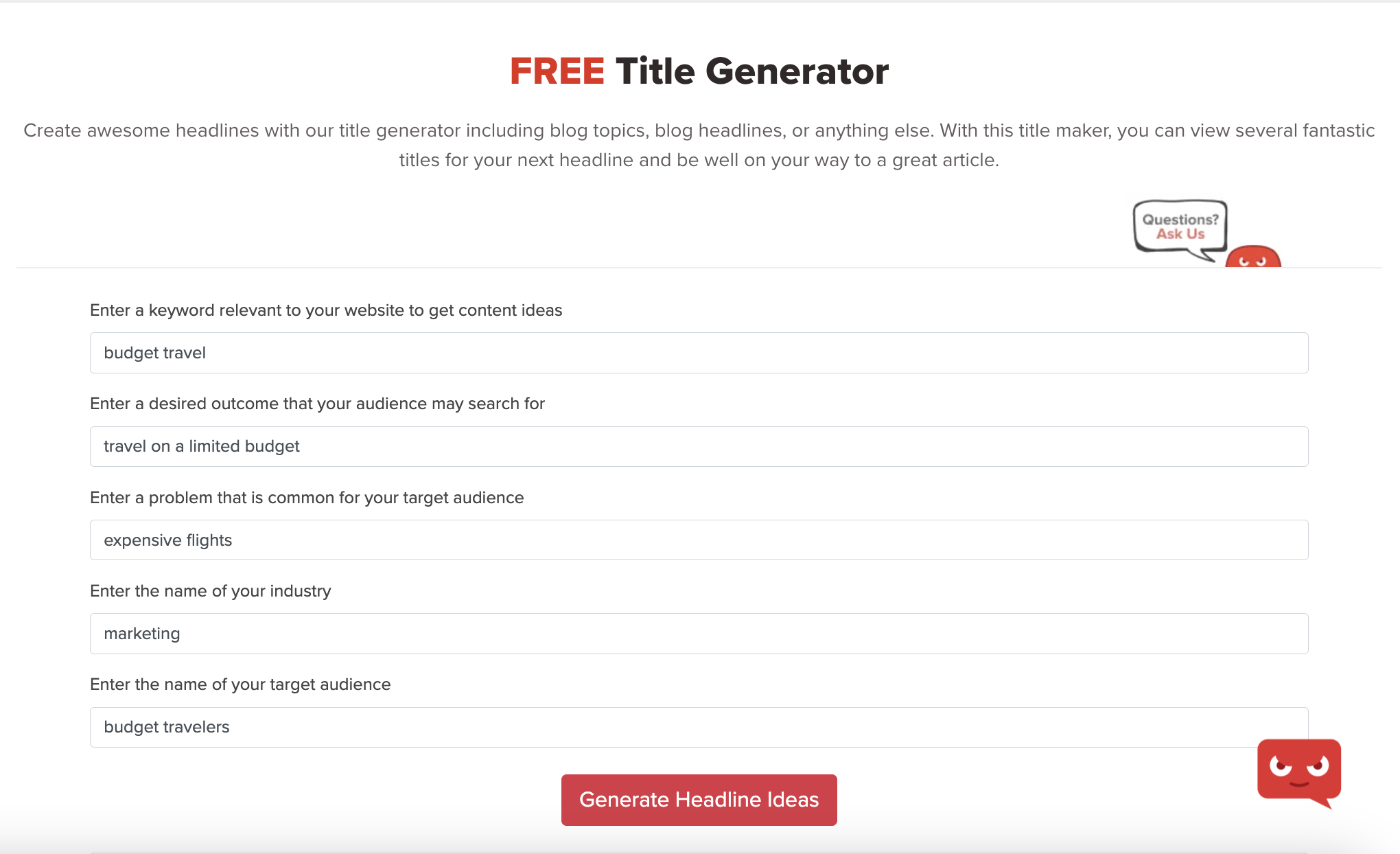
As you can see, some headlines are stronger than others, but it’s a great starting point for jogging your brain and getting creative juices flowing.
It seems to tend toward listicle ideas and more formulaic headlines, which could be a pro or a con depending on your audience and goals.
If you don’t like any of your headline suggestions, you can prompt it to generate more ideas – it’s always completely free.
3. SEOPressor: Blog Title Generator
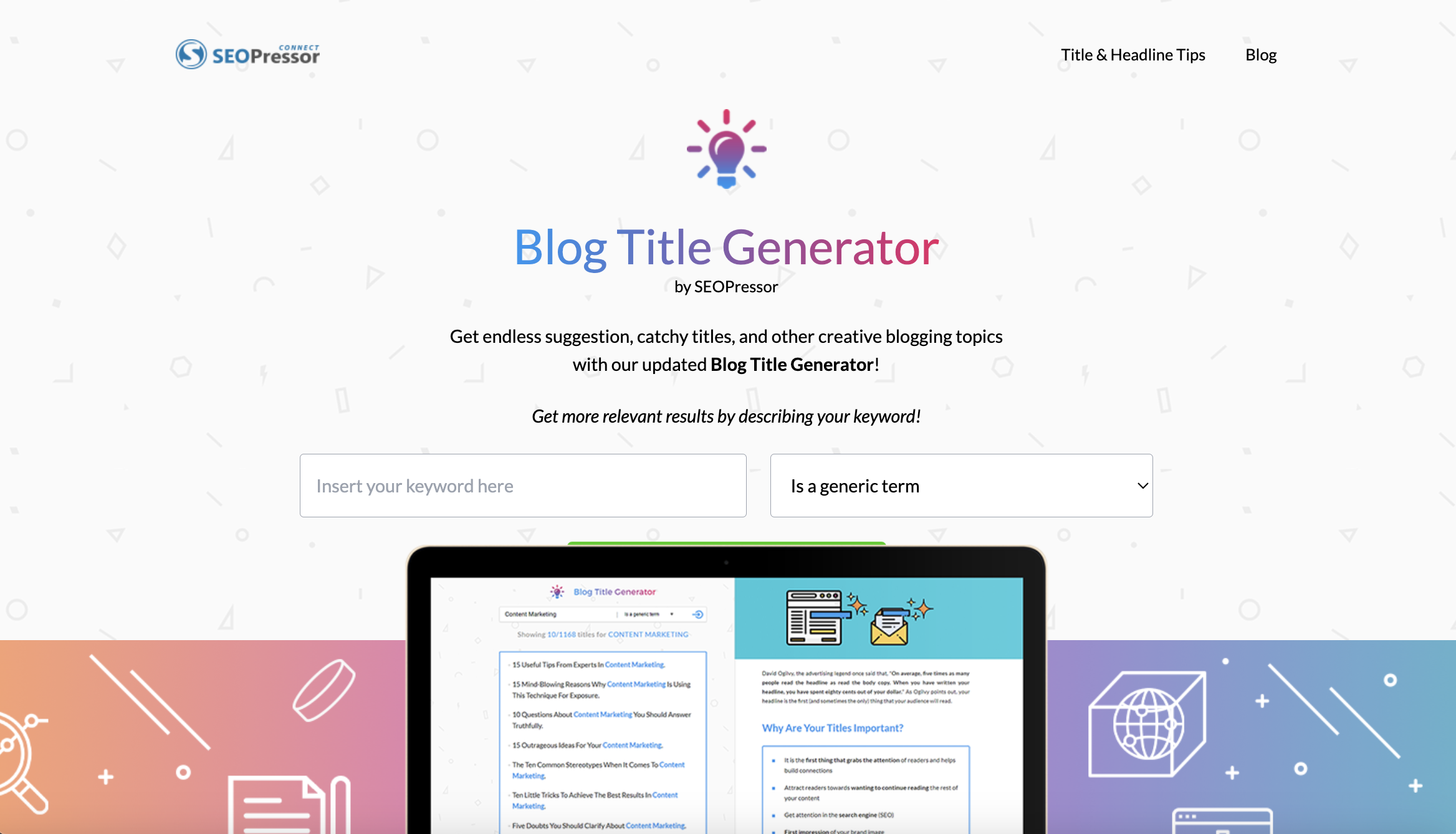
The Blog Title Generator by SEOPressor takes a more specific approach to headline creation by having you outline what type of keyword you’re using.
So, you enter your target keyword and then use the provided dropdown to confirm whether it’s:
- A generic term.
- A brand/product.
- An industry.
- A location.
- A person’s name.
Then, SEOPressor will suggest a list of related headlines for you.
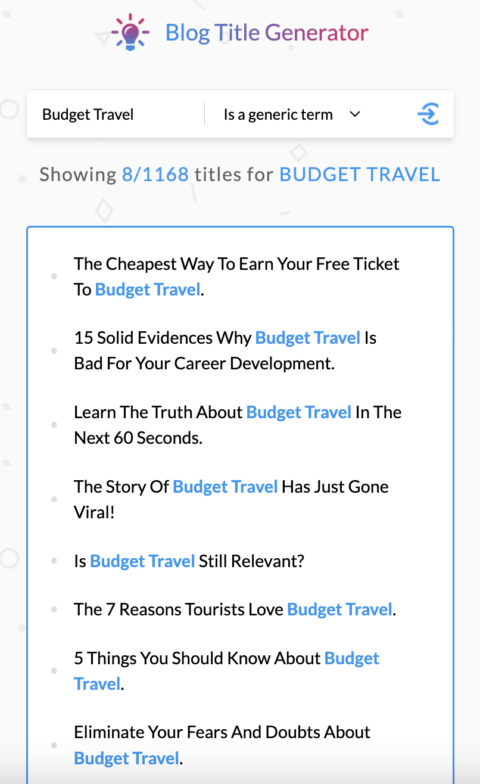
While the tool is easy to use and takes SEO into consideration, the headlines can be a bit generic and straightforward. Some examples I received for the terms “budget travel” and “budget travel tips and tricks” included:
- 5 Secrets About Budget Travel That Has Never Been Revealed For The Past 50 Years.
- 7 Common Misconceptions About Budget Travel Tips And Tricks.
- 10 Things You Probably Didn’t Know About Budget Travel Tips And Tricks.
- Master The Skills Of Budget Travel And Be Successful.
It’s clear that the tool just inputs the term into tried-and-true headline formulas for that particular keyword type rather than customizing them – so, depending on your topic, it might take a bit of extra time and legwork to perfect them.
While the tool is free, it will ask for your email address after three regenerations. Also, be aware that the site is heavier on the ads than many other tools here.
4. Portent: Content Idea Generator
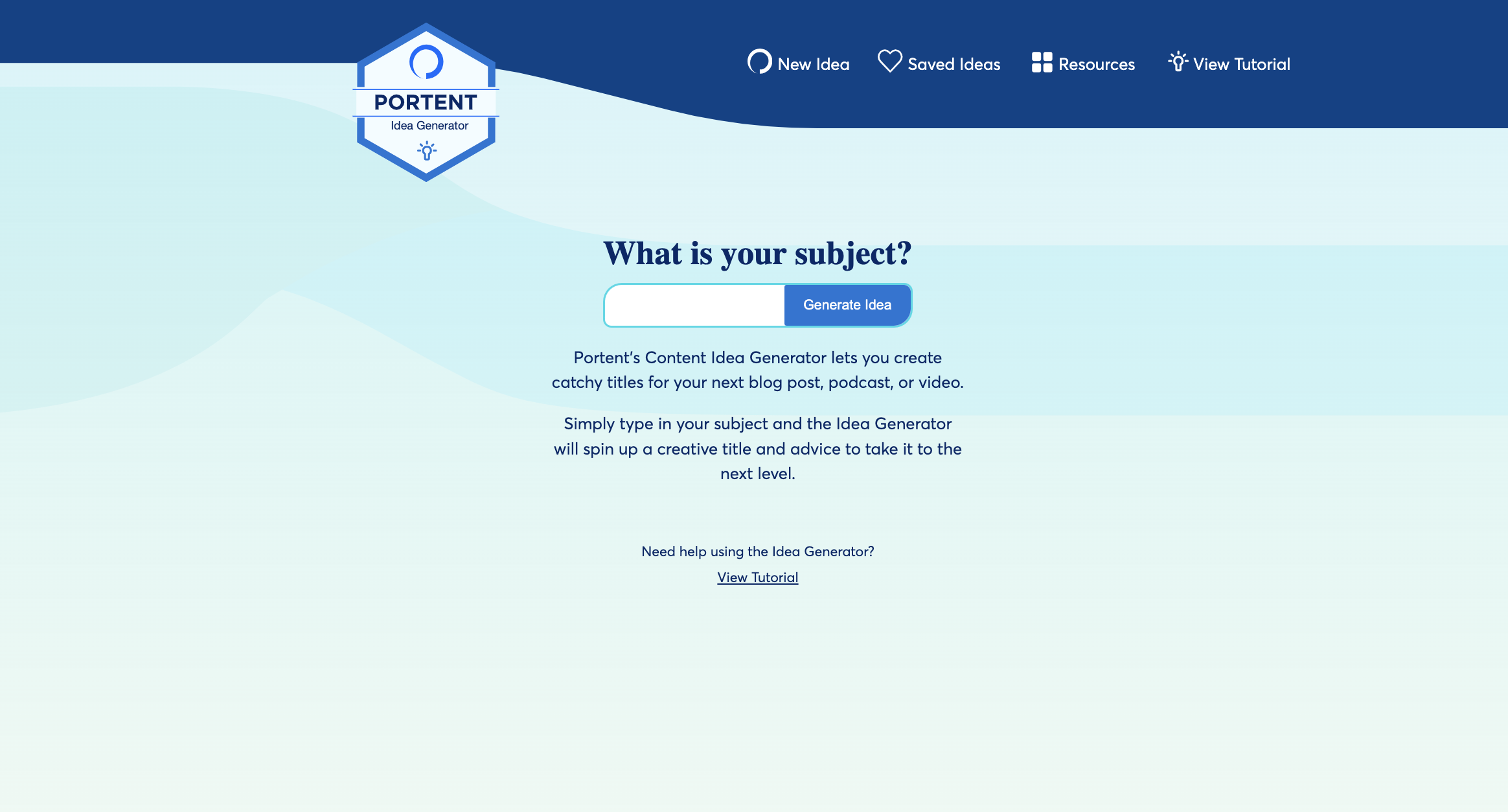
Portent’s Content Idea Generator stands out as another popular choice for those seeking inspiration when it comes to headlines and ideas.
It provides a range of topics for use across various content formats, giving you multiple headline options to choose from.
You simply enter your subject and prompt the tool to generate a headline. It provides one title at a time, and for each, you have the option to save the idea, tweet it, see a new title, or change your subject altogether.
The interesting thing about Portent’s tool is that it allows you to click on different words or phrases from the suggested headline to learn more about why it was included and how it can help your content perform.
In that regard, it’s helpful to learn what makes a headline engaging and clickable.
However, its tone is particularly quirky, and the suggestions might not always align with those looking for more professional or serious content. Some of the headlines it suggested to me:
- When Budget Travel Tips And Tricks Send You Running For Cover.
- Why Budget Travel Is The Key To Winning The Presidential Election.
- How To Build An Empire With Budget Travel.
- How Budget Travel Could Help You Win The Game of Thrones.
Nobody can say they’re not entertaining!
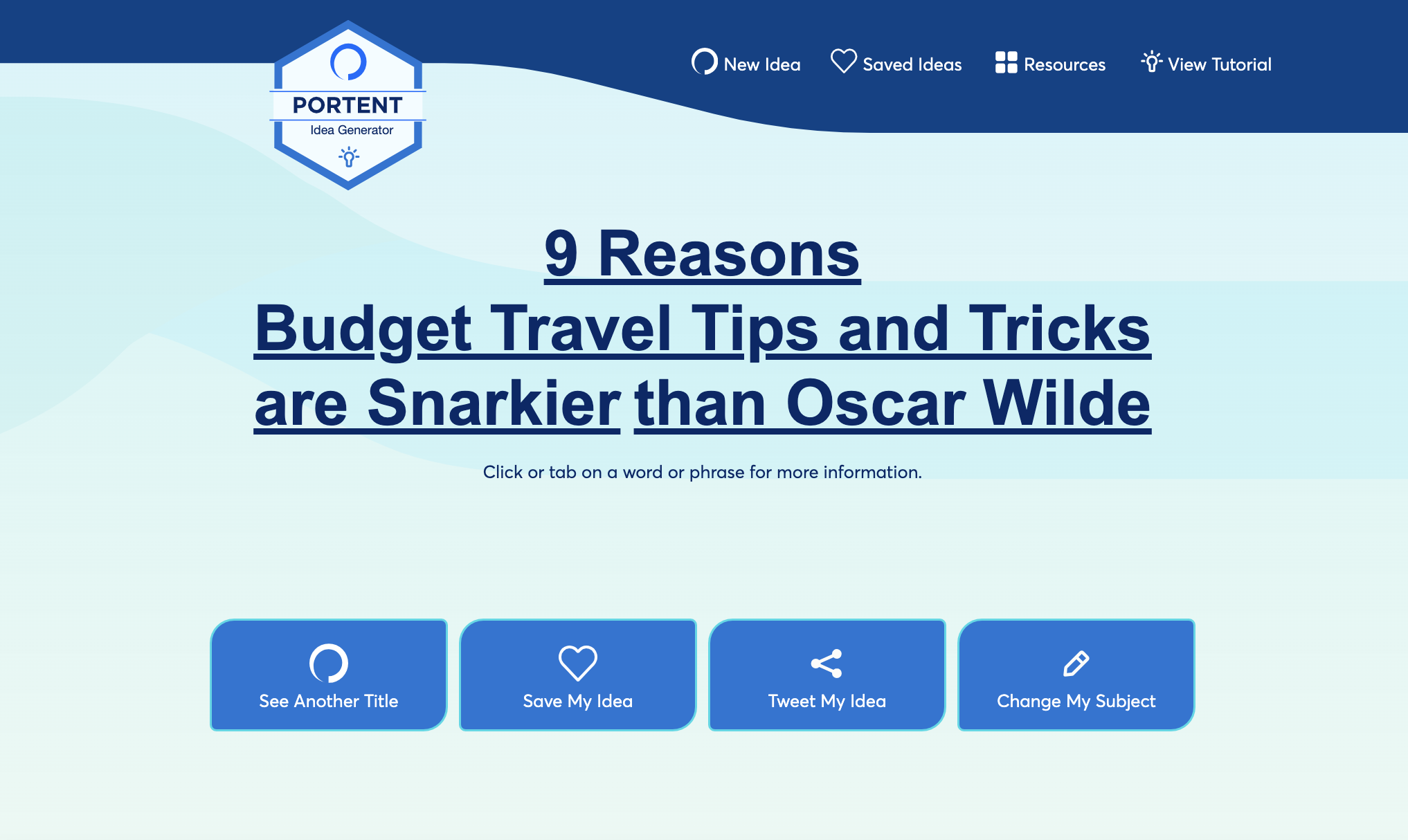
5. Easy-Peasy.AI: Headline Generator
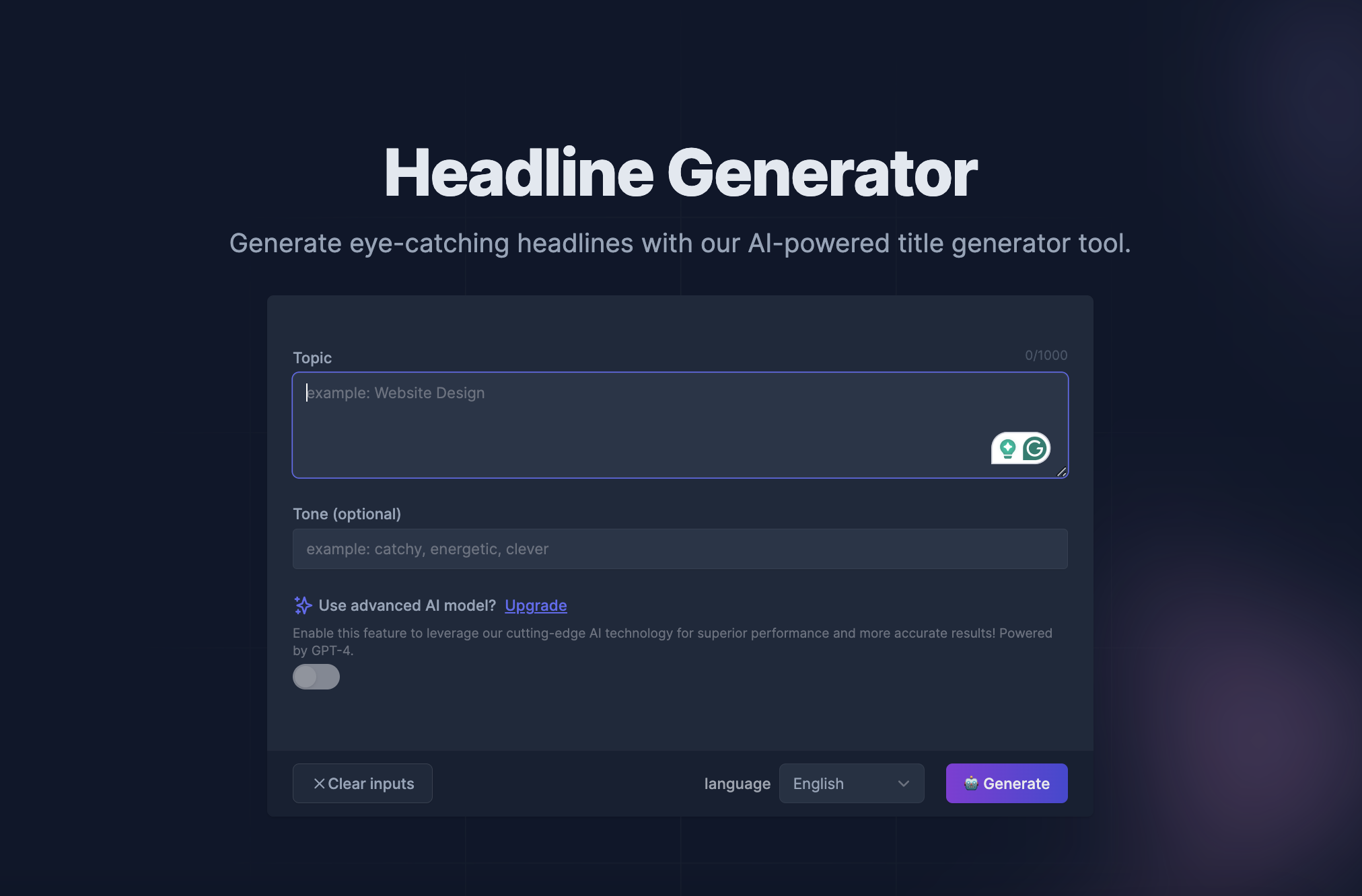
Easy-Peasy.AI (formerly Content Row) features an AI-powered Headline Generator that excels in producing a wide array of headline ideas across content types.
To use it, you just input your topic and your tone (optional) and click “Generate.”
The tool spits out 20 headlines in four different categories: guides & how-tos, questions, listicles, and others. That’s five headlines for each category.
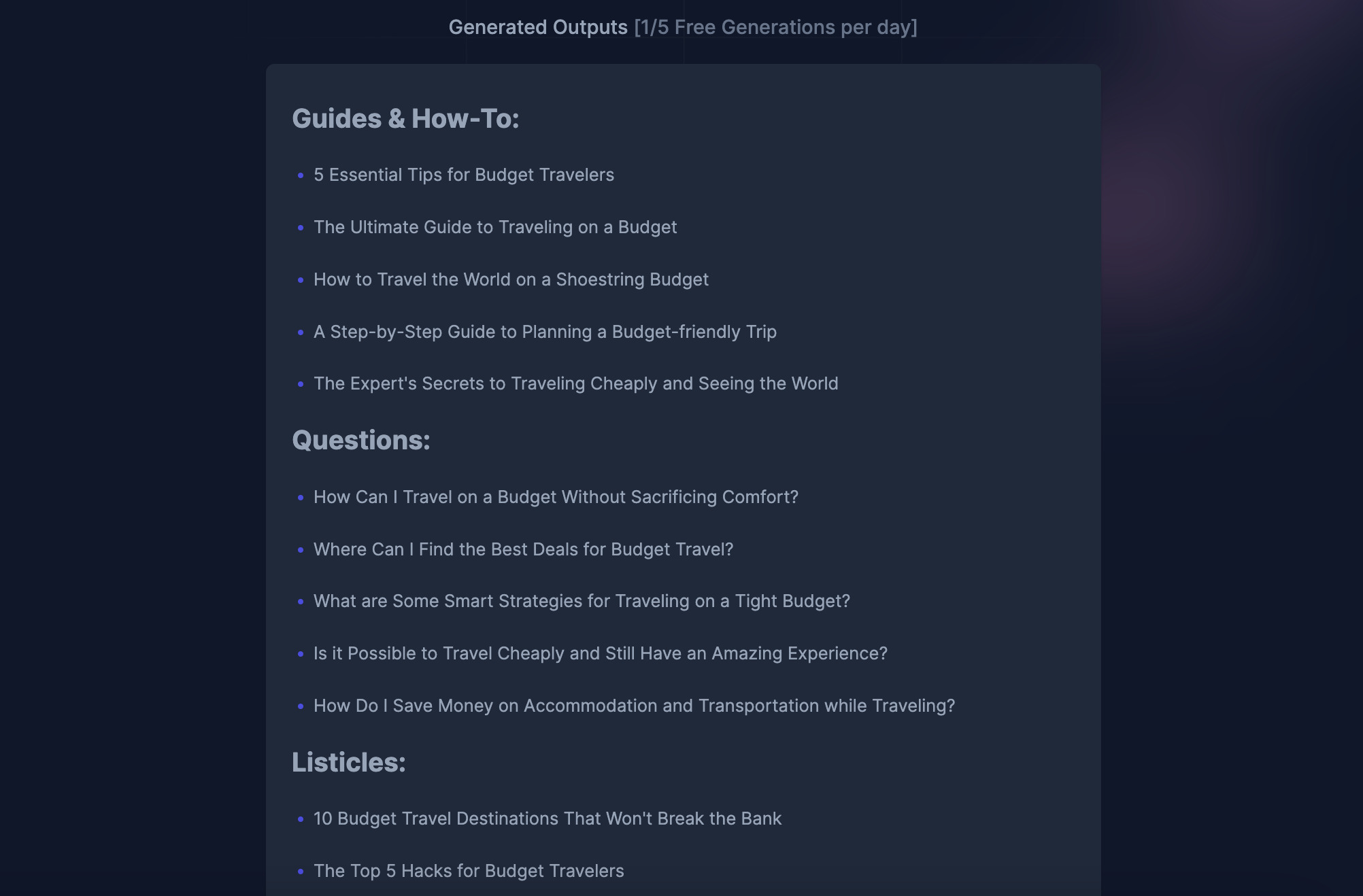
I liked the variety the tool provided, which made the headlines more specific. The suggestions I received felt more thoughtful and valuable than some of the other tools. Some examples of headlines it generated for my topic:
- How To Travel The World On A Shoestring Budget.
- How Can I Travel On A Budget Without Sacrificing Comfort?
- 7 Must-Have Apps For Traveling On A Budget.
- The Hidden Benefits Of Budget Travel – More Than Just Saving Money!
With five free rounds of generations a day and 40+ languages supported, this tool is a wonderful starting point for your headline ideation.
6. Tweak Your Biz: Title Generator
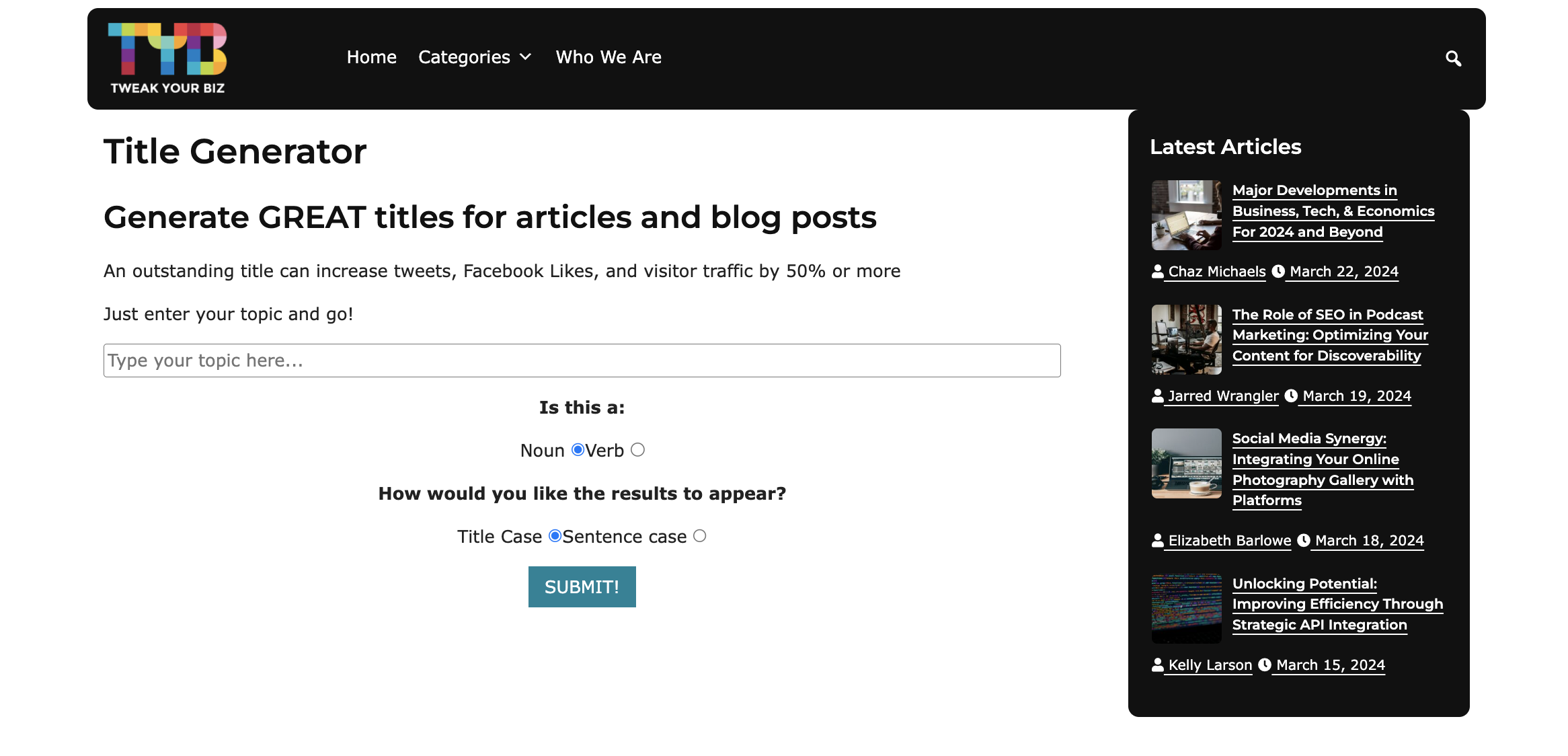
The Title Generator by Tweak Your Biz is yet another impressive free tool for generating headlines.
Input your topic, identify whether it’s a noun or a verb, and let the tool know whether you want the results in title or sentence case.
Click submit, and the tool will serve you a long list of headline concepts, separated by categories that include lists, best, how-to, questions, business, snark, motivation, and more.
The upside here is that you get a ton of different content title suggestions – and that also feels like the downside. While the array of choices is great, the sheer volume of titles can be time-consuming to sort through.
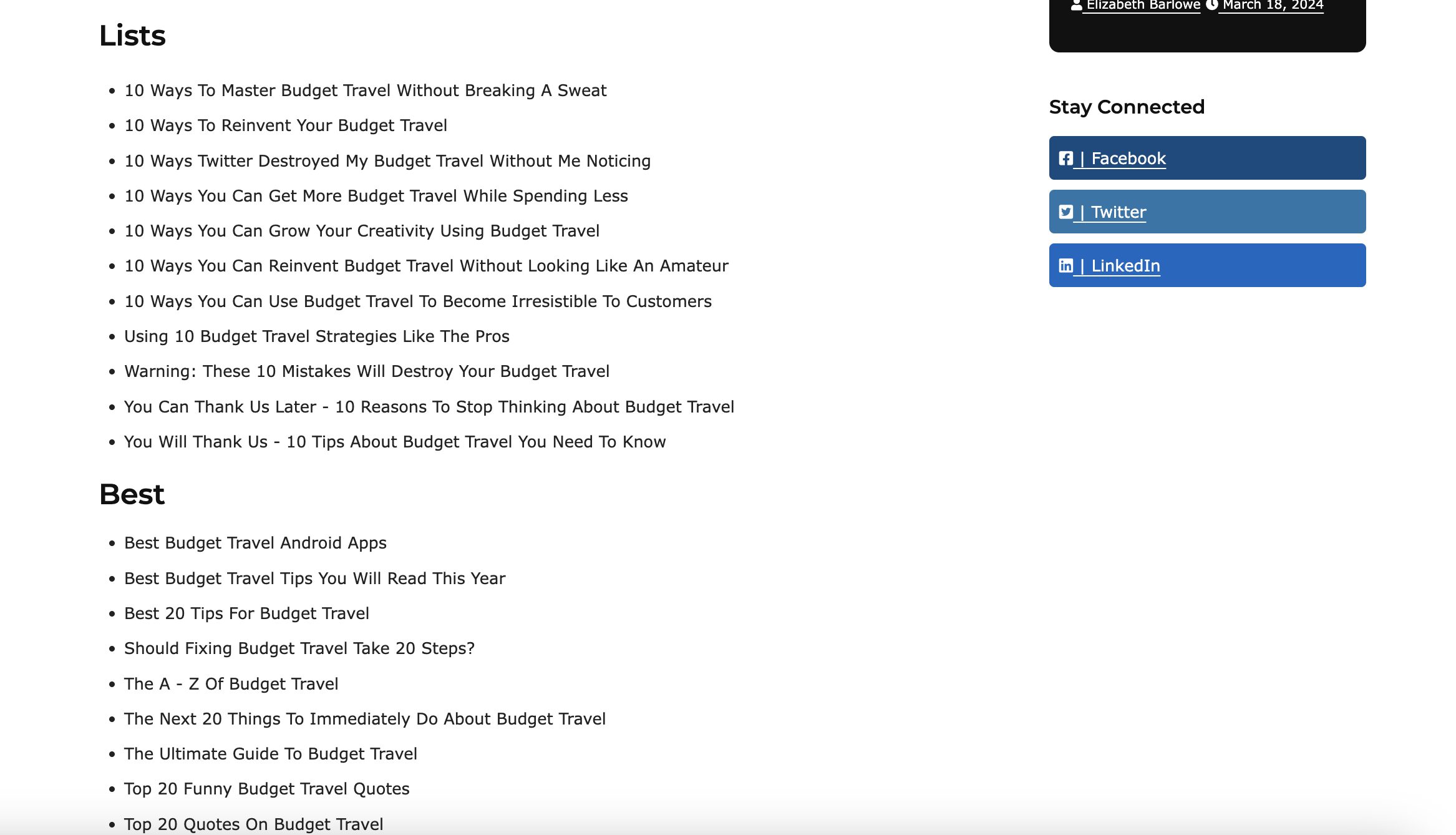
Also, the formulaic approach can lead to a lot of headlines that aren’t useful for your purposes. For example, I didn’t need a section on “celebrities” (believe it or not, I’m not in a rush to write “Genghis Khan’s Guide To Budget Travel Excellence”).
Other headlines it suggested for me included:
- Master The Art Of Budget Travel With These 10 Tips.
- Best 20 Tips For Budget Travel.
- How To Earn $1,000,000 Using Budget Travel.
- Shhhh… Listen! Do You Hear The Sound Of Budget Travel?
- 10 Ways Budget Travel Can Drive You Bankrupt – Fast!
If you’re starting with a blank slate and looking to come up with as many ideas as possible – or just get some inspiration – this is a great resource.
7. CoSchedule: Headline Analyzer
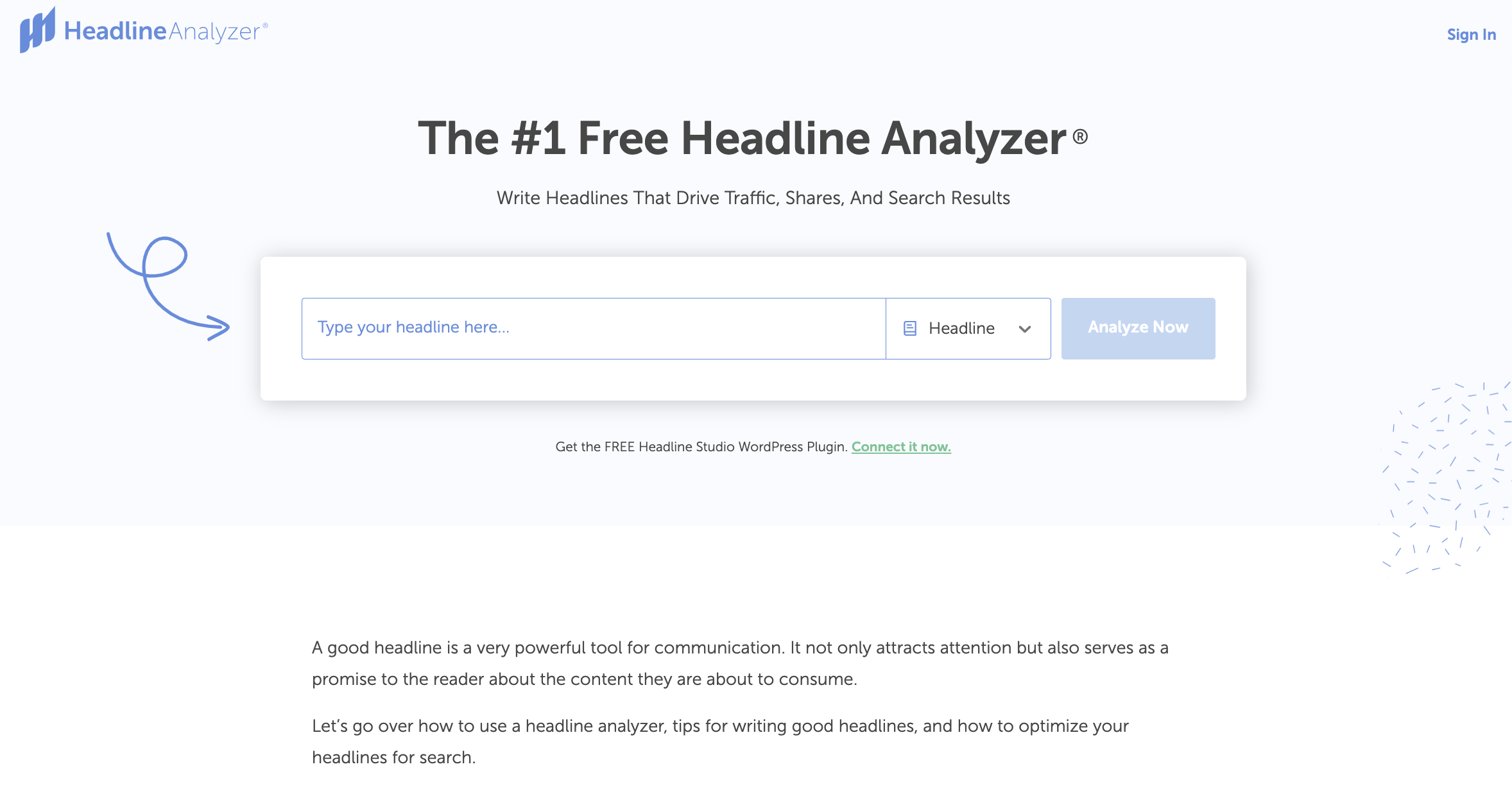
The Headline Analyzer from CoSchedule offers actionable insights about what makes a successful headline by analyzing your headlines and telling you what works (and what doesn’t).
The tool evaluates your headline based on factors like word balance, headline type, sentiment, clarity, skimmability, word count, character count, and more.
It gives your headline an overall score out of 100, as well as an SEO score based on details like keyword quality and density, search competition, average monthly searches, and more.
The two screenshots below show my headline score and SEO score, respectively, when using a headline suggested to me by HubSpot’s tool (earlier in this article):
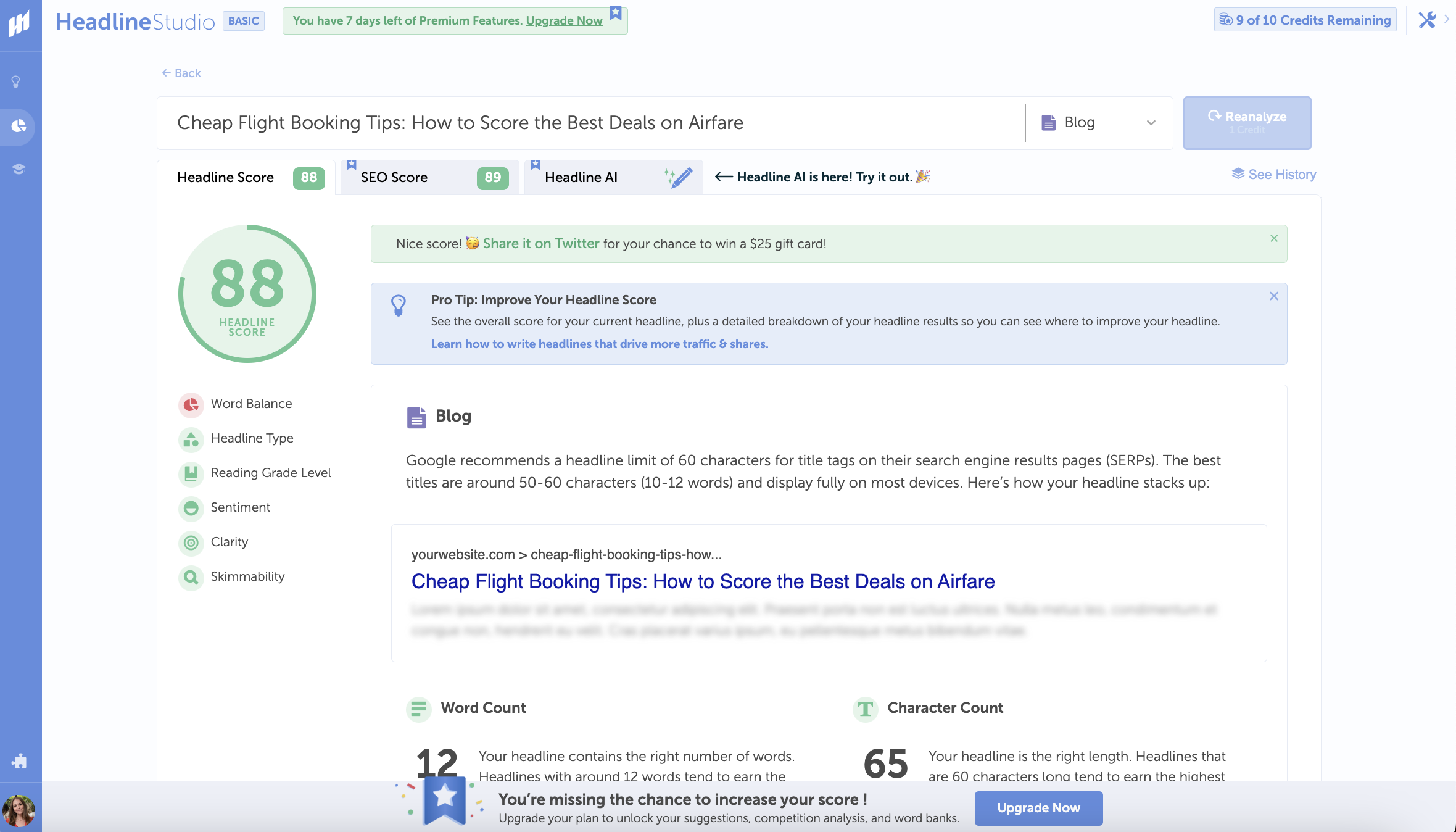
While not a typical headline generator, CoSchedule’s tool provides valuable insights into headline effectiveness to help you ensure you’re optimizing your content for engagement and search rankings.
The only downsides are that you need to provide your own headline, and you’ll need to upgrade to a paid account for features like more monthly credits (you get 10 credits/searches each month with a free account) and to unlock additional features.
Overall, a powerful tool for testing your headlines.
8. SumoMe: Kickass Headline Generator
SumoMe’s Kickass Headline Generator helps you create headlines by having you input specific information based on the type of content you’re creating.
SumoMe has users choose from a list of predefined content categories to guide the headline creation process. It provides a few specific types of content to choose from:
- Numbered Lists.
- Explanatory/Why.
- Strong/Controversial.
- Fun/Playful.
- DIY Headline Formulas.
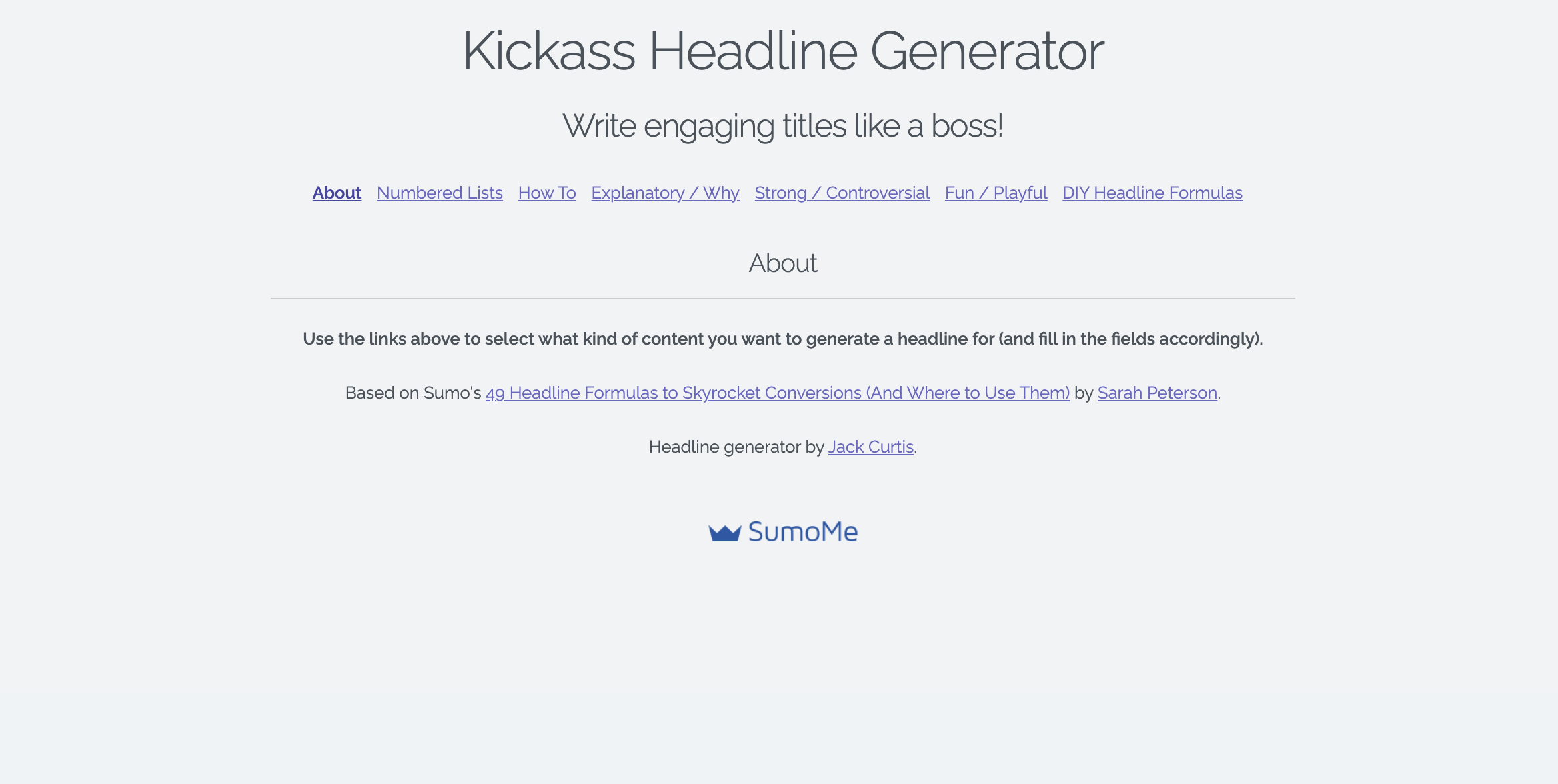
You simply select the content type you want, and the tool will prompt you to enter specific details based on that selection.
For example, the Numbered Lists section asks for your topic, a desirable and undesirable outcome for your audience, and how many list items you want in the article.
The How To section, on the other hand, asks for things like a time frame, a descriptive power word, and a biggest frustration to devise headlines.
The tool then uses pre-existing headline templates to suggest a list of possible titles for your content based on your information.
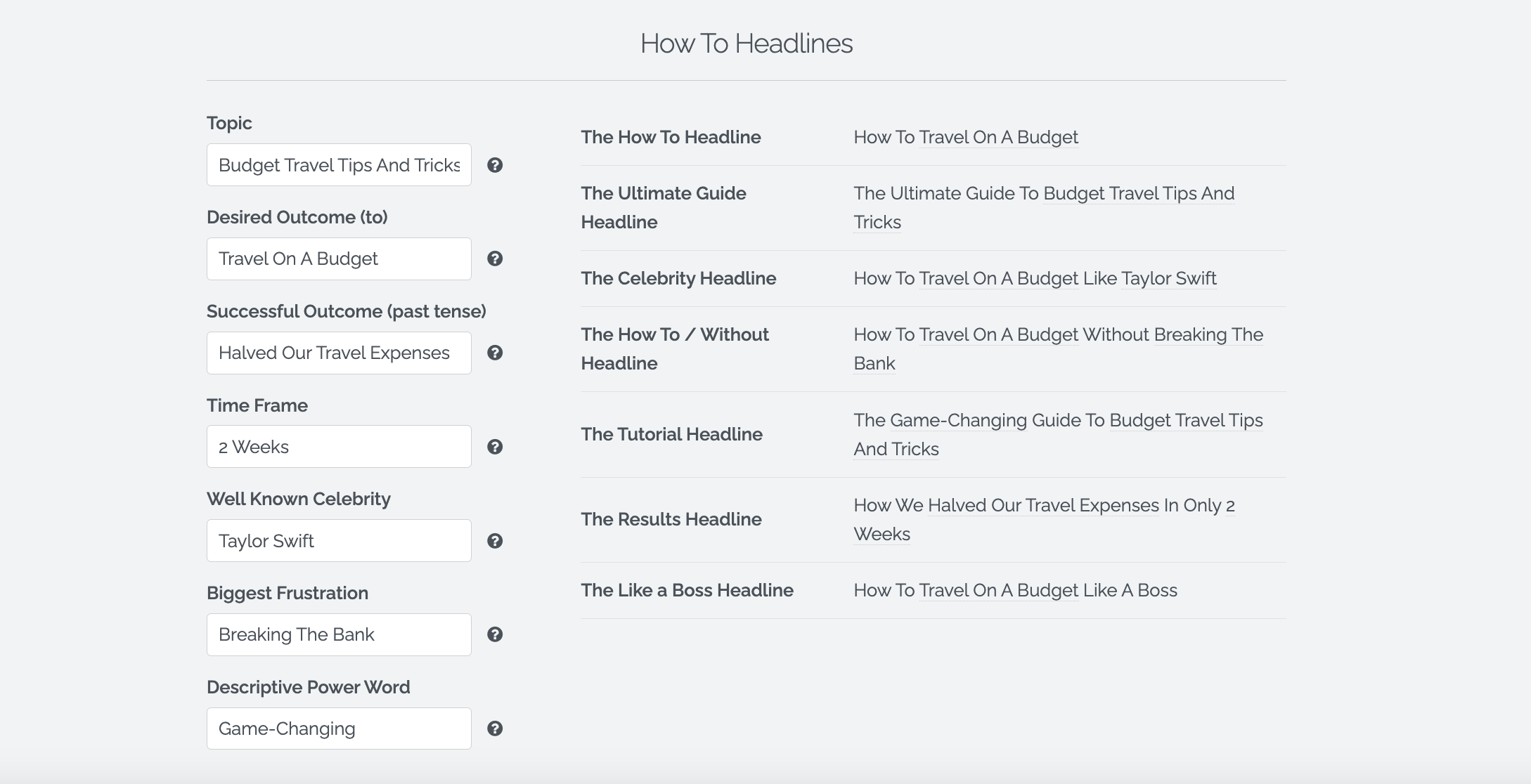
While this tool requires a little more work on the user’s end, it’s useful for understanding how different types of headlines come together. You can easily see how your inputs impact the suggestions and make tweaks, edits, and customizations as you see fit to reach your goals.
The reliance on templates means the tool is limited, but it’s straightforward and practical and a good option for those who know what they’d like to achieve.
9. Impact: Blog About
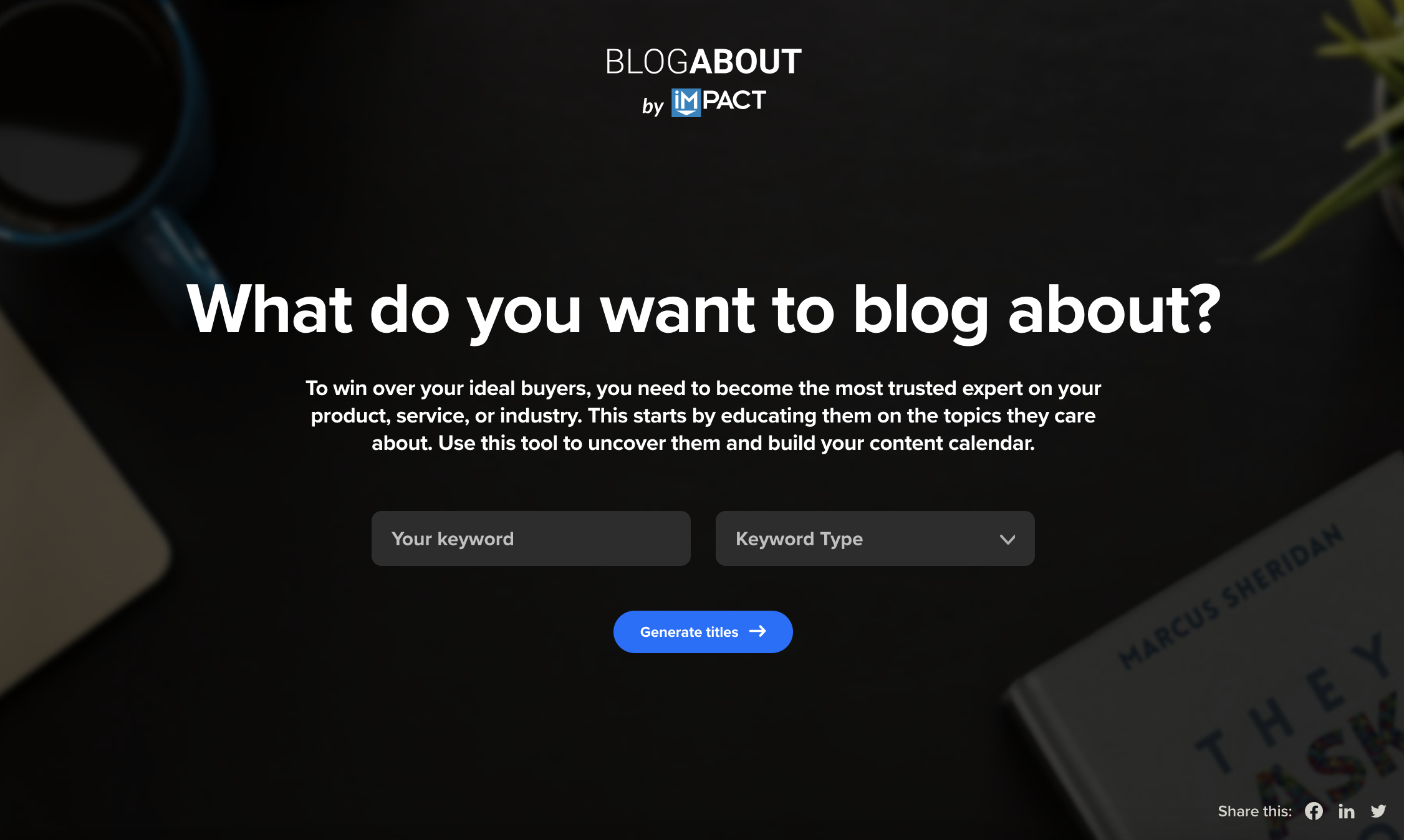
The BlogAbout tool by Impact is a sleek blog title generator that enables you to create headlines easily with a simple, user-friendly interface.
With its fill-in-the-blank approach, this tool is useful for generating blog-specific titles that can help spark creativity and refine your content direction.
You start by entering your keyword and then using a dropdown to identify whether the keyword is a product or service, a brand/business name, an industry, or something else.
From there, the tool will generate five headlines, one for each of these categories: cost, problems, comparisons, reviews, and best-in-class. You can see in the screenshot below how this looks for the “industry” keyword type.
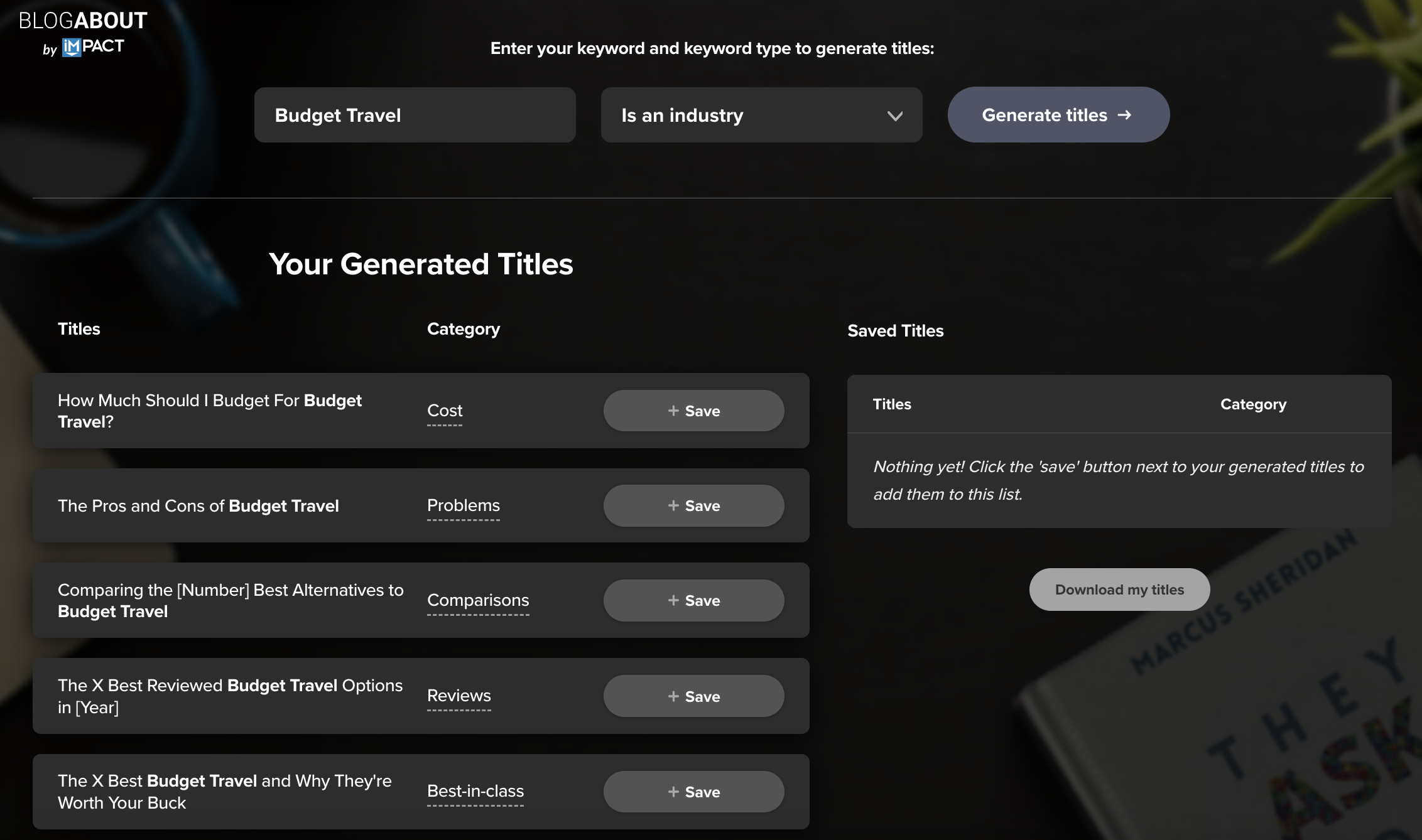
If you don’t like the headlines you receive, you can continue prompting the tool to generate more. You also have the option to save the titles you like and download them – though you’ll have to fill out a form to do the latter.
The great thing about the BlogAbout tool is the customization options, but the templated approach means it might not always work perfectly for you, depending on your keywords and topics.
10. Advanced Marketing Institute: Headline Analyzer
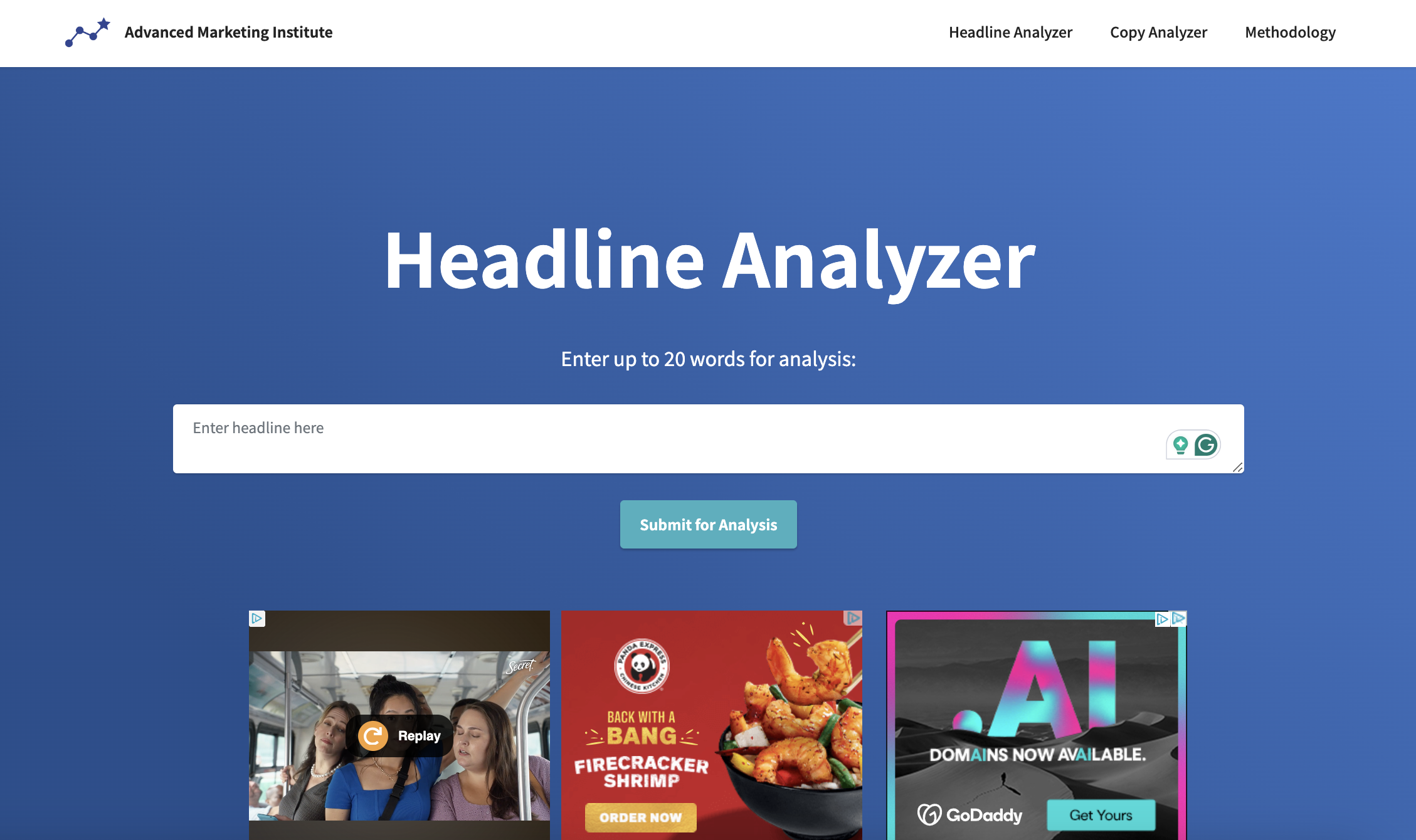
The Advanced Marketing Institute’s Headline Analyzer might sound complex, but it’s actually a straightforward and accessible tool that evaluates the emotional pull of your headlines.
This is another one where you need to come prepared with your own headline options for analysis rather than having the tool generate new content for you.
Once entered, the tool calculates the Emotional Marketing Value (EMV) of the headline, reflecting its potential to resonate with readers emotionally .
According to the Advanced Marketing Institute, the headline is “analyzed and scored based on the total number of EMV words it has in relation to the total number of words it contains.”
On top of that, you’ll also find out which of these three emotions the headline impacts most: intellectual, empathetic, or spiritual.
For my headline here, I used one of the options that Easy-Peasy.AI’s tool suggested to me, and here is what I received:
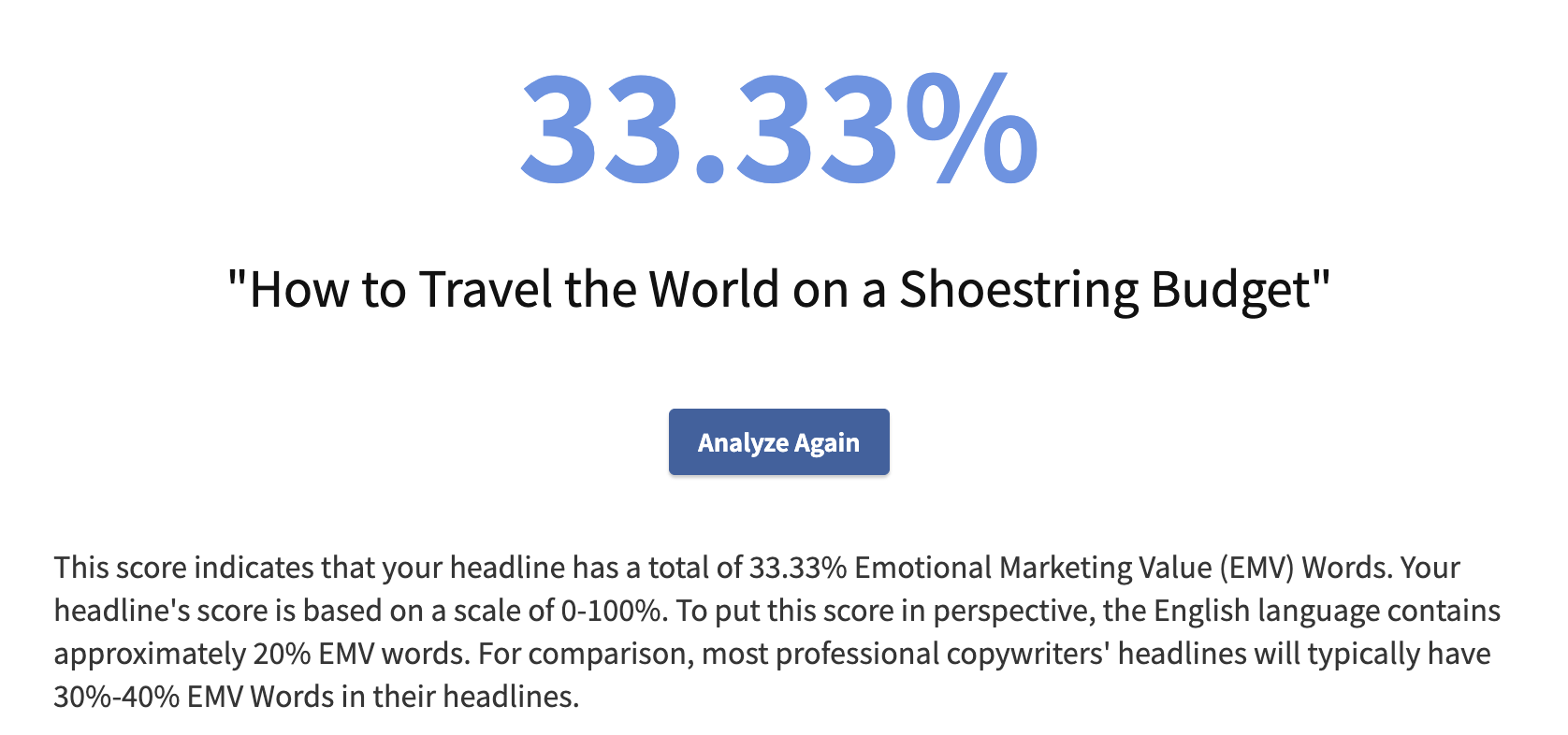
The tool also conveyed to me that the predominant emotion classification was Spiritual:
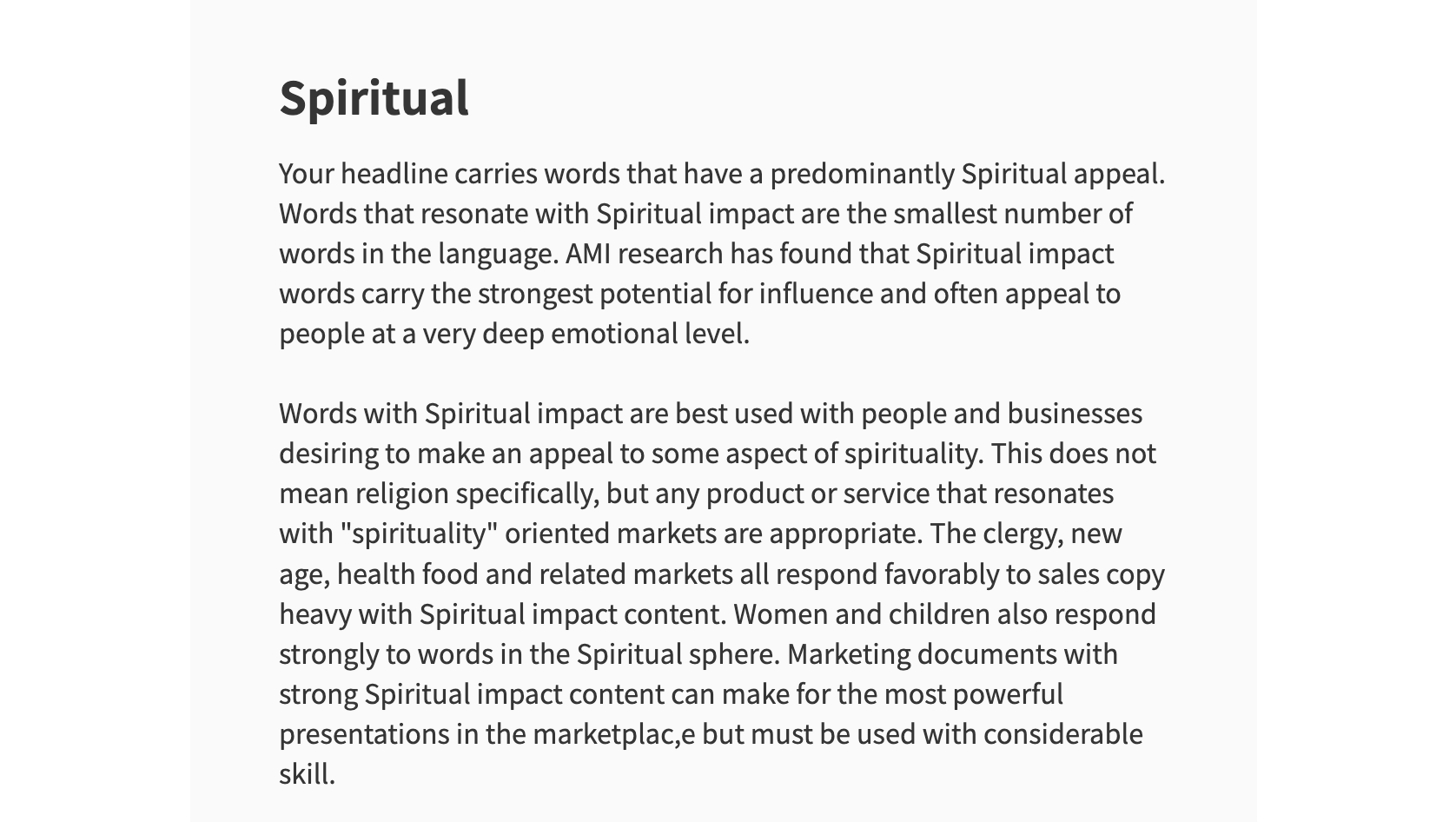
This is certainly a unique tool in that it helps you understand the emotional impact of your headlines and can thus give you tips on creating headlines with a psychological edge.
It’s always free and lets you input as many headlines as you’d like!
11. FATJOE: Blog Post Title Headline Generator
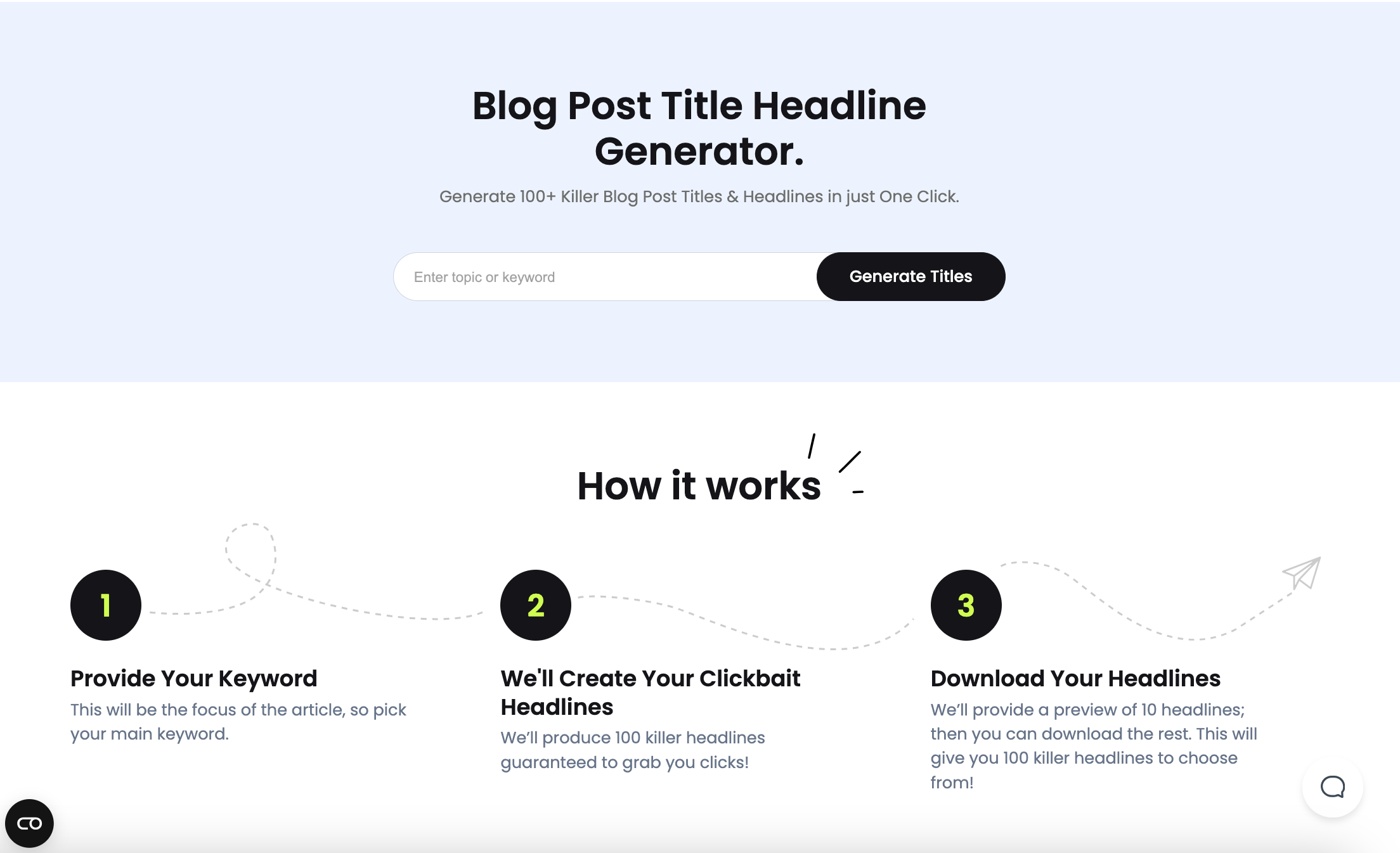
Looking to generate a ton of titles fast? Facing a creative block when titling your latest article or post? The Blog Post Title Headline Generator by FATJOE could be a good option for you.
Start by inputting a topic or keyword, and you’ll immediately receive 10 headline suggestions. If that’s not enough, you can sign up for free with your email address to download 100 more.
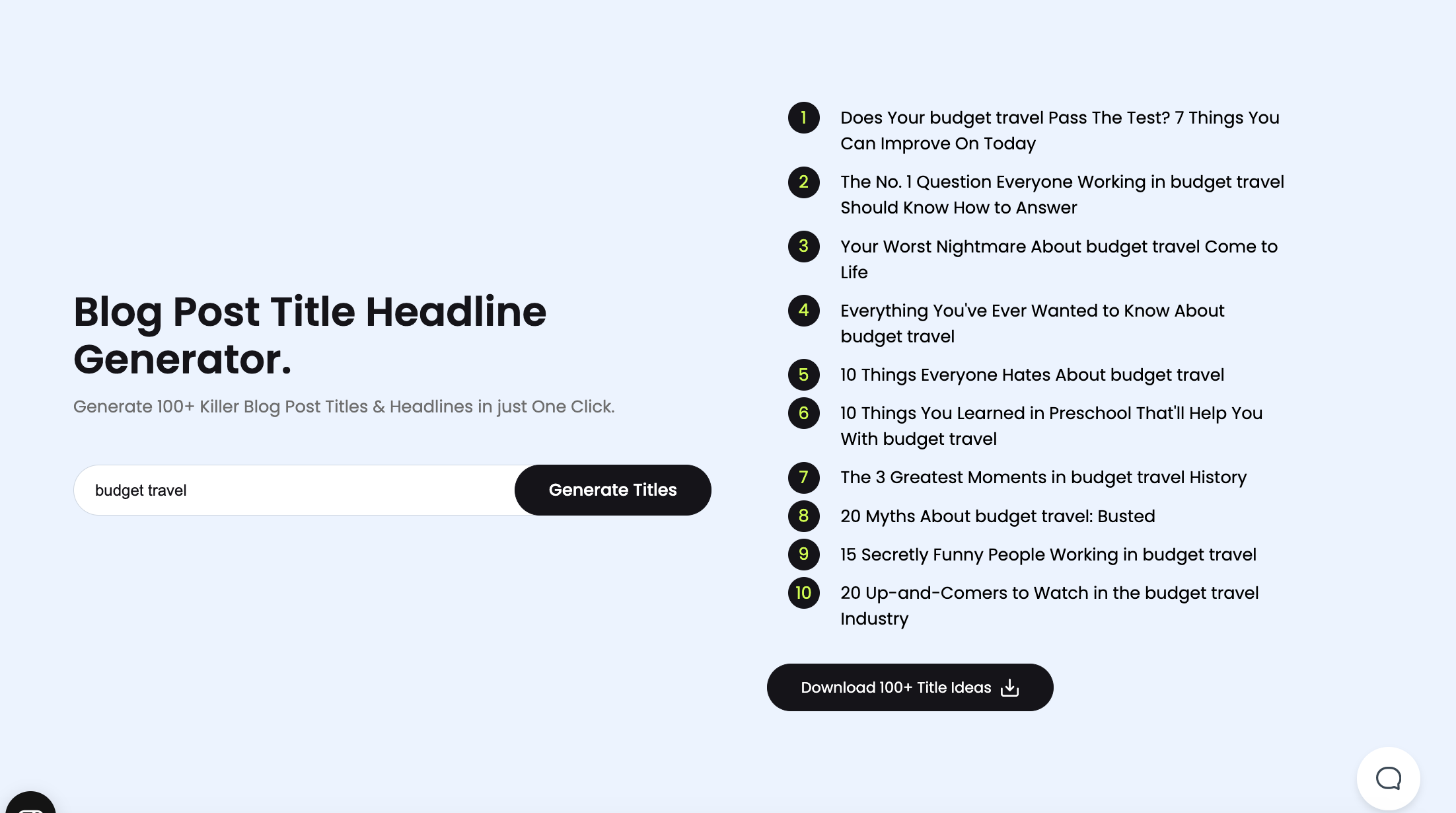
The suggestions are largely numbers/list-based titles that leverage a formulaic approach across different tones and styles. However, the quality can vary pretty drastically, so some of the results will likely be far less relevant to you than others.
It’s great for a quick and easy dose of creative inspiration, but will take manual filtering to find the gems.
As the company itself specifies, these are intended to be clickbait titles, so you should be aware of that going into it.
12. Copywriting Course: Title Generator
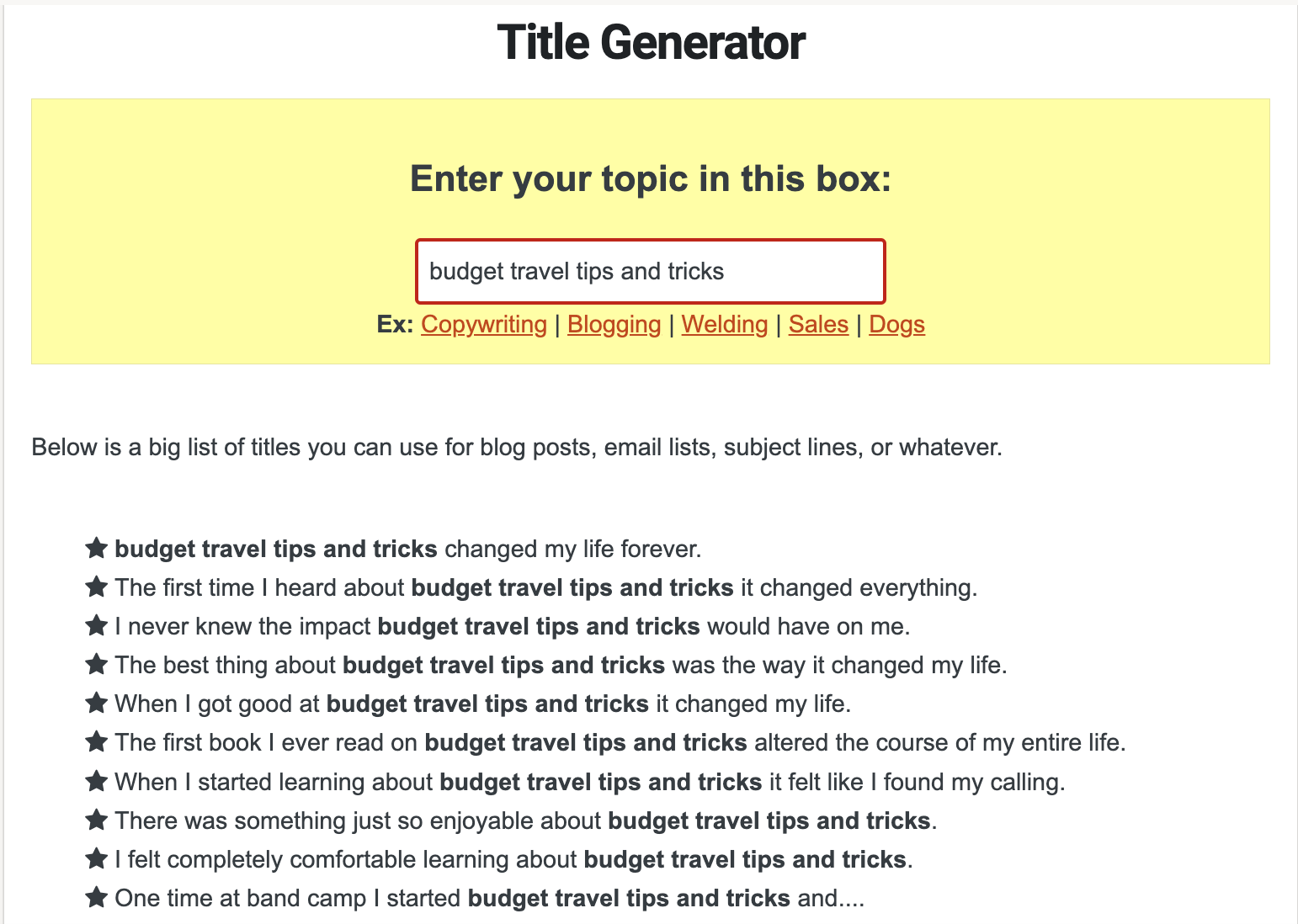
The Copywriting Course’s Title Generator tool provides more than 100 headline suggestions for a variety of content types.
All you need to do is enter your topic into the tool, and you instantly get a long list of potential titles based on proven copywriting formulas. They’re designed to increase clicks and conversions for you.
The major drawback is that the list itself doesn’t change, so you’re getting the same ideas every time, just with a different keyword or topic switched in.
In that regard, the tool doesn’t have much personalization, so it is best as a creative inspiration tool rather than something that you’ll want to revisit over and over.
But if you do want to, it’s totally free forever with no restrictions.
13. Sharethrough: Headline Analyzer
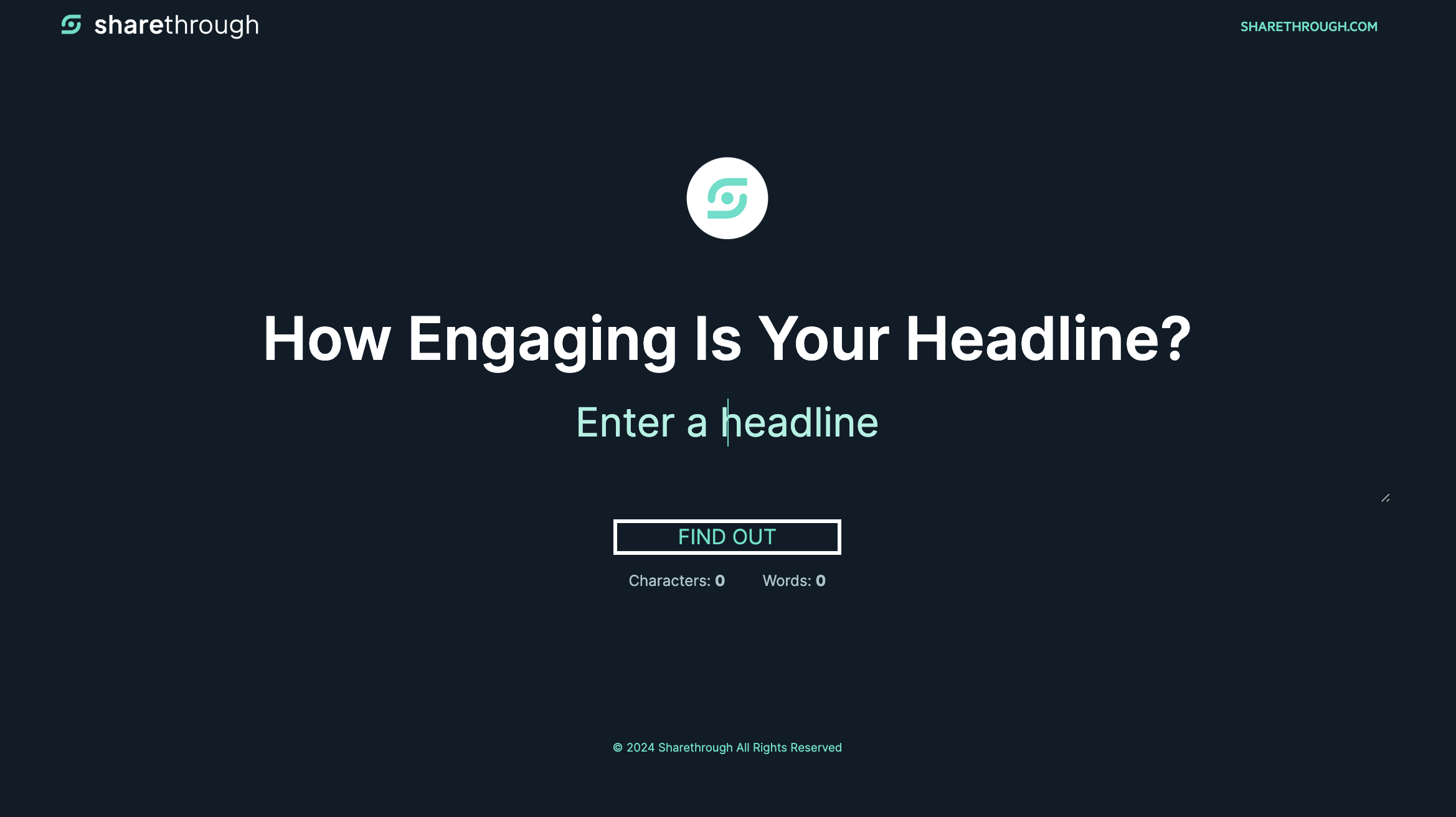
Already have a headline, but want to know how engaging it is? It’s time you paid a visit to Sharethrough’s Headline Analyzer .
Simply input your headline, and the tool will analyze its effectiveness, providing insights into metrics like quality, engagement potential, and overall impression.
It will give you an overall Headline Quality Score, which “is based on a multivariate linguistic algorithm built on the principles of Behavior Model theory and Sharethrough’s neuroscience and advertising research.”
The company’s algorithm considers 300+ unique variables, including natural language processing , to help you create effective headlines.
Sharethrough’s tool will tell you your headline’s strengths, as well as provide a list of suggestions for how to improve upon its weaknesses.
Here’s what it told me when I entered a headline from Tweak Your Biz’s generator:
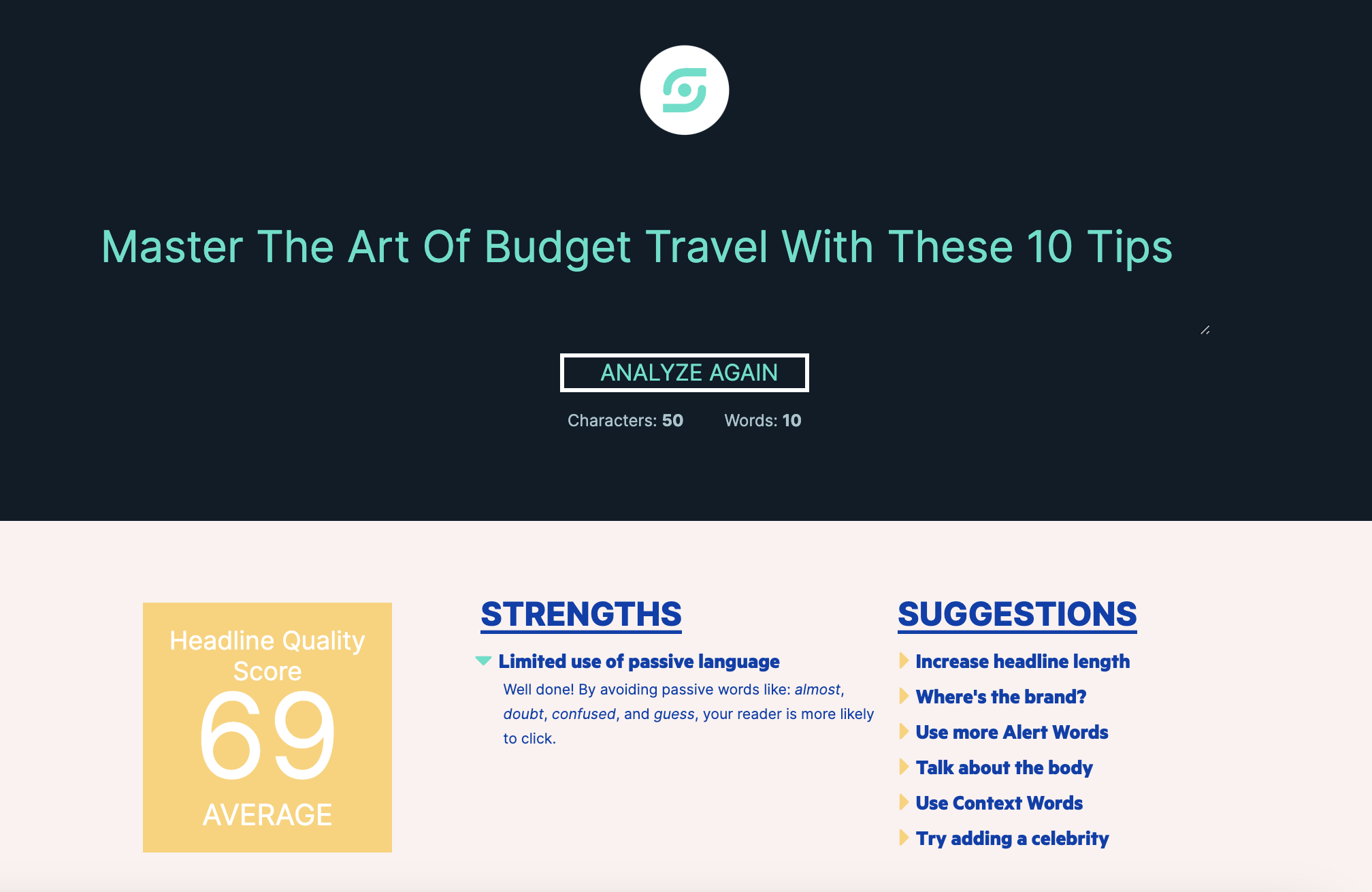
14. Title-Generator.com
Title-Generator.com is a free service for generating a multitude of headlines.
By simply inputting a primary keyword and hitting “Create Titles,” you’ll get a list of 700 – yes, you read that correctly – headline ideas.
They’re delivered in a simple text format. And while it’s impressive how many options the tool provides, the quality really runs the gamut. You will almost certainly need to do some manual trawling and editing to find what you’re looking for – but it’s a great starting point for content inspo.
The screenshot below shows examples of just some of the headlines it gave me based on my prompt:
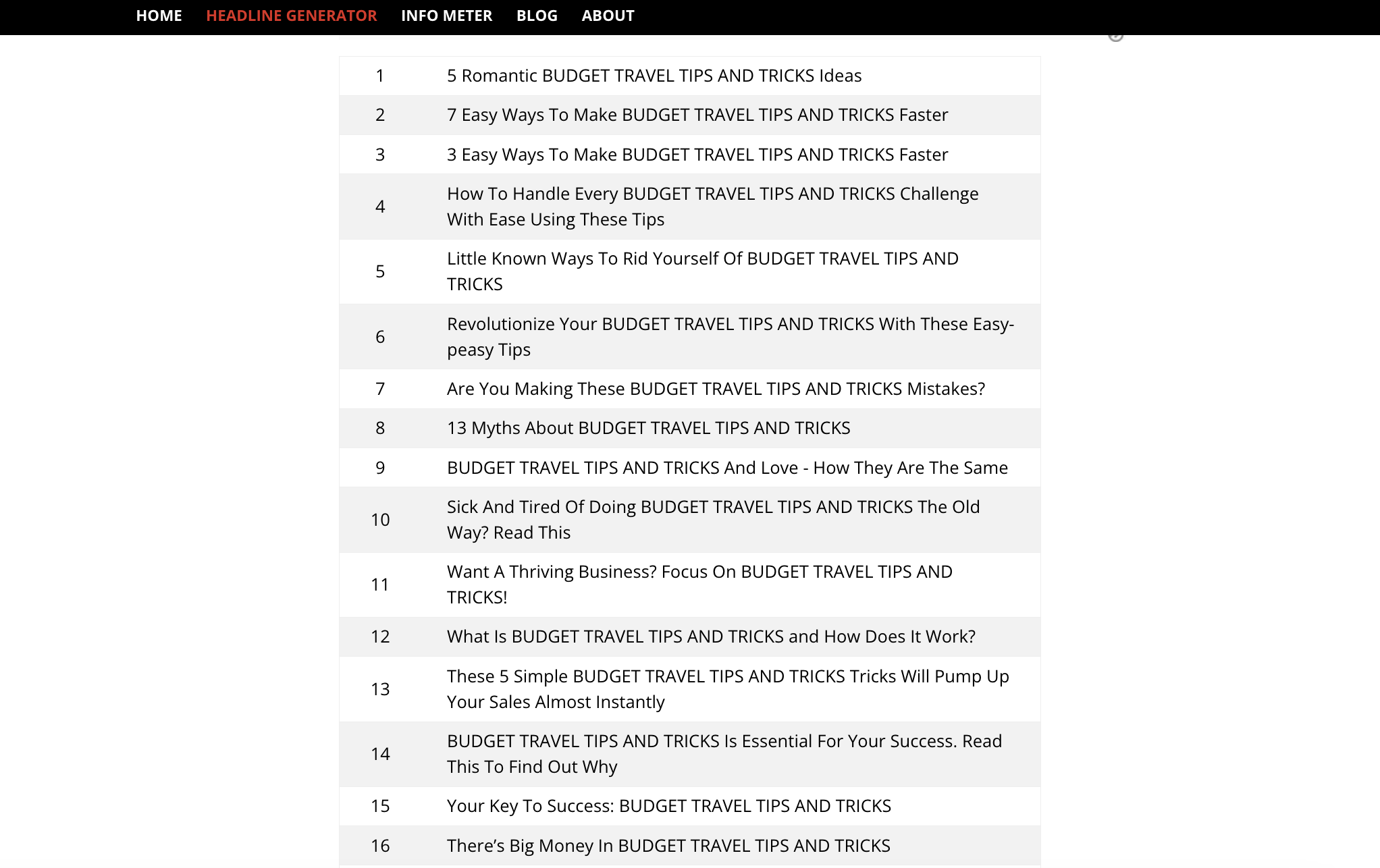
The tool is free and easy to use, but beware that the site contains a fair amount of ads, which can detract from the user experience.
15. AnswerThePublic: Search Listening Tool
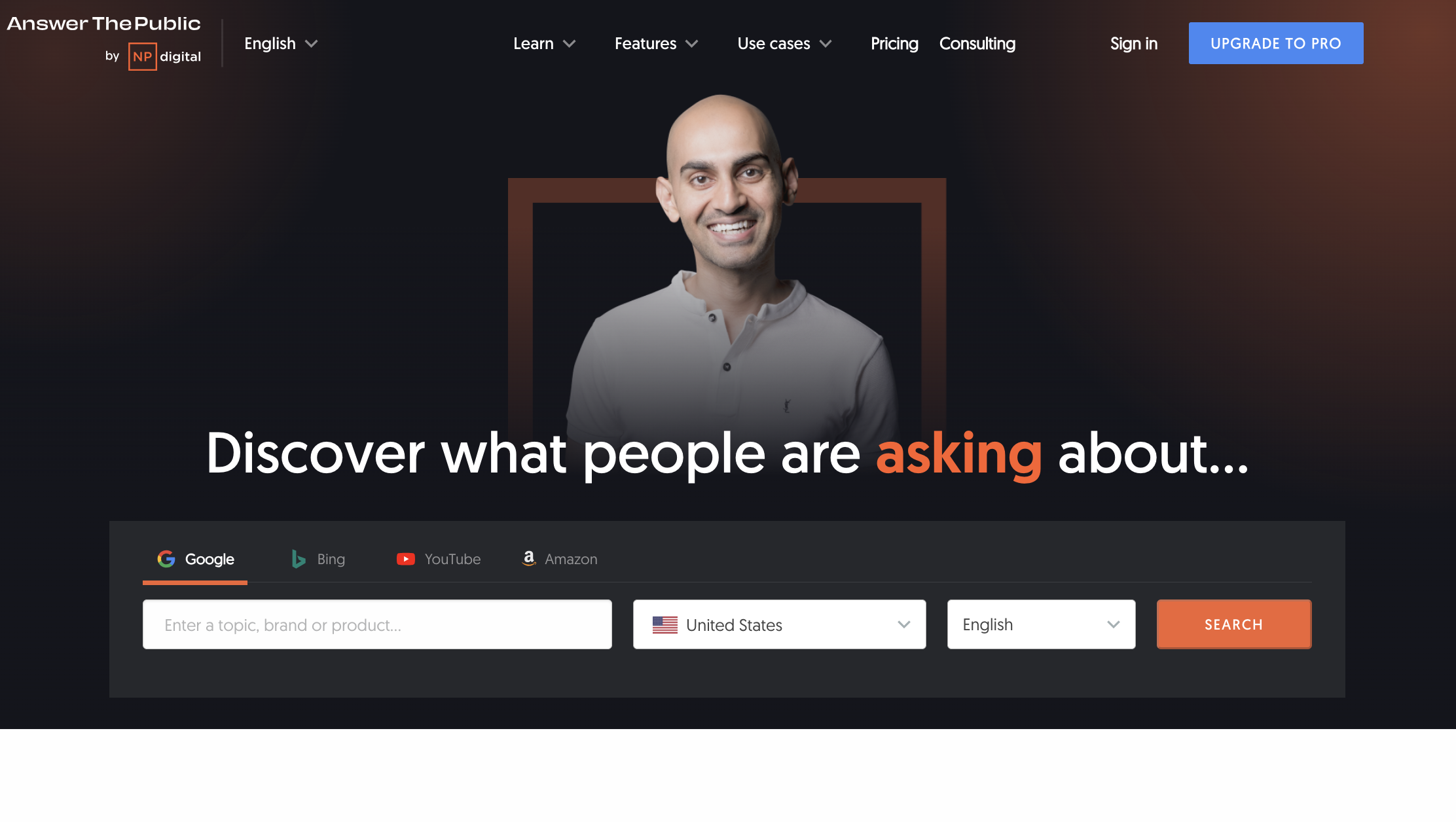
Another tool that’s slightly different from other options here, AnswerThePublic uses “search listening” to provide users with valuable insights for their content marketing strategies .
Unlike traditional headline generators, this tool delves into the queries and phrases people search for related to your keyword, offering a wealth of ideas that can then be transformed into compelling headlines.
To get started, enter your keyword, select your target country and language, and then hit the search button. You can choose to search Google, Bing, YouTube, or Amazon to find out what users are searching for.
Once you’ve hit search, AnswerThePublic will generate a bunch of data for you, including related questions, prepositions, comparisons, alphabetical searches, and related searches for your topic. You can view this in several ways, including wheels, lists, and tables, and results are color-coded based on performance.
Beyond this, the tool also provides the search volume and cost per click (CPC) for the topic you’ve inputted.
Here’s a small snapshot of what I saw for “budget travel”:
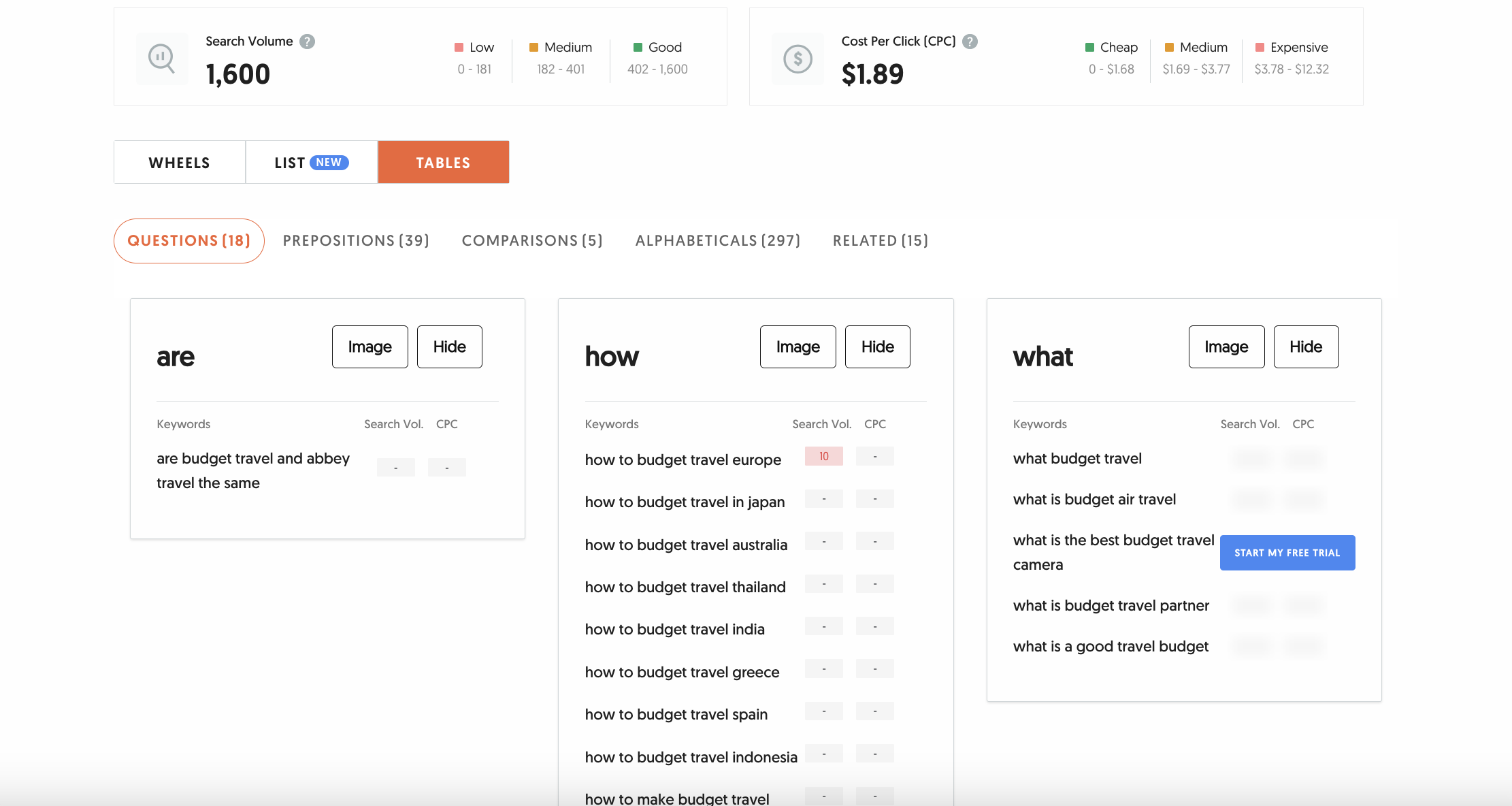
It’s a powerful tool for discerning user intent and finding content gaps in the market, but it may be more helpful for general concepts rather than polished headlines or titles specifically. That said, I would recommend it as a tool to pressure test your ideas.
You get one free search with a public version, and then you need to register for an account for three free searches per day. To get more insights and searches, you’ll need to upgrade to a paid plan.
16. Ahrefs: Free AI Blog Title Generator
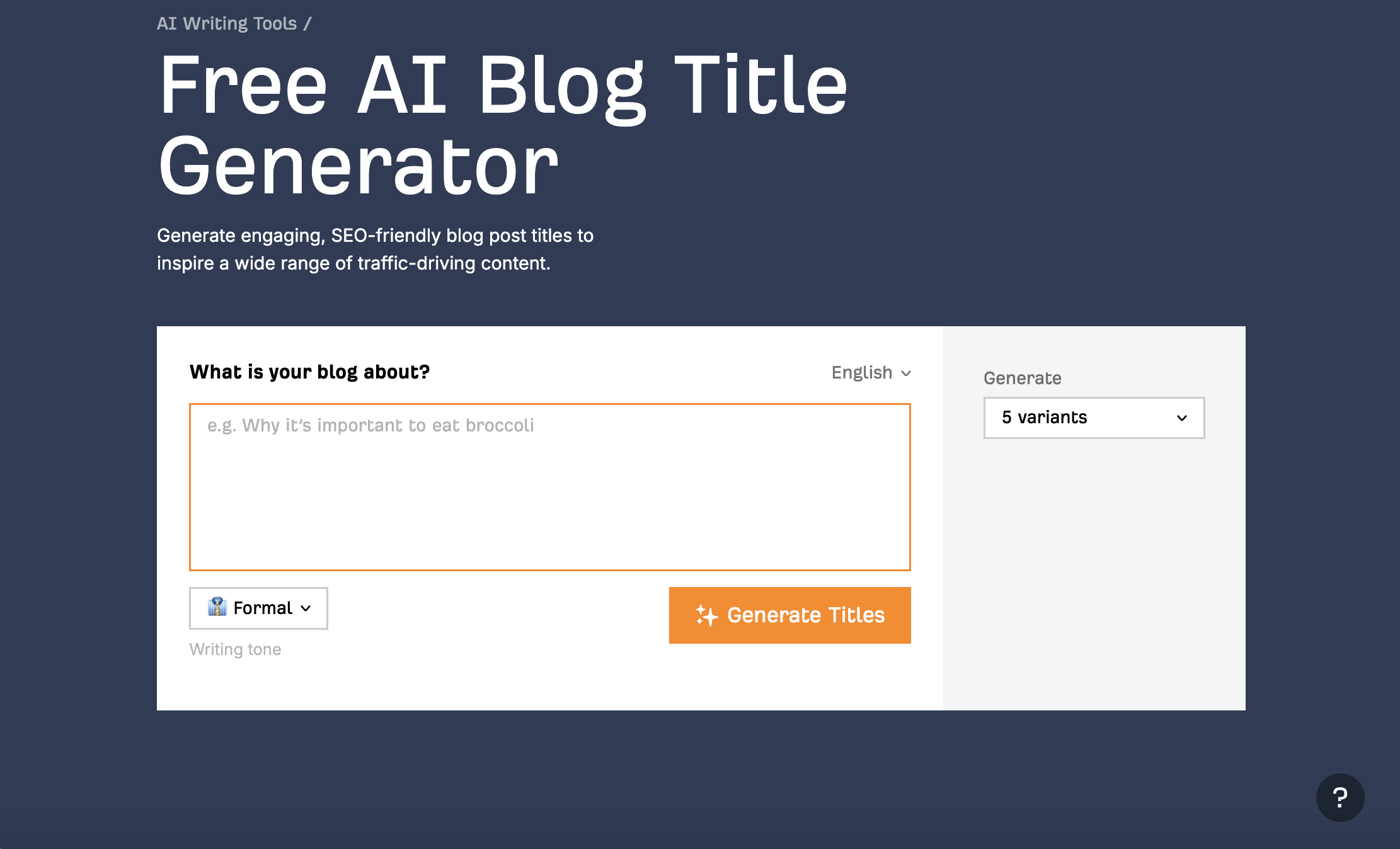
If you’re looking for SEO-friendly headline ideas, consider trying out Ahref’s Free AI Blog Title Generator.
According to Ahrefs, the tool “uses a language model that learns patterns, grammar, and vocabulary from large amounts of text data – then uses that knowledge to generate human-like text based on a given prompt or input.”
Start by entering what your article is about, then choose a writing tone from a list of many, including formal, friendly, casual, professional, persuasive, bold, academic, empathetic, and many more.
Then, click “Generate Titles” to get a list of up to 10 headline ideas. Below is a screenshot of my results when I entered “budget travel tips and tricks” and selected Persuasive for the tone.
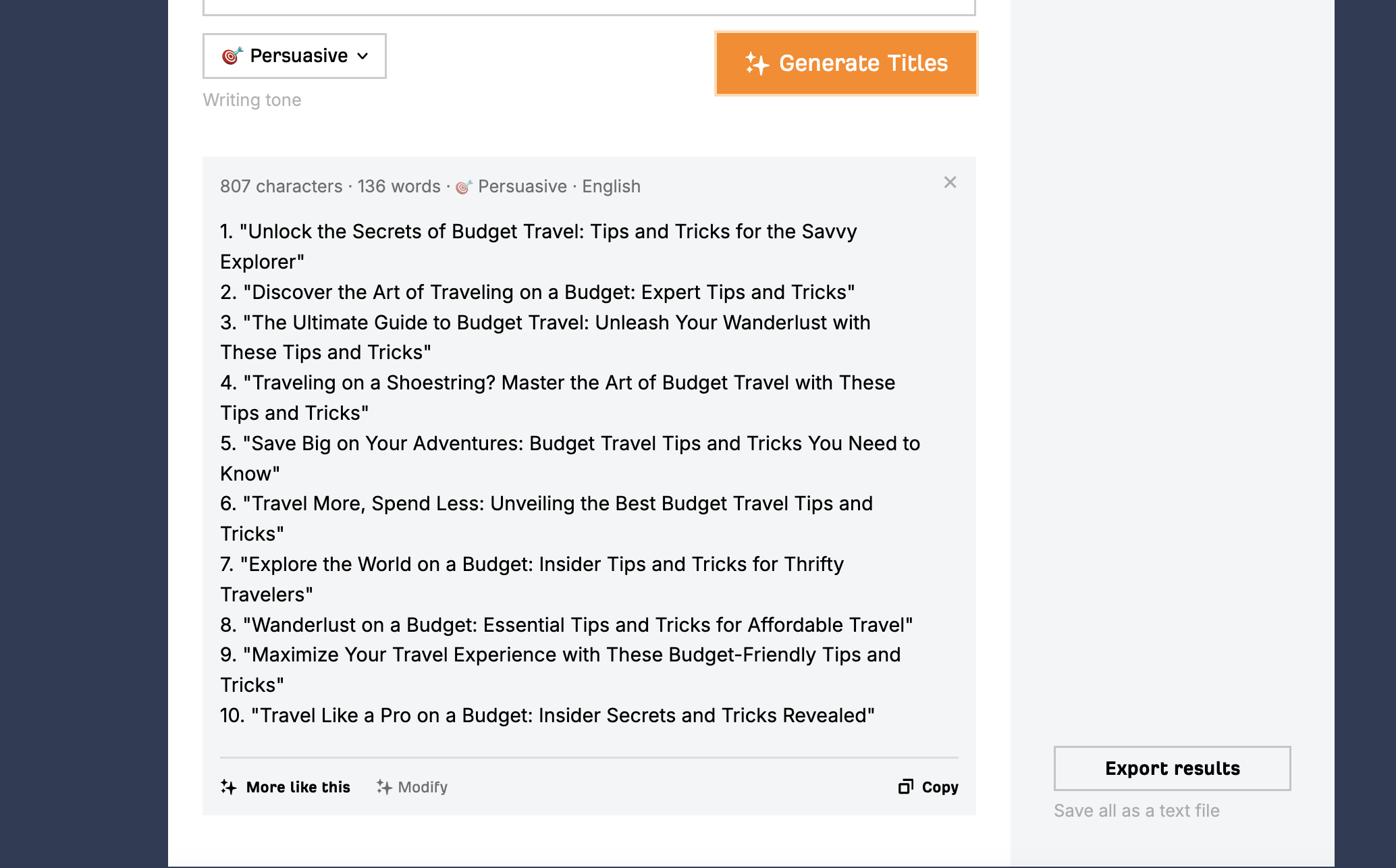
I found this tool’s suggestions to be among some of the strongest I received from these tools, and would suggest trying the tool out if you’re looking for headline ideas.
If you want to save the ideas it generates, you can export the results in a text file with the click of a button. You can also have the tool serve you additional ideas – free of charge.
Leverage These Tools To Supercharge Your Headlines
Given the sheer amount of content that’s produced online every single day, effective headlines are more crucial than ever before.
And thanks to free title generator tools like those in this article, crafting powerful headlines is only getting easier.
While their output isn’t always perfect, they offer a foundation upon which you can build more nuanced and targeted content strategies.
By combining the capabilities of headline generators with your own strategic SEO and audience insights and analysis, as well as your content marketing expertise, you can ensure that your content is seen by – and resonates with – your target audience.
More resources:
- 12 Surprising Examples Of Clickbait Headlines That Work
- How To Write A Headline: 10 Tips For Getting It Right
- Content Marketing: The Ultimate Beginner’s Guide
Featured Image: Cast Of Thousands/Shutterstock
Writer, digital marketer, and content strategist. Annabelle has 8+ years of experience in social marketing, copywriting, and storytelling for best-in-class ...
Subscribe To Our Newsletter.
Conquer your day with daily search marketing news.

IMAGES
VIDEO
COMMENTS
Here are other rules for how to create a good title: Title every section of writing: In the process of writing, create interesting subheadings to give your paragraphs an identity. Also, they make your text look ordered and clear. The title must bear the theme of the text: choose a title that summarizes the essay. Capitalize all words with certain exceptions: Capitalize the first letter of ...
In an academic essay, you can use highly technical terms in your title, but generally avoid terms that the average well-read person in your discipline might not know. In any writing that has a broad audience, titles need to avoid language that is too sophisticated; a news article, for example, should be easily understood by all.
Crafting a good title requires a blend of creativity, precision, and strategic thinking. To create an effective title, consider the following tips: Brainstorm Ideas: Begin by brainstorming keywords, phrases, and concepts related to your essay topic. Explore different angles and perspectives that encapsulate the essence of your argument or analysis.
8. Write a title beginning with an -ing verb (like "Creating a Good Title"). 9. Write a title beginning with On (like "On the Titles of Essays"). 10. Write a title that is a lie about the essay. (You probably won't use this one, but it might stimulate your thinking.) 11. Write a one-word title—the most obvious one possible. 12.
If the source is independent, italicize the title. Write the titles of books, films, websites, and magazines in italics. If the paper belongs to a larger piece of work, add the quotation marks. Writers use them for articles, websites, essays, and songs.
MLA format for academic papers and essays Apply MLA format to your title page, header, and Works Cited page with our 3-minute video, template, and examples. 1619. Creating an MLA header Start with a header containing your name, instructor's name, course, and date, followed by the paper's title. 483.
Understanding the Structure of a Title. Download Article. 1. Craft a hook. Most titles have the same basic structure, especially if the title is for an academic essay. The hook is the creative element that draws the reader in. It's a catchy phrase that lets the reader know what the essay is going to focus on. [1]
When you write an essay for a course you are taking, you are being asked not only to create a product (the essay) but, more importantly, to go through a process of thinking more deeply about a question or problem related to the course. By writing about a source or collection of sources, you will have the chance to wrestle with some of the
3. Write a title that is a question beginning with What, Who, When, or Where. 4. Write a title that is a question beginning with How or Why. 5. Write a title that is a question beginning with Is/Are, Do/Does, or Will. 6. Pick out of the essay some concrete image—something the reader can hear, see, taste, smell, or feel—to use as a title. 7.
Whether composing the essay's title and subtitles or citing other works, your titling should remain consistent. Essays inspire and inform the reader, and effective titles reflect the mood and purpose. In this article, we discuss how to format titles within essays, along with tips you can use to craft compelling essay titles.
7 10 Tips to Create an Exceptional Title. 7.1 Questions make Catchy. 7.2 Describe the Paper in 5 Words. 7.3 Use One Direct Word. 7.4 Extract a Sentence from the Paper. 7.5 Take advantage of Pop-Culture. 7.6 Put "On" at the beginning. 7.7 Start with a Verb in "-ing". 7.8 Give a Mental Visualization of Your Topic.
A title is the first thing that your readers will interact with. So, it should be something interesting and worth paying attention to. Coming up with an interesting title while writing an essay can be the most difficult and sometimes frustrating task. The best essay titles are those that are both creative and informative.
The most straightforward way of creating an essay title is summarizing. Sum up the whole paper in one sentence, focus on the central idea, cut the details, and use it as the title. Receive a plagiarism-free paper. tailored to your instructions. Cut 15% off your first order!
The steps described below will afford you the ability to craft creative titles for essays like a professional. Do read on to discover more: 1. Write your essay as the first step but the title as the last: The first step is to write it in the first place and for this, you may consider using an essay writing service.
The most common and basic technique is to get a title from the summary of your essay. A writer can summarize the entire essay or the central idea and thesis statement in three words and write a title. This can be a title by putting it in a headline, inserting a colon, and stating the purpose of your essay. 7.
Follow the guidelines described next to format each element of the student title page. Place the title three to four lines down from the top of the title page. Center it and type it in bold font. Capitalize major words of the title. Place the main title and any subtitle on separate double-spaced lines if desired.
Try to create a title that is both short and sweet. 5. Make a pun or use a famous saying. One way you can lead into your essay is to play with your words. For instance, make a pun. Another way is to use a famous quote, poem, or song to lead into your title.
The student version of the APA title page should include the following information (double spaced and centered): Paper title. Author name. Department and university name. Course number and name. Instructor name. Due date of the assignment. The professional title page also includes an author note (flushed left), but not a course name, instructor ...
Keep it simple. Don't use fancy or complicated words that might confuse your readers, instead go for straight-to-the-point words and avoid adding any unnecessary details in the title of your essay. Pick out important and useful keywords from your essay to frame a great title. 6. Look for creative quotes.
Titles that appear within an essay require special formatting in addition to title case. If the title is for an article—content that is part of a greater whole—then the title should have quotation marks around it. If the title is for a book, journal, newspaper, or some other whole work, then the title is italicized. ...
IMDb is the world's most popular and authoritative source for movie, TV and celebrity content. Find ratings and reviews for the newest movie and TV shows. Get personalized recommendations, and learn where to watch across hundreds of streaming providers.
While Friedrich Nietzsche popularised the notion of an "eternal return" — in which one's life would occur again, forever, exactly as it did before — the concept was itself a repetition. Claire Hall explores various shades of this idea in ancient philosophy, from Pythagorean metempsychosis to Stoic predictions about a cosmological reset.
The basic structure of an essay always consists of an introduction, a body, and a conclusion. But for many students, the most difficult part of structuring an essay is deciding how to organize information within the body. This article provides useful templates and tips to help you outline your essay, make decisions about your structure, and ...
Title: Understanding Memory Decline in Older Age: A Critical Analysis of Decay Theory and Interference Theory Memory decline is a common concern associated with aging, impacting cognitive function and daily life activities for older adults. In the realm of memory research, two prominent theoretical standpoints, Decay Theory and Interference Theory, offer contrasting explanations for the ...
14. Title-Generator.com. Title-Generator.com is a free service for generating a multitude of headlines. By simply inputting a primary keyword and hitting "Create Titles," you'll get a list ...